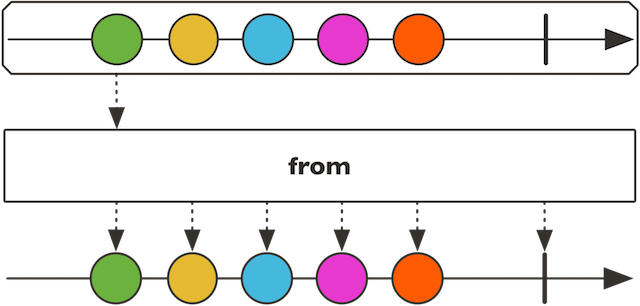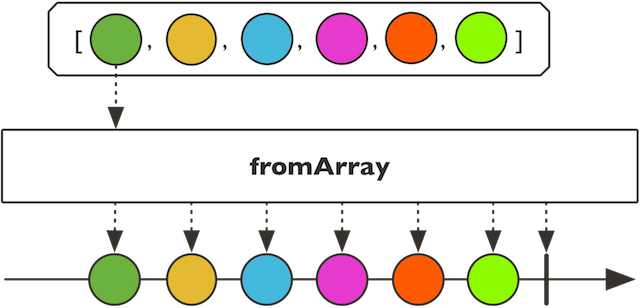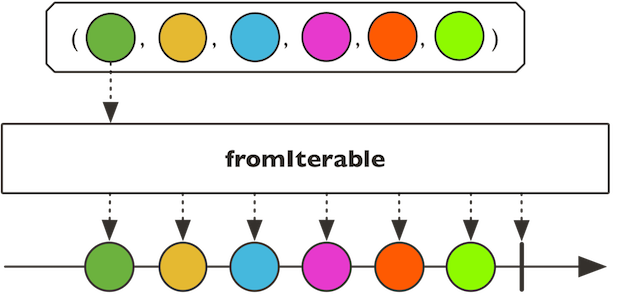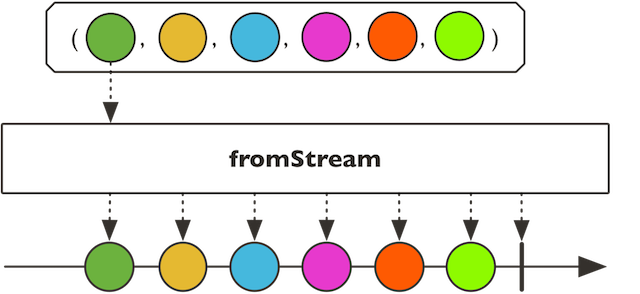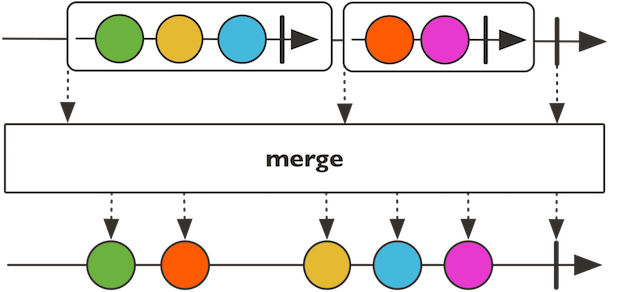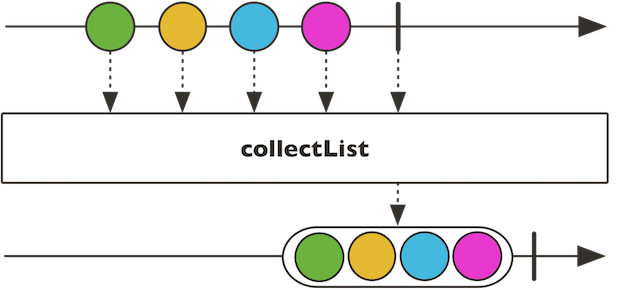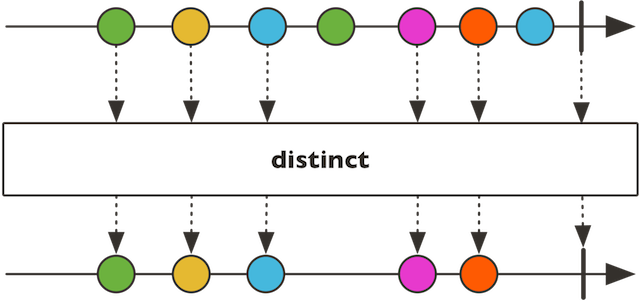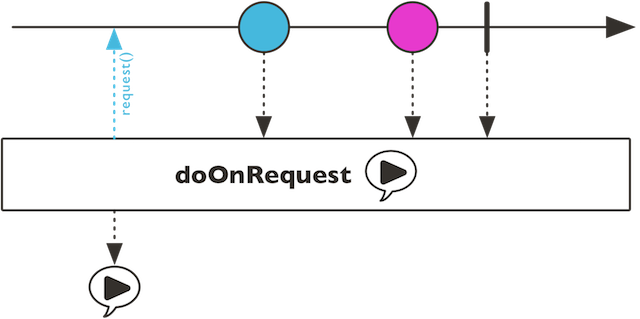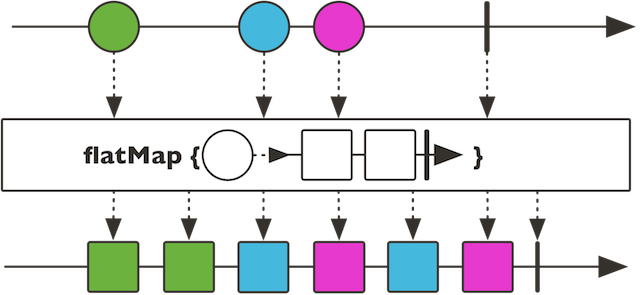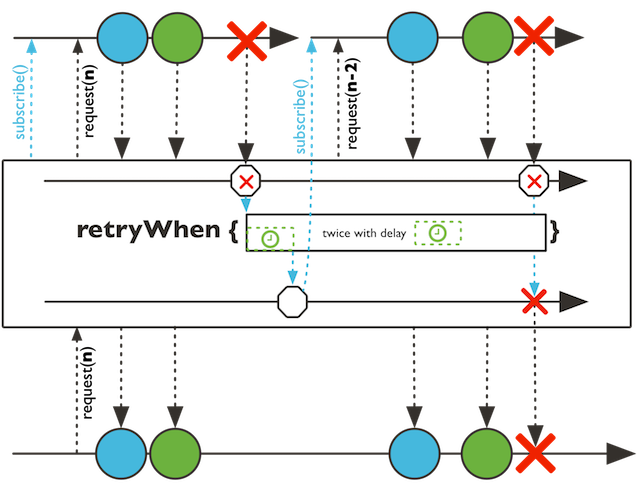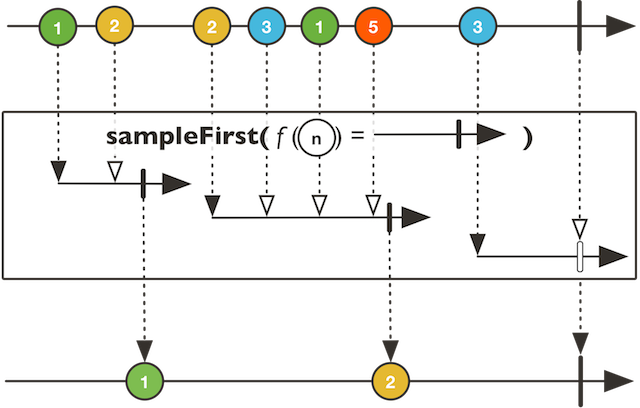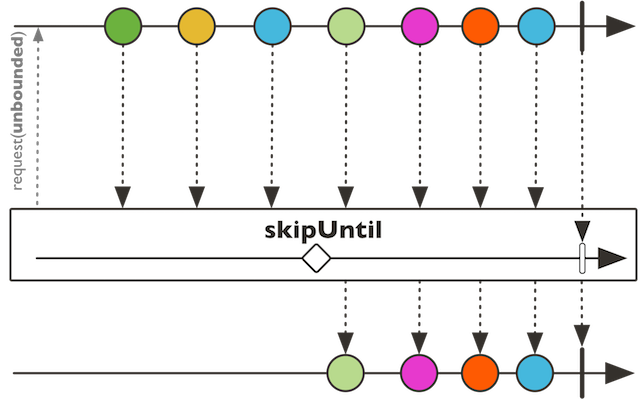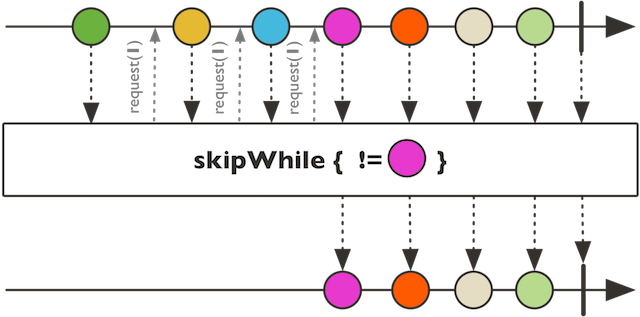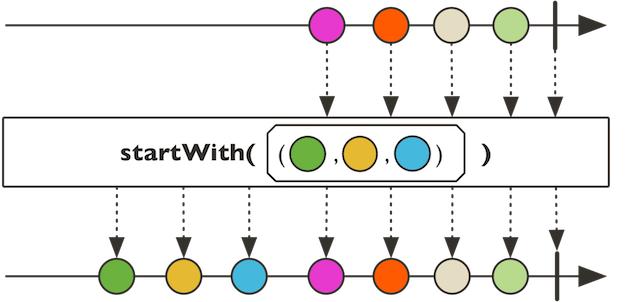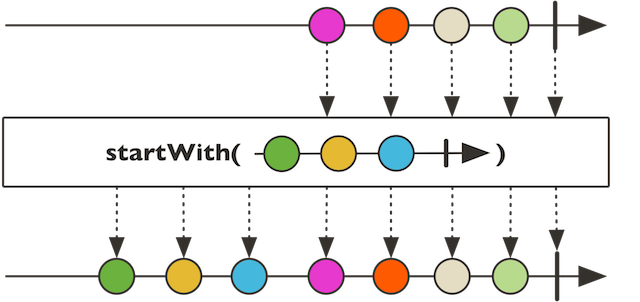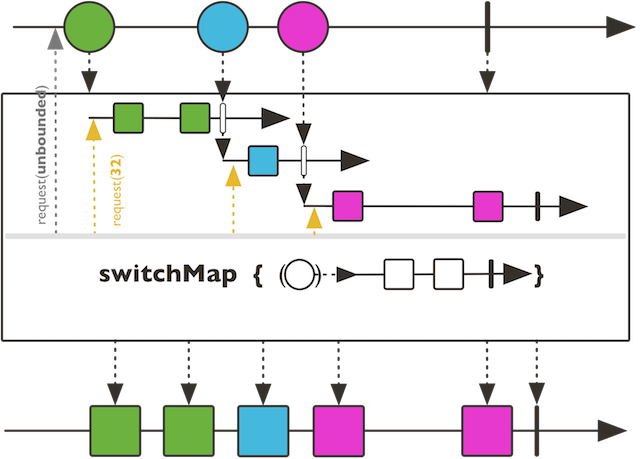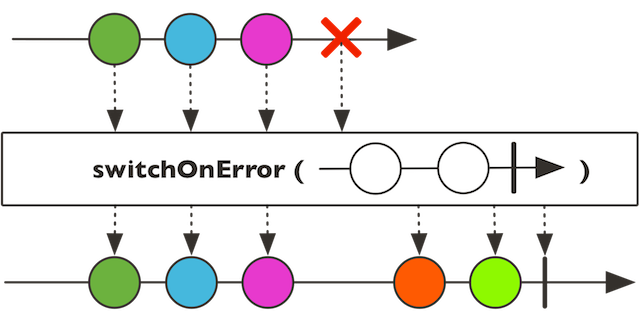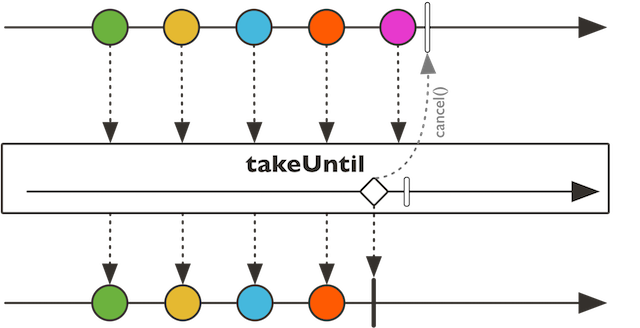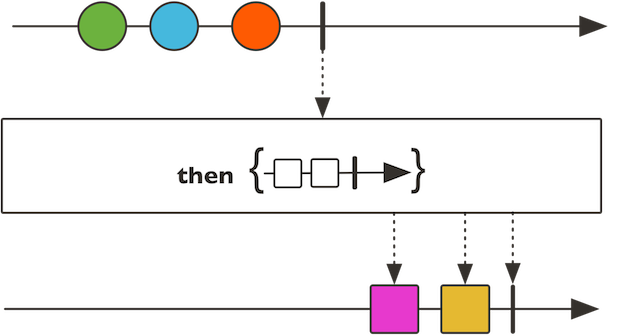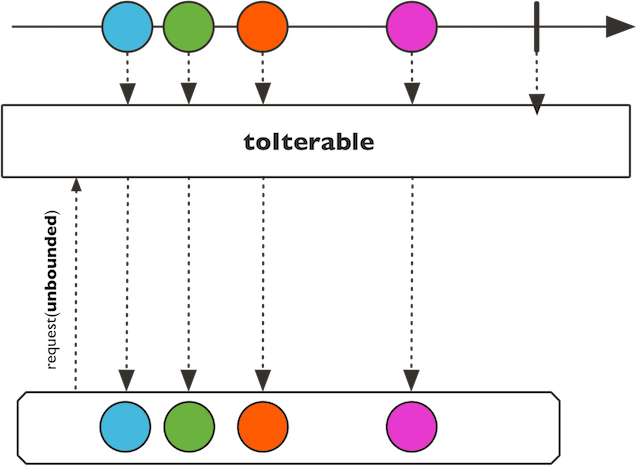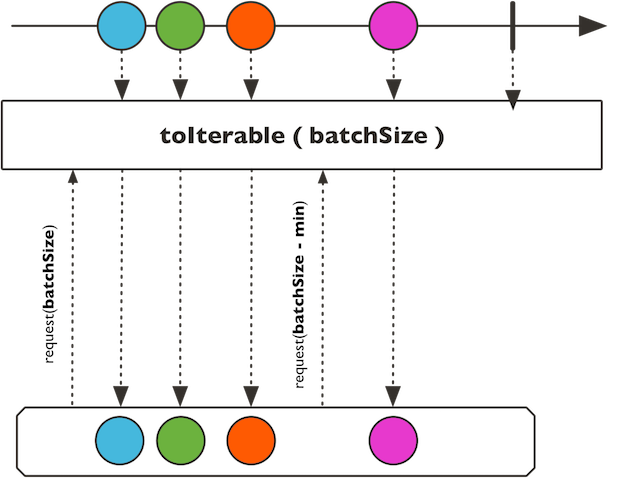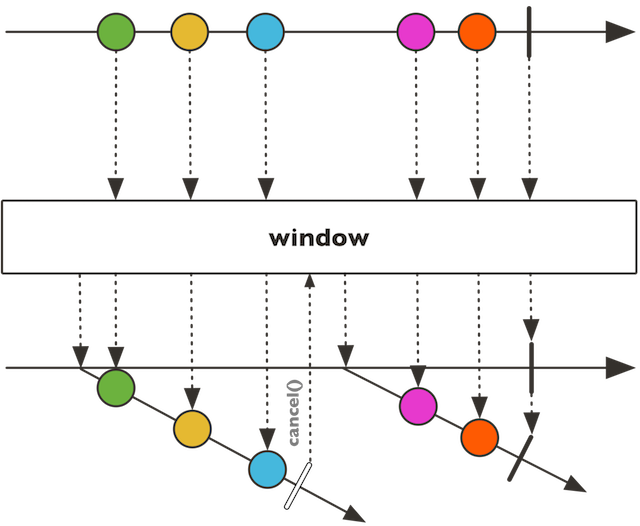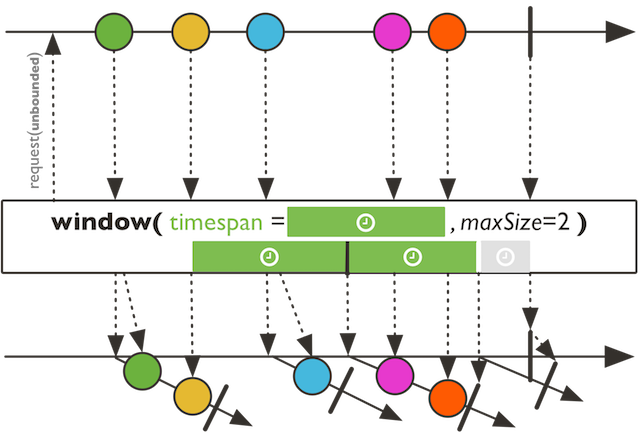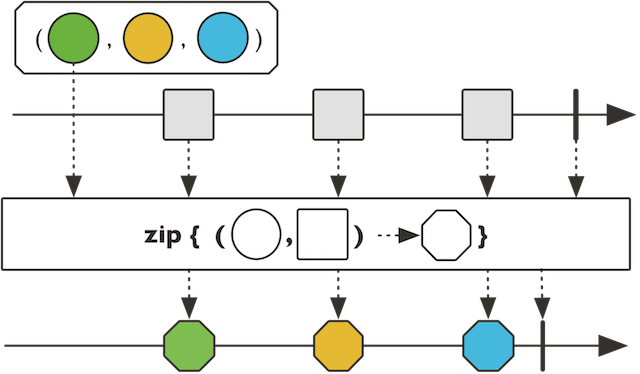- java.lang.Object
-
- reactor.core.publisher.Flux<T>
-
- Type Parameters:
T- the element type of this Reactive StreamsPublisher
- All Implemented Interfaces:
- Publisher<T>
- Direct Known Subclasses:
- ConnectableFlux, FluxProcessor, FluxSource, GroupedFlux
public abstract class Flux<T> extends Object implements Publisher<T>
A Reactive StreamsPublisherwith rx operators that emits 0 to N elements, and then completes (successfully or with an error).
It is intended to be used in implementations and return types. Input parameters should keep using raw
Publisheras much as possible.If it is known that the underlying
Publisherwill emit 0 or 1 element,Monoshould be used instead.Note that using state in the
java.util.function/ lambdas used within Flux operators should be avoided, as these may be shared between severalSubscribers.- Author:
- Sebastien Deleuze, Stephane Maldini, David Karnok
- See Also:
Mono
-
-
Constructor Summary
Constructors Constructor and Description Flux()
-
Method Summary
All Methods Static Methods Instance Methods Concrete Methods Deprecated Methods Modifier and Type Method and Description Mono<Boolean>all(Predicate<? super T> predicate)Emit a single boolean true if all values of this sequence match thePredicate.Mono<Boolean>any(Predicate<? super T> predicate)Emit a single boolean true if any of the values of thisFluxsequence match the predicate.<P> Pas(Function<? super Flux<T>,P> transformer)Immediately apply the given transformation to thisFluxin order to generate a target type.Flux<T>awaitOnSubscribe()Intercepts the onSubscribe call and makes sure calls to Subscription methods only happen after the child Subscriber has returned from its onSubscribe method.TblockFirst()Blocks until the upstream signals its first value or completes.TblockFirst(Duration d)Blocks until the upstream signals its first value or completes.TblockFirstMillis(long timeout)Deprecated.use theDurationbased variants instead, will be removed in 3.1.0TblockLast()Blocks until the upstream completes and return the last emitted value.TblockLast(Duration d)Blocks until the upstream completes and return the last emitted value.TblockLastMillis(long timeout)Deprecated.use theDurationbased variants instead, will be removed in 3.1.0Flux<List<T>>buffer()Flux<List<T>>buffer(Duration timespan)Flux<List<T>>buffer(Duration timespan, Duration timeshift)Collect incoming values into multipleListdelimited by the giventimeshiftperiod.Flux<List<T>>buffer(Duration timespan, Duration timeshift, Scheduler timer)Collect incoming values into multipleListdelimited by the giventimeshiftperiod.Flux<List<T>>buffer(Duration timespan, Scheduler timer)Flux<List<T>>buffer(int maxSize)Flux<List<T>>buffer(int maxSize, Duration timespan)Deprecated.usebufferTimeout(int, Duration)instead, will be removed in 3.1.0<C extends Collection<? super T>>
Flux<C>buffer(int maxSize, Duration timespan, Supplier<C> bufferSupplier)Deprecated.usebufferTimeout(int, Duration, Supplier)instead, will be removed in 3.1.0Flux<List<T>>buffer(int maxSize, int skip)<C extends Collection<? super T>>
Flux<C>buffer(int maxSize, int skip, Supplier<C> bufferSupplier)Collect incoming values into multipleCollectionthat will be pushed into the returnedFluxwhen the given max size is reached or onComplete is received.<C extends Collection<? super T>>
Flux<C>buffer(int maxSize, Supplier<C> bufferSupplier)Collect incoming values into multipleCollectionbuckets that will be pushed into the returnedFluxwhen the given max size is reached or onComplete is received.Flux<List<T>>buffer(Publisher<?> other)<C extends Collection<? super T>>
Flux<C>buffer(Publisher<?> other, Supplier<C> bufferSupplier)Collect incoming values into multipleCollectiondelimited by the givenPublishersignals.<U,V> Flux<List<T>>buffer(Publisher<U> bucketOpening, Function<? super U,? extends Publisher<V>> closeSelector)Deprecated.will be removed in 3.1.0. UsebufferWhen(Publisher, Function)instead.<U,V,C extends Collection<? super T>>
Flux<C>buffer(Publisher<U> bucketOpening, Function<? super U,? extends Publisher<V>> closeSelector, Supplier<C> bufferSupplier)Deprecated.will be removed in 3.1.0. UsebufferWhen(Publisher, Function, Supplier)instead.Flux<List<T>>bufferMillis(int maxSize, long timespan)Deprecated.usebufferTimeout(int, Duration)instead, will be removed in 3.1.0Flux<List<T>>bufferMillis(int maxSize, long timespan, TimedScheduler timer)Deprecated.usebufferTimeout(int, Duration, Scheduler)instead, will be removed in 3.1.0<C extends Collection<? super T>>
Flux<C>bufferMillis(int maxSize, long timespan, TimedScheduler timer, Supplier<C> bufferSupplier)Deprecated.usebufferTimeout(int, Duration, Scheduler, Supplier)instead, will be removed in 3.1.0Flux<List<T>>bufferMillis(long timespan)Deprecated.use theDurationbased variants instead, will be removed in 3.1.0Flux<List<T>>bufferMillis(long timespan, long timeshift)Deprecated.use theDurationbased variants instead, will be removed in 3.1.0Flux<List<T>>bufferMillis(long timespan, long timeshift, TimedScheduler timer)Deprecated.use theDurationbased variants instead, will be removed in 3.1.0Flux<List<T>>bufferMillis(long timespan, TimedScheduler timer)Deprecated.use theDurationbased variants instead, will be removed in 3.1.0Flux<List<T>>bufferTimeout(int maxSize, Duration timespan)Flux<List<T>>bufferTimeout(int maxSize, Duration timespan, Scheduler timer)<C extends Collection<? super T>>
Flux<C>bufferTimeout(int maxSize, Duration timespan, Scheduler timer, Supplier<C> bufferSupplier)Collect incoming values into aCollectionthat will be pushed into the returnedFluxevery timespan OR maxSize items<C extends Collection<? super T>>
Flux<C>bufferTimeout(int maxSize, Duration timespan, Supplier<C> bufferSupplier)Collect incoming values into aCollectionthat will be pushed into the returnedFluxevery timespan OR maxSize items.Flux<List<T>>bufferTimeoutMillis(int maxSize, long timespan)Deprecated.use theDurationbased variants instead, will be removed in 3.1.0Flux<List<T>>bufferTimeoutMillis(int maxSize, long timespan, TimedScheduler timer)Deprecated.use theDurationbased variants instead, will be removed in 3.1.0<C extends Collection<? super T>>
Flux<C>bufferTimeoutMillis(int maxSize, long timespan, TimedScheduler timer, Supplier<C> bufferSupplier)Deprecated.use theDurationbased variants instead, will be removed in 3.1.0Flux<List<T>>bufferUntil(Predicate<? super T> predicate)Flux<List<T>>bufferUntil(Predicate<? super T> predicate, boolean cutBefore)<U,V> Flux<List<T>>bufferWhen(Publisher<U> bucketOpening, Function<? super U,? extends Publisher<V>> closeSelector)<U,V,C extends Collection<? super T>>
Flux<C>bufferWhen(Publisher<U> bucketOpening, Function<? super U,? extends Publisher<V>> closeSelector, Supplier<C> bufferSupplier)Collect incoming values into multiple user-definedCollectionbuffers started each time an opening companionPublisheremits.Flux<List<T>>bufferWhile(Predicate<? super T> predicate)Flux<T>cache()Turn thisFluxinto a hot source and cache last emitted signals for furtherSubscriber.Flux<T>cache(Duration ttl)Turn thisFluxinto a hot source and cache last emitted signals for furtherSubscriber.Flux<T>cache(int history)Turn thisFluxinto a hot source and cache last emitted signals for furtherSubscriber.Flux<T>cache(int history, Duration ttl)Turn thisFluxinto a hot source and cache last emitted signals for furtherSubscriber.Flux<T>cancelOn(Scheduler scheduler)<E> Flux<E>cast(Class<E> clazz)Cast the currentFluxproduced type into a target produced type.Flux<T>checkpoint()Activate assembly tracing for this particularFlux, in case of an error upstream of the checkpoint.Flux<T>checkpoint(String description)Activate assembly tracing for this particularFluxand give it a description that will be reflected in the assembly traceback in case of an error upstream of the checkpoint.<R,A> Mono<R>collect(Collector<? super T,A,? extends R> collector)Collect theFluxsequence with the given collector and supplied container on subscribe.<E> Mono<E>collect(Supplier<E> containerSupplier, BiConsumer<E,? super T> collector)Collect theFluxsequence with the given collector and supplied container on subscribe.Mono<List<T>>collectList()<K> Mono<Map<K,T>>collectMap(Function<? super T,? extends K> keyExtractor)<K,V> Mono<Map<K,V>>collectMap(Function<? super T,? extends K> keyExtractor, Function<? super T,? extends V> valueExtractor)Convert all thisFluxsequence into a hashed map where the key is extracted by the given function and the value will be the most recent extracted item for this key.<K,V> Mono<Map<K,V>>collectMap(Function<? super T,? extends K> keyExtractor, Function<? super T,? extends V> valueExtractor, Supplier<Map<K,V>> mapSupplier)Convert all thisFluxsequence into a supplied map where the key is extracted by the given function and the value will be the most recent extracted item for this key.<K> Mono<Map<K,Collection<T>>>collectMultimap(Function<? super T,? extends K> keyExtractor)Convert thisFluxsequence into a hashed map where the key is extracted by the given function and the value will be all the emitted item for this key.<K,V> Mono<Map<K,Collection<V>>>collectMultimap(Function<? super T,? extends K> keyExtractor, Function<? super T,? extends V> valueExtractor)Convert thisFluxsequence into a hashed map where the key is extracted by the given function and the value will be all the extracted items for this key.<K,V> Mono<Map<K,Collection<V>>>collectMultimap(Function<? super T,? extends K> keyExtractor, Function<? super T,? extends V> valueExtractor, Supplier<Map<K,Collection<V>>> mapSupplier)Convert thisFluxsequence into a supplied map where the key is extracted by the given function and the value will be all the extracted items for this key.Mono<List<T>>collectSortedList()Mono<List<T>>collectSortedList(Comparator<? super T> comparator)static <T,V> Flux<V>combineLatest(Function<Object[],V> combinator, int prefetch, Publisher<? extends T>... sources)Build aFluxwhose data are generated by the combination of the most recent published values from all publishers.static <T,V> Flux<V>combineLatest(Function<Object[],V> combinator, Publisher<? extends T>... sources)Build aFluxwhose data are generated by the combination of the most recent published values from all publishers.static <T,V> Flux<V>combineLatest(Iterable<? extends Publisher<? extends T>> sources, Function<Object[],V> combinator)Build aFluxwhose data are generated by the combination of the most recent published values from all publishers.static <T,V> Flux<V>combineLatest(Iterable<? extends Publisher<? extends T>> sources, int prefetch, Function<Object[],V> combinator)Build aFluxwhose data are generated by the combination of the most recent published values from all publishers.static <T1,T2,V> Flux<V>combineLatest(Publisher<? extends T1> source1, Publisher<? extends T2> source2, BiFunction<? super T1,? super T2,? extends V> combinator)Build aFluxwhose data are generated by the combination of the most recent published values from all publishers.static <T1,T2,T3,V>
Flux<V>combineLatest(Publisher<? extends T1> source1, Publisher<? extends T2> source2, Publisher<? extends T3> source3, Function<Object[],V> combinator)Build aFluxwhose data are generated by the combination of the most recent published values from all publishers.static <T1,T2,T3,T4,V>
Flux<V>combineLatest(Publisher<? extends T1> source1, Publisher<? extends T2> source2, Publisher<? extends T3> source3, Publisher<? extends T4> source4, Function<Object[],V> combinator)Build aFluxwhose data are generated by the combination of the most recent published values from all publishers.static <T1,T2,T3,T4,T5,V>
Flux<V>combineLatest(Publisher<? extends T1> source1, Publisher<? extends T2> source2, Publisher<? extends T3> source3, Publisher<? extends T4> source4, Publisher<? extends T5> source5, Function<Object[],V> combinator)Build aFluxwhose data are generated by the combination of the most recent published values from all publishers.static <T1,T2,T3,T4,T5,T6,V>
Flux<V>combineLatest(Publisher<? extends T1> source1, Publisher<? extends T2> source2, Publisher<? extends T3> source3, Publisher<? extends T4> source4, Publisher<? extends T5> source5, Publisher<? extends T6> source6, Function<Object[],V> combinator)Build aFluxwhose data are generated by the combination of the most recent published values from all publishers.<V> Flux<V>compose(Function<? super Flux<T>,? extends Publisher<V>> transformer)static <T> Flux<T>concat(Iterable<? extends Publisher<? extends T>> sources)Concat all sources pulled from the suppliedIteratoronPublisher.subscribe(org.reactivestreams.Subscriber<? super T>)from the passedIterableuntilIterator.hasNext()returns false.static <T> Flux<T>concat(Publisher<? extends Publisher<? extends T>> sources)Concat all sources emitted as an onNext signal from a parentPublisher.static <T> Flux<T>concat(Publisher<? extends Publisher<? extends T>> sources, int prefetch)Concat all sources emitted as an onNext signal from a parentPublisher.static <T> Flux<T>concat(Publisher<? extends T>... sources)Concat all sources pulled from the givenPublisherarray.static <T> Flux<T>concatDelayError(Publisher<? extends Publisher<? extends T>> sources)Concat all sources emitted as an onNext signal from a parentPublisher.static <T> Flux<T>concatDelayError(Publisher<? extends Publisher<? extends T>> sources, boolean delayUntilEnd, int prefetch)Concat all sources emitted as an onNext signal from a parentPublisher.static <T> Flux<T>concatDelayError(Publisher<? extends Publisher<? extends T>> sources, int prefetch)Concat all sources emitted as an onNext signal from a parentPublisher.static <T> Flux<T>concatDelayError(Publisher<? extends T>... sources)Concat all sources pulled from the givenPublisherarray.<V> Flux<V>concatMap(Function<? super T,? extends Publisher<? extends V>> mapper)Bind dynamic sequences given this input sequence likeflatMap(Function), but preserve ordering and concatenate emissions instead of merging (no interleave).<V> Flux<V>concatMap(Function<? super T,? extends Publisher<? extends V>> mapper, int prefetch)Bind dynamic sequences given this input sequence likeflatMap(Function), but preserve ordering and concatenate emissions instead of merging (no interleave).<V> Flux<V>concatMapDelayError(Function<? super T,? extends Publisher<? extends V>> mapper, boolean delayUntilEnd, int prefetch)Bind dynamic sequences given this input sequence likeflatMap(Function), but preserve ordering and concatenate emissions instead of merging (no interleave).<V> Flux<V>concatMapDelayError(Function<? super T,? extends Publisher<? extends V>> mapper, int prefetch)Bind dynamic sequences given this input sequence likeflatMap(Function), but preserve ordering and concatenate emissions instead of merging (no interleave).<V> Flux<V>concatMapDelayError(Function<? super T,Publisher<? extends V>> mapper)Bind dynamic sequences given this input sequence likeflatMap(Function), but preserve ordering and concatenate emissions instead of merging (no interleave).<R> Flux<R>concatMapIterable(Function<? super T,? extends Iterable<? extends R>> mapper)<R> Flux<R>concatMapIterable(Function<? super T,? extends Iterable<? extends R>> mapper, int prefetch)Flux<T>concatWith(Publisher<? extends T> other)Mono<Long>count()Counts the number of values in thisFlux.static <T> Flux<T>create(Consumer<? super FluxSink<T>> emitter)Creates a Flux with multi-emission capabilities (synchronous or asynchronous) through the FluxSink API.static <T> Flux<T>create(Consumer<? super FluxSink<T>> emitter, FluxSink.OverflowStrategy backpressure)Creates a Flux with multi-emission capabilities (synchronous or asynchronous) through the FluxSink API.Flux<T>defaultIfEmpty(T defaultV)Provide a default unique value if this sequence is completed without any datastatic <T> Flux<T>defer(Supplier<? extends Publisher<T>> supplier)Supply aPublishereverytime subscribe is called on the returned flux.Flux<T>delay(Duration delay)Deprecated.will be replaced bydelayElements(Duration)in 3.1.0Flux<T>delayElements(Duration delay)Flux<T>delayElements(Duration delay, Scheduler timer)Flux<T>delayElementsMillis(long delay)Deprecated.use theDurationbased variants instead, will be removed in 3.1.0Flux<T>delayElementsMillis(long delay, TimedScheduler timer)Deprecated.use theDurationbased variants instead, will be removed in 3.1.0Flux<T>delayMillis(long delay)Deprecated.will be replaced bydelayElements(Duration)in 3.1.0Flux<T>delayMillis(long delay, TimedScheduler timer)Deprecated.will be replaced bydelayElements(Duration, Scheduler)in 3.1.0Flux<T>delaySubscription(Duration delay)Delay thesubscriptionto thisFluxsource until the given period elapses.Flux<T>delaySubscription(Duration delay, Scheduler timer)Delay thesubscriptionto thisFluxsource until the given period elapses.<U> Flux<T>delaySubscription(Publisher<U> subscriptionDelay)Delay the subscription to the main source until another Publisher signals a value or completes.Flux<T>delaySubscriptionMillis(long delay)Deprecated.use theDurationbased variants instead, will be removed in 3.1.0Flux<T>delaySubscriptionMillis(long delay, TimedScheduler timer)Deprecated.use theDurationbased variants instead, will be removed in 3.1.0<X> Flux<X>dematerialize()Flux<T>distinct()For eachSubscriber, tracks thisFluxvalues that have been seen and filters out duplicates.<V> Flux<T>distinct(Function<? super T,? extends V> keySelector)For eachSubscriber, tracks thisFluxvalues that have been seen and filters out duplicates given the extracted key.Flux<T>distinctUntilChanged()Filters out subsequent and repeated elements.<V> Flux<T>distinctUntilChanged(Function<? super T,? extends V> keySelector)Filters out subsequent and repeated elements provided a matching extracted key.Flux<T>doAfterTerminate(Runnable afterTerminate)Triggered after theFluxterminates, either by completing downstream successfully or with an error.Flux<T>doFinally(Consumer<SignalType> onFinally)Triggering aftertheFluxterminates for any reason, including cancellation.Flux<T>doOnCancel(Runnable onCancel)Triggered when theFluxis cancelled.Flux<T>doOnComplete(Runnable onComplete)Triggered when theFluxcompletes successfully.Flux<T>doOnEach(Consumer<? super Signal<T>> signalConsumer)Triggers side-effects when theFluxemits an item, fails with an error or completes successfully.<E extends Throwable>
Flux<T>doOnError(Class<E> exceptionType, Consumer<? super E> onError)Triggered when theFluxcompletes with an error matching the given exception type.Flux<T>doOnError(Consumer<? super Throwable> onError)Triggered when theFluxcompletes with an error.Flux<T>doOnError(Predicate<? super Throwable> predicate, Consumer<? super Throwable> onError)Triggered when theFluxcompletes with an error matching the given exception.Flux<T>doOnNext(Consumer<? super T> onNext)Triggered when theFluxemits an item.Flux<T>doOnRequest(LongConsumer consumer)Flux<T>doOnSubscribe(Consumer<? super Subscription> onSubscribe)Triggered when theFluxis subscribed.Flux<T>doOnTerminate(Runnable onTerminate)Triggered when theFluxterminates, either by completing successfully or with an error.Flux<Tuple2<Long,T>>elapsed()Flux<Tuple2<Long,T>>elapsed(Scheduler scheduler)Flux<Tuple2<Long,T>>elapsed(TimedScheduler scheduler)Deprecated.Mono<T>elementAt(int index)Emit only the element at the given index position orIndexOutOfBoundsExceptionif the sequence is shorter.Mono<T>elementAt(int index, T defaultValue)Emit only the element at the given index position or signals a default value if specified if the sequence is shorter.static <T> Flux<T>empty()Create aFluxthat completes without emitting any item.static <T> Flux<T>error(Throwable error)Create aFluxthat completes with the specified error.static <O> Flux<O>error(Throwable throwable, boolean whenRequested)Build aFluxthat will only emit an error signal to any new subscriber.Flux<T>filter(Predicate<? super T> p)Evaluate each accepted value against the givenPredicate.Flux<T>filterWhen(Function<? super T,? extends Publisher<Boolean>> asyncPredicate)Test each value emitted by thisFluxasynchronously using a generatedPublisher<Boolean>test.Flux<T>filterWhen(Function<? super T,? extends Publisher<Boolean>> asyncPredicate, int bufferSize)Test each value emitted by thisFluxasynchronously using a generatedPublisher<Boolean>test.static <I> Flux<I>firstEmitting(Iterable<? extends Publisher<? extends I>> sources)Select the fastest source who won the "ambiguous" race and emitted first onNext or onComplete or onErrorstatic <I> Flux<I>firstEmitting(Publisher<? extends I>... sources)Select the fastest source who emitted first onNext or onComplete or onErrorFlux<T>firstEmittingWith(Publisher<? extends T> other)Emit from the fastest first sequence between this publisher and the given publisher<R> Flux<R>flatMap(Function<? super T,? extends Publisher<? extends R>> mapper)<R> Flux<R>flatMap(Function<? super T,? extends Publisher<? extends R>> mapperOnNext, Function<Throwable,? extends Publisher<? extends R>> mapperOnError, Supplier<? extends Publisher<? extends R>> mapperOnComplete)<V> Flux<V>flatMap(Function<? super T,? extends Publisher<? extends V>> mapper, boolean delayError, int concurrency, int prefetch)Deprecated.useflatMap(Function, int, int)orflatMapDelayError(Function, int, int)instead, will be removed in 3.1.0.<V> Flux<V>flatMap(Function<? super T,? extends Publisher<? extends V>> mapper, int concurrency)<V> Flux<V>flatMap(Function<? super T,? extends Publisher<? extends V>> mapper, int concurrency, int prefetch)<V> Flux<V>flatMapDelayError(Function<? super T,? extends Publisher<? extends V>> mapper, int concurrency, int prefetch)<R> Flux<R>flatMapIterable(Function<? super T,? extends Iterable<? extends R>> mapper)<R> Flux<R>flatMapIterable(Function<? super T,? extends Iterable<? extends R>> mapper, int prefetch)<R> Flux<R>flatMapSequential(Function<? super T,? extends Publisher<? extends R>> mapper)<R> Flux<R>flatMapSequential(Function<? super T,? extends Publisher<? extends R>> mapper, boolean delayError, int maxConcurrency, int prefetch)Deprecated.useflatMapSequential(Function, int, int)orflatMapSequentialDelayError(Function, int, int)instead, will be removed in 3.1.0.<R> Flux<R>flatMapSequential(Function<? super T,? extends Publisher<? extends R>> mapper, int maxConcurrency)<R> Flux<R>flatMapSequential(Function<? super T,? extends Publisher<? extends R>> mapper, int maxConcurrency, int prefetch)<R> Flux<R>flatMapSequentialDelayError(Function<? super T,? extends Publisher<? extends R>> mapper, int maxConcurrency, int prefetch)static <T> Flux<T>from(Publisher<? extends T> source)static <T> Flux<T>fromArray(T[] array)static <T> Flux<T>fromIterable(Iterable<? extends T> it)static <T> Flux<T>fromStream(Stream<? extends T> s)static <T,S> Flux<T>generate(Callable<S> stateSupplier, BiFunction<S,SynchronousSink<T>,S> generator)Generate signals one-by-one via a function callback.static <T,S> Flux<T>generate(Callable<S> stateSupplier, BiFunction<S,SynchronousSink<T>,S> generator, Consumer<? super S> stateConsumer)Generate signals one-by-one via a function callback.static <T> Flux<T>generate(Consumer<SynchronousSink<T>> generator)Generate signals one-by-one via a consumer callback.longgetPrefetch()The prefetch configuration of theFlux<K> Flux<GroupedFlux<K,T>>groupBy(Function<? super T,? extends K> keyMapper)Re-route this sequence into dynamically createdFluxfor each unique key evaluated by the given key mapper.<K,V> Flux<GroupedFlux<K,V>>groupBy(Function<? super T,? extends K> keyMapper, Function<? super T,? extends V> valueMapper)Re-route this sequence into dynamically createdFluxfor each unique key evaluated by the given key mapper.<K,V> Flux<GroupedFlux<K,V>>groupBy(Function<? super T,? extends K> keyMapper, Function<? super T,? extends V> valueMapper, int prefetch)Re-route this sequence into dynamically createdFluxfor each unique key evaluated by the given key mapper.<K> Flux<GroupedFlux<K,T>>groupBy(Function<? super T,? extends K> keyMapper, int prefetch)Re-route this sequence into dynamically createdFluxfor each unique key evaluated by the given key mapper.<TRight,TLeftEnd,TRightEnd,R>
Flux<R>groupJoin(Publisher<? extends TRight> other, Function<? super T,? extends Publisher<TLeftEnd>> leftEnd, Function<? super TRight,? extends Publisher<TRightEnd>> rightEnd, BiFunction<? super T,? super Flux<TRight>,? extends R> resultSelector)Returns aFluxthat correlates two Publishers when they overlap in time and groups the results.<R> Flux<R>handle(BiConsumer<? super T,SynchronousSink<R>> handler)Handle the items emitted by thisFluxby calling a biconsumer with the output sink for each onNext.Mono<Boolean>hasElement(T value)Emit a single boolean true if any of the values of thisFluxsequence match the constant.Mono<Boolean>hasElements()Emit a single boolean true if thisFluxsequence has at least one element.Flux<T>hide()Hides the identities of thisFluxand itsSubscriptionas well.Mono<T>ignoreElements()Ignores onNext signals (dropping them) and only reacts on termination.static Flux<Long>interval(Duration period)Create aFluxthat emits an ever incrementing long starting with 0 every period on the global timer.static Flux<Long>interval(Duration delay, Duration period)Create aFluxthat emits an ever incrementing long starting with 0 every N period of time unit on a global timer.static Flux<Long>interval(Duration delay, Duration period, Scheduler timer)Create aFluxthat emits an ever incrementing long starting with 0 every N period of time on the given timer.static Flux<Long>interval(Duration period, Scheduler timer)static Flux<Long>intervalMillis(long period)Deprecated.use theDurationbased variants instead, will be removed in 3.1.0static Flux<Long>intervalMillis(long delay, long period)Deprecated.use theDurationbased variants instead, will be removed in 3.1.0static Flux<Long>intervalMillis(long delay, long period, TimedScheduler timer)Deprecated.use theDurationbased variants instead, will be removed in 3.1.0static Flux<Long>intervalMillis(long period, TimedScheduler timer)Deprecated.use theDurationbased variants instead, will be removed in 3.1.0<TRight,TLeftEnd,TRightEnd,R>
Flux<R>join(Publisher<? extends TRight> other, Function<? super T,? extends Publisher<TLeftEnd>> leftEnd, Function<? super TRight,? extends Publisher<TRightEnd>> rightEnd, BiFunction<? super T,? super TRight,? extends R> resultSelector)Returns aFluxthat correlates two Publishers when they overlap in time and groups the results.static <T> Flux<T>just(T... data)Create aFluxthat emits the specified items and then completes.static <T> Flux<T>just(T data)Create a newFluxthat will only emit the passed data then onComplete.Mono<T>last()Signal the last element observed before complete signal or emitNoSuchElementExceptionerror if the source was empty.Mono<T>last(T defaultValue)Signal the last element observed before complete signal or emit the defaultValue if empty.Flux<T>limitRate(int prefetchRate)Ensure that backpressure signals from downstream subscribers are capped at the providedprefetchRatewhen propagated upstream, effectively rate limiting the upstreamPublisher.Flux<T>log()Observe all Reactive Streams signals and useLoggersupport to handle trace implementation.Flux<T>log(String category)Observe all Reactive Streams signals and useLoggersupport to handle trace implementation.Flux<T>log(String category, Level level, boolean showOperatorLine, SignalType... options)Observe Reactive Streams signals matching the passed filteroptionsand useLoggersupport to handle trace implementation.Flux<T>log(String category, Level level, SignalType... options)Observe Reactive Streams signals matching the passed filteroptionsand useLoggersupport to handle trace implementation.<V> Flux<V>map(Function<? super T,? extends V> mapper)Transform the items emitted by thisFluxby applying a function to each item.<E extends Throwable>
Flux<T>mapError(Class<E> type, Function<? super E,? extends Throwable> mapper)Deprecated.useonErrorMap(java.util.function.Function<? super java.lang.Throwable, ? extends java.lang.Throwable>)instead. Will be removed in 3.1.0.Flux<T>mapError(Function<? super Throwable,? extends Throwable> mapper)Deprecated.useonErrorMap(java.util.function.Function<? super java.lang.Throwable, ? extends java.lang.Throwable>)instead. Will be removed in 3.1.0.Flux<T>mapError(Predicate<? super Throwable> predicate, Function<? super Throwable,? extends Throwable> mapper)Deprecated.useonErrorMap(java.util.function.Function<? super java.lang.Throwable, ? extends java.lang.Throwable>)instead. Will be removed in 3.1.0.Flux<Signal<T>>materialize()Transform the incoming onNext, onError and onComplete signals intoSignal.static <I> Flux<I>merge(int prefetch, boolean delayError, Publisher<? extends I>... sources)Deprecated.usemerge(int, Publisher[])ormergeDelayError(int, Publisher[])instead, will be removed in 3.1.0static <I> Flux<I>merge(int prefetch, Publisher<? extends I>... sources)static <I> Flux<I>merge(Iterable<? extends Publisher<? extends I>> sources)static <I> Flux<I>merge(Publisher<? extends I>... sources)static <T> Flux<T>merge(Publisher<? extends Publisher<? extends T>> source)static <T> Flux<T>merge(Publisher<? extends Publisher<? extends T>> source, int concurrency)static <T> Flux<T>merge(Publisher<? extends Publisher<? extends T>> source, int concurrency, int prefetch)static <I> Flux<I>mergeDelayError(int prefetch, Publisher<? extends I>... sources)static <I> Flux<I>mergeSequential(int prefetch, boolean delayError, Publisher<? extends I>... sources)Deprecated.usemergeSequential(int, Publisher[])ormergeSequentialDelayError(int, Publisher[])instead, will be removed in 3.1.0static <I> Flux<I>mergeSequential(int prefetch, Publisher<? extends I>... sources)Merge a number ofPublishersequences into an ordered merged sequence.static <I> Flux<I>mergeSequential(Iterable<? extends Publisher<? extends I>> sources)static <I> Flux<I>mergeSequential(Iterable<? extends Publisher<? extends I>> sources, boolean delayError, int maxConcurrency, int prefetch)Deprecated.usemergeSequential(Iterable, int, int)ormergeSequentialDelayError(Iterable, int, int)instead, will be removed in 3.1.0.static <I> Flux<I>mergeSequential(Iterable<? extends Publisher<? extends I>> sources, int maxConcurrency, int prefetch)static <I> Flux<I>mergeSequential(Publisher<? extends I>... sources)Merge a number ofPublishersequences into an ordered merged sequence.static <T> Flux<T>mergeSequential(Publisher<? extends Publisher<? extends T>> sources)static <T> Flux<T>mergeSequential(Publisher<? extends Publisher<? extends T>> sources, boolean delayError, int maxConcurrency, int prefetch)Deprecated.usemergeSequential(Publisher, int, int)ormergeSequentialDelayError(Publisher, int, int)instead, will be removed in 3.1.0.static <T> Flux<T>mergeSequential(Publisher<? extends Publisher<? extends T>> sources, int maxConcurrency, int prefetch)static <I> Flux<I>mergeSequentialDelayError(int prefetch, Publisher<? extends I>... sources)Merge a number ofPublishersequences into an ordered merged sequence.static <I> Flux<I>mergeSequentialDelayError(Iterable<? extends Publisher<? extends I>> sources, int maxConcurrency, int prefetch)static <T> Flux<T>mergeSequentialDelayError(Publisher<? extends Publisher<? extends T>> sources, int maxConcurrency, int prefetch)Flux<T>mergeWith(Publisher<? extends T> other)static <T> Flux<T>never()Create aFluxthat will never signal any data, error or completion signal.Mono<T>next()Emit only the first item emitted by thisFlux.<U> Flux<U>ofType(Class<U> clazz)Evaluate each accepted value against the givenClasstype.protected static <T> ConnectableFlux<T>onAssembly(ConnectableFlux<T> source)protected static <T> Flux<T>onAssembly(Flux<T> source)Flux<T>onBackpressureBuffer()Request an unbounded demand and push the returnedFlux, or park the observed elements if not enough demand is requested downstream.Flux<T>onBackpressureBuffer(int maxSize)Request an unbounded demand and push the returnedFlux, or park the observed elements if not enough demand is requested downstream.Flux<T>onBackpressureBuffer(int maxSize, BufferOverflowStrategy bufferOverflowStrategy)Request an unbounded demand and push the returnedFlux, or park the observed elements if not enough demand is requested downstream, within amaxSizelimit.Flux<T>onBackpressureBuffer(int maxSize, Consumer<? super T> onOverflow)Request an unbounded demand and push the returnedFlux, or park the observed elements if not enough demand is requested downstream.Flux<T>onBackpressureBuffer(int maxSize, Consumer<? super T> onBufferOverflow, BufferOverflowStrategy bufferOverflowStrategy)Request an unbounded demand and push the returnedFlux, or park the observed elements if not enough demand is requested downstream, within amaxSizelimit.Flux<T>onBackpressureDrop()Request an unbounded demand and push the returnedFlux, or drop the observed elements if not enough demand is requested downstream.Flux<T>onBackpressureDrop(Consumer<? super T> onDropped)Flux<T>onBackpressureError()Request an unbounded demand and push the returnedFlux, or emit onError fomExceptions.failWithOverflow()if not enough demand is requested downstream.Flux<T>onBackpressureLatest()Request an unbounded demand and push the returnedFlux, or only keep the most recent observed item if not enough demand is requested downstream.<E extends Throwable>
Flux<T>onErrorMap(Class<E> type, Function<? super E,? extends Throwable> mapper)Transform the error emitted by thisFluxby applying a function if the error matches the given type, otherwise let the error flow.Flux<T>onErrorMap(Function<? super Throwable,? extends Throwable> mapper)Transform the error emitted by thisFluxby applying a function.Flux<T>onErrorMap(Predicate<? super Throwable> predicate, Function<? super Throwable,? extends Throwable> mapper)Transform the error emitted by thisFluxby applying a function if the error matches the given predicate, otherwise let the error flow.<E extends Throwable>
Flux<T>onErrorResume(Class<E> type, Function<? super E,? extends Publisher<? extends T>> fallback)Subscribe to a returned fallback publisher when an error matching the given type occurs.Flux<T>onErrorResume(Function<? super Throwable,? extends Publisher<? extends T>> fallback)Subscribe to a returned fallback publisher when any error occurs.Flux<T>onErrorResume(Predicate<? super Throwable> predicate, Function<? super Throwable,? extends Publisher<? extends T>> fallback)Subscribe to a returned fallback publisher when an error matching the given type occurs.<E extends Throwable>
Flux<T>onErrorResumeWith(Class<E> type, Function<? super E,? extends Publisher<? extends T>> fallback)Deprecated.useonErrorResume(Class, Function)instead. Will be removed in 3.1.0.Flux<T>onErrorResumeWith(Function<? super Throwable,? extends Publisher<? extends T>> fallback)Deprecated.useonErrorResume(Function)instead. Will be removed in 3.1.0.Flux<T>onErrorResumeWith(Predicate<? super Throwable> predicate, Function<? super Throwable,? extends Publisher<? extends T>> fallback)Deprecated.useonErrorResume(Predicate, Function)instead. Will be removed in 3.1.0.<E extends Throwable>
Flux<T>onErrorReturn(Class<E> type, T fallbackValue)Fallback to the given value if an error of a given type is observed on thisFlux<E extends Throwable>
Flux<T>onErrorReturn(Predicate<? super Throwable> predicate, T fallbackValue)Fallback to the given value if an error matching the given predicate is observed on thisFluxFlux<T>onErrorReturn(T fallbackValue)Fallback to the given value if an error is observed on thisFluxFlux<T>onTerminateDetach()Detaches the both the childSubscriberand theSubscriptionon termination or cancellation.ParallelFlux<T>parallel()Prepare to consume thisFluxon number of 'rails' matching number of CPU in round-robin fashion.ParallelFlux<T>parallel(int parallelism)Prepare to consume thisFluxon parallelism number of 'rails' in round-robin fashion.ParallelFlux<T>parallel(int parallelism, int prefetch)ConnectableFlux<T>publish()Prepare aConnectableFluxwhich shares thisFluxsequence and dispatches values to subscribers in a backpressure-aware manner.<R> Flux<R>publish(Function<? super Flux<T>,? extends Publisher<? extends R>> transform)Shares a sequence for the duration of a function that may transform it and consume it as many times as necessary without causing multiple subscriptions to the upstream.<R> Flux<R>publish(Function<? super Flux<T>,? extends Publisher<? extends R>> transform, int prefetch)Shares a sequence for the duration of a function that may transform it and consume it as many times as necessary without causing multiple subscriptions to the upstream.ConnectableFlux<T>publish(int prefetch)Prepare aConnectableFluxwhich shares thisFluxsequence and dispatches values to subscribers in a backpressure-aware manner.Mono<T>publishNext()Flux<T>publishOn(Scheduler scheduler)Run onNext, onComplete and onError on a suppliedSchedulerScheduler.Worker.Flux<T>publishOn(Scheduler scheduler, boolean delayError, int prefetch)Run onNext, onComplete and onError on a suppliedSchedulerScheduler.Worker.Flux<T>publishOn(Scheduler scheduler, int prefetch)Run onNext, onComplete and onError on a suppliedSchedulerScheduler.Worker.static <T> Flux<T>push(Consumer<? super FluxSink<T>> emitter)Creates a Flux with multi-emission capabilities from a single threaded producer through the FluxSink API.static <T> Flux<T>push(Consumer<? super FluxSink<T>> emitter, FluxSink.OverflowStrategy backpressure)Creates a Flux with multi-emission capabilities from a single threaded producer through the FluxSink API.static Flux<Integer>range(int start, int count)Build aFluxthat will only emit a sequence of incrementing integer fromstarttostart + countthen complete.<A> Mono<A>reduce(A initial, BiFunction<A,? super T,A> accumulator)Accumulate the values from thisFluxsequence into an object matching an initial value type.Mono<T>reduce(BiFunction<T,T,T> aggregator)Aggregate the values from thisFluxsequence into an object of the same type than the emitted items.<A> Mono<A>reduceWith(Supplier<A> initial, BiFunction<A,? super T,A> accumulator)Accumulate the values from thisFluxsequence into an object matching an initial value type.Flux<T>repeat()Repeatedly subscribe to the source completion of the previous subscription.Flux<T>repeat(BooleanSupplier predicate)Repeatedly subscribe to the source if the predicate returns true after completion of the previous subscription.Flux<T>repeat(long numRepeat)Repeatedly subscribe to the source if the predicate returns true after completion of the previous subscription.Flux<T>repeat(long numRepeat, BooleanSupplier predicate)Repeatedly subscribe to the source if the predicate returns true after completion of the previous subscription.Flux<T>repeatWhen(Function<Flux<Long>,? extends Publisher<?>> whenFactory)Repeatedly subscribe to thisFluxwhen a companion sequence signals a number of emitted elements in response to the flux completion signal.ConnectableFlux<T>replay()Turn thisFluxinto a hot source and cache last emitted signals for furtherSubscriber.ConnectableFlux<T>replay(Duration ttl)Turn thisFluxinto a connectable hot source and cache last emitted signals for furtherSubscriber.ConnectableFlux<T>replay(Duration ttl, Scheduler timer)Turn thisFluxinto a connectable hot source and cache last emitted signals for furtherSubscriber.ConnectableFlux<T>replay(int history)Turn thisFluxinto a connectable hot source and cache last emitted signals for furtherSubscriber.ConnectableFlux<T>replay(int history, Duration ttl)Turn thisFluxinto a connectable hot source and cache last emitted signals for furtherSubscriber.ConnectableFlux<T>replay(int history, Duration ttl, Scheduler timer)Turn thisFluxinto a connectable hot source and cache last emitted signals for furtherSubscriber.ConnectableFlux<T>replayMillis(int history, long ttl, TimedScheduler timer)Deprecated.use theDurationbased variants instead, will be removed in 3.1.0ConnectableFlux<T>replayMillis(long ttl, TimedScheduler timer)Deprecated.use theDurationbased variants instead, will be removed in 3.1.0Flux<T>retry()Re-subscribes to thisFluxsequence if it signals any error either indefinitely.Flux<T>retry(long numRetries)Re-subscribes to thisFluxsequence if it signals any error either indefinitely or a fixed number of times.Flux<T>retry(long numRetries, Predicate<Throwable> retryMatcher)Flux<T>retry(Predicate<Throwable> retryMatcher)Flux<T>retryWhen(Function<Flux<Throwable>,? extends Publisher<?>> whenFactory)Flux<T>sample(Duration timespan)Emit latest value for every given period of time.<U> Flux<T>sample(Publisher<U> sampler)Flux<T>sampleFirst(Duration timespan)Take a value from thisFluxthen use the duration provided to skip other values.<U> Flux<T>sampleFirst(Function<? super T,? extends Publisher<U>> samplerFactory)Flux<T>sampleFirstMillis(long timespan)Deprecated.use theDurationbased variants instead, will be removed in 3.1.0Flux<T>sampleMillis(long timespan)Deprecated.use theDurationbased variants instead, will be removed in 3.1.0<U> Flux<T>sampleTimeout(Function<? super T,? extends Publisher<U>> throttlerFactory)Emit the last value from thisFluxonly if there were no new values emitted during the time window provided by a publisher for that particular last value.<U> Flux<T>sampleTimeout(Function<? super T,? extends Publisher<U>> throttlerFactory, int maxConcurrency)Emit the last value from thisFluxonly if there were no newer values emitted during the time window provided by a publisher for that particular last value.<A> Flux<A>scan(A initial, BiFunction<A,? super T,A> accumulator)Aggregate thisFluxvalues with the help of an accumulatorBiFunctionand emits the intermediate results.Flux<T>scan(BiFunction<T,T,T> accumulator)Accumulate thisFluxvalues with an accumulatorBiFunctionand returns the intermediate results of this function.<A> Flux<A>scanWith(Supplier<A> initial, BiFunction<A,? super T,A> accumulator)Aggregate thisFluxvalues with the help of an accumulatorBiFunctionand emits the intermediate results.Flux<T>share()Mono<T>single()Expect and emit a single item from thisFluxsource or signalNoSuchElementException(or a default generated value) for empty source,IndexOutOfBoundsExceptionfor a multi-item source.Mono<T>single(T defaultValue)Expect and emit a single item from thisFluxsource or signalNoSuchElementException(or a default value) for empty source,IndexOutOfBoundsExceptionfor a multi-item source.Mono<T>singleOrEmpty()Expect and emit a zero or single item from thisFluxsource orIndexOutOfBoundsExceptionfor a multi-item source.Flux<T>skip(Duration timespan)Skip elements from thisFluxfor the given time period.Flux<T>skip(Duration timespan, Scheduler timer)Skip elements from thisFluxfor the given time period.Flux<T>skip(long skipped)Skip next the specified number of elements from thisFlux.Flux<T>skipLast(int n)Skip the last specified number of elements from thisFlux.Flux<T>skipMillis(long timespan)Deprecated.use theDurationbased variants instead, will be removed in 3.1.0Flux<T>skipMillis(long timespan, TimedScheduler timer)Deprecated.use theDurationbased variants instead, will be removed in 3.1.0Flux<T>skipUntil(Predicate<? super T> untilPredicate)Flux<T>skipUntilOther(Publisher<?> other)Flux<T>skipWhile(Predicate<? super T> skipPredicate)Flux<T>sort()Flux<T>sort(Comparator<? super T> sortFunction)Flux<T>startWith(Iterable<? extends T> iterable)Flux<T>startWith(Publisher<? extends T> publisher)Flux<T>startWith(T... values)Prepend the given values before thisFluxsequence.Disposablesubscribe()Start the chain and request unbounded demand.Disposablesubscribe(Consumer<? super T> consumer)Disposablesubscribe(Consumer<? super T> consumer, Consumer<? super Throwable> errorConsumer)Disposablesubscribe(Consumer<? super T> consumer, Consumer<? super Throwable> errorConsumer, Runnable completeConsumer)Disposablesubscribe(Consumer<? super T> consumer, Consumer<? super Throwable> errorConsumer, Runnable completeConsumer, Consumer<? super Subscription> subscriptionConsumer)Disposablesubscribe(Consumer<? super T> consumer, Consumer<? super Throwable> errorConsumer, Runnable completeConsumer, Consumer<? super Subscription> subscriptionConsumer, int prefetch)Deprecated.prefer usinglimitRate(prefetch).subscribe(...)tosubscribe(..., prefetch)Disposablesubscribe(Consumer<? super T> consumer, Consumer<? super Throwable> errorConsumer, Runnable completeConsumer, int prefetch)Deprecated.prefer usinglimitRate(prefetch).subscribe(...)tosubscribe(..., prefetch)Disposablesubscribe(Consumer<? super T> consumer, int prefetch)Deprecated.use limitRate + subscribe(Consumer)Disposablesubscribe(int prefetch)Deprecated.uselimitRate(int)Flux<T>subscribeOn(Scheduler scheduler)Run subscribe, onSubscribe and request on a suppliedScheduler<E extends Subscriber<? super T>>
EsubscribeWith(E subscriber)A chainingPublisher.subscribe(Subscriber)alternative to inline composition type conversion to a hot emitter (e.g.Flux<T>switchIfEmpty(Publisher<? extends T> alternate)Provide an alternative if this sequence is completed without any data<V> Flux<V>switchMap(Function<? super T,Publisher<? extends V>> fn)<V> Flux<V>switchMap(Function<? super T,Publisher<? extends V>> fn, int prefetch)<E extends Throwable>
Flux<T>switchOnError(Class<E> type, Publisher<? extends T> fallback)Deprecated.useonErrorResume(java.util.function.Function<? super java.lang.Throwable, ? extends org.reactivestreams.Publisher<? extends T>>)with at -> fallbacklambda instead. Will be removed in 3.1.0.Flux<T>switchOnError(Predicate<? super Throwable> predicate, Publisher<? extends T> fallback)Deprecated.useonErrorResume(java.util.function.Function<? super java.lang.Throwable, ? extends org.reactivestreams.Publisher<? extends T>>)with at -> fallbacklambda instead. Will be removed in 3.1.0.Flux<T>switchOnError(Publisher<? extends T> fallback)Deprecated.useonErrorResume(java.util.function.Function<? super java.lang.Throwable, ? extends org.reactivestreams.Publisher<? extends T>>)with at -> fallbacklambda instead. Will be removed in 3.1.0.static <T> Flux<T>switchOnNext(Publisher<? extends Publisher<? extends T>> mergedPublishers)Build aFluxProcessorwhose data are emitted by the most recent emittedPublisher.static <T> Flux<T>switchOnNext(Publisher<? extends Publisher<? extends T>> mergedPublishers, int prefetch)Build aFluxProcessorwhose data are emitted by the most recent emittedPublisher.Flux<T>take(Duration timespan)Relay values from thisFluxuntil the given time period elapses.Flux<T>take(Duration timespan, Scheduler timer)Relay values from thisFluxuntil the given time period elapses.Flux<T>take(long n)Take only the first N values from thisFlux.Flux<T>takeLast(int n)Emit the last N values thisFluxemitted before its completion.Flux<T>takeMillis(long timespan)Deprecated.use theDurationbased variants instead, will be removed in 3.1.0Flux<T>takeMillis(long timespan, TimedScheduler timer)Deprecated.use theDurationbased variants instead, will be removed in 3.1.0Flux<T>takeUntil(Predicate<? super T> predicate)Flux<T>takeUntilOther(Publisher<?> other)Flux<T>takeWhile(Predicate<? super T> continuePredicate)Relay values while a predicate returns TRUE for the values (checked before each value is delivered).Mono<Void>then()Return aMono<Void>that completes when thisFluxcompletes.Mono<Void>then(Publisher<Void> other)Deprecated.usethenEmpty(Publisher)instead, this alias will be removed in 3.1.0Mono<Void>then(Supplier<? extends Publisher<Void>> afterSupplier)Deprecated.removed in 3.1, usethenEmpty(Publisher)withdefer(java.util.function.Supplier<? extends org.reactivestreams.Publisher<T>>). The competing overload was causing confusion and the generic was not symmetric withMono.then(Mono).Mono<Void>thenEmpty(Publisher<Void> other)Return aMono<Void>that waits for thisFluxto complete then for a suppliedPublisher<Void>to also complete.<V> Flux<V>thenMany(Publisher<V> other)<V> Flux<V>thenMany(Supplier<? extends Publisher<V>> afterSupplier)Deprecated.removed in 3.1, usethenMany(Publisher)withdefer(java.util.function.Supplier<? extends org.reactivestreams.Publisher<T>>). The competing overload was called unnecessary by extended feedback and aligns with removing of Supplier of Publisher aliases elsewhere.Flux<T>timeout(Duration timeout)Signal aTimeoutExceptionin case a per-item period fires before the next item arrives from thisFlux.Flux<T>timeout(Duration timeout, Publisher<? extends T> fallback)Flux<T>timeout(Duration timeout, Publisher<? extends T> fallback, Scheduler timer)Flux<T>timeout(Duration timeout, Scheduler timer)Signal aTimeoutExceptionerror in case a per-item period fires before the next item arrives from thisFlux.<U> Flux<T>timeout(Publisher<U> firstTimeout)Signal aTimeoutExceptionin case a first item from thisFluxhas not been emitted before the givenPublisheremits.<U,V> Flux<T>timeout(Publisher<U> firstTimeout, Function<? super T,? extends Publisher<V>> nextTimeoutFactory)Signal aTimeoutExceptionin case a first item from thisFluxhas not been emitted before the givenPublisheremits.<U,V> Flux<T>timeout(Publisher<U> firstTimeout, Function<? super T,? extends Publisher<V>> nextTimeoutFactory, Publisher<? extends T> fallback)Flux<T>timeoutMillis(long timeout)Deprecated.use theDurationbased variants instead, will be removed in 3.1.0Flux<T>timeoutMillis(long timeout, Publisher<? extends T> fallback)Deprecated.use theDurationbased variants instead, will be removed in 3.1.0Flux<T>timeoutMillis(long timeout, Publisher<? extends T> fallback, TimedScheduler timer)Deprecated.use theDurationbased variants instead, will be removed in 3.1.0Flux<T>timeoutMillis(long timeout, TimedScheduler timer)Deprecated.use theDurationbased variants instead, will be removed in 3.1.0Flux<Tuple2<Long,T>>timestamp()Flux<Tuple2<Long,T>>timestamp(Scheduler scheduler)Flux<Tuple2<Long,T>>timestamp(TimedScheduler scheduler)Deprecated.Iterable<T>toIterable()Iterable<T>toIterable(long batchSize)Iterable<T>toIterable(long batchSize, Supplier<Queue<T>> queueProvider)Stream<T>toStream()Stream<T>toStream(int batchSize)StringtoString()<V> Flux<V>transform(Function<? super Flux<T>,? extends Publisher<V>> transformer)static <T,D> Flux<T>using(Callable<? extends D> resourceSupplier, Function<? super D,? extends Publisher<? extends T>> sourceSupplier, Consumer<? super D> resourceCleanup)Uses a resource, generated by a supplier for each individual Subscriber, while streaming the values from a Publisher derived from the same resource and makes sure the resource is released if the sequence terminates or the Subscriber cancels.static <T,D> Flux<T>using(Callable<? extends D> resourceSupplier, Function<? super D,? extends Publisher<? extends T>> sourceSupplier, Consumer<? super D> resourceCleanup, boolean eager)Uses a resource, generated by a supplier for each individual Subscriber, while streaming the values from a Publisher derived from the same resource and makes sure the resource is released if the sequence terminates or the Subscriber cancels.Flux<Flux<T>>window()Deprecated.will be removed in 3.1.0. Prefer using other variants, likewindow(Publisher),Flux<Flux<T>>window(Duration timespan)Split thisFluxsequence into continuous, non-overlapping windows delimited by a given period.Flux<Flux<T>>window(Duration timespan, Duration timeshift)Flux<Flux<T>>window(Duration timespan, Duration timeshift, Scheduler timer)Flux<Flux<T>>window(Duration timespan, Scheduler timer)Split thisFluxsequence into continuous, non-overlapping windows delimited by a given period.Flux<Flux<T>>window(int maxSize)Flux<Flux<T>>window(int maxSize, Duration timespan)Deprecated.usewindowTimeout(int, Duration)instead, will be removed in 3.1.0Flux<Flux<T>>window(int maxSize, int skip)Flux<Flux<T>>window(Publisher<?> boundary)<U,V> Flux<Flux<T>>window(Publisher<U> bucketOpening, Function<? super U,? extends Publisher<V>> closeSelector)Deprecated.will be removed in 3.1.0. UsewindowWhen(Publisher, Function)instead.Flux<Flux<T>>windowMillis(int maxSize, long timespan)Deprecated.usewindowTimeout(int, Duration)instead, will be removed in 3.1.0Flux<Flux<T>>windowMillis(int maxSize, long timespan, TimedScheduler timer)Deprecated.usewindowTimeout(int, Duration, Scheduler)instead, will be removed in 3.1.0Flux<Flux<T>>windowMillis(long timespan)Deprecated.use theDurationbased variants instead, will be removed in 3.1.0Flux<Flux<T>>windowMillis(long timespan, long timeshift, TimedScheduler timer)Deprecated.use theDurationbased variants instead, will be removed in 3.1.0Flux<Flux<T>>windowMillis(long timespan, TimedScheduler timer)Deprecated.use theDurationbased variants instead, will be removed in 3.1.0Flux<Flux<T>>windowTimeout(int maxSize, Duration timespan)Flux<Flux<T>>windowTimeout(int maxSize, Duration timespan, Scheduler timer)Flux<Flux<T>>windowTimeoutMillis(int maxSize, long timespan)Deprecated.use theDurationbased variants instead, will be removed in 3.1.0Flux<Flux<T>>windowTimeoutMillis(int maxSize, long timespan, TimedScheduler timer)Deprecated.use theDurationbased variants instead, will be removed in 3.1.0Flux<GroupedFlux<T,T>>windowUntil(Predicate<T> boundaryTrigger)Flux<GroupedFlux<T,T>>windowUntil(Predicate<T> boundaryTrigger, boolean cutBefore)Flux<GroupedFlux<T,T>>windowUntil(Predicate<T> boundaryTrigger, boolean cutBefore, int prefetch)<U,V> Flux<Flux<T>>windowWhen(Publisher<U> bucketOpening, Function<? super U,? extends Publisher<V>> closeSelector)Flux<GroupedFlux<T,T>>windowWhile(Predicate<T> inclusionPredicate)Flux<GroupedFlux<T,T>>windowWhile(Predicate<T> inclusionPredicate, int prefetch)<U,R> Flux<R>withLatestFrom(Publisher<? extends U> other, BiFunction<? super T,? super U,? extends R> resultSelector)Combine values from thisFluxwith values from anotherPublisherthrough aBiFunctionand emits the result.static <I,O> Flux<O>zip(Function<? super Object[],? extends O> combinator, int prefetch, Publisher<? extends I>... sources)"Step-Merge" especially useful in Scatter-Gather scenarios.static <I,O> Flux<O>zip(Function<? super Object[],? extends O> combinator, Publisher<? extends I>... sources)"Step-Merge" especially useful in Scatter-Gather scenarios.static Flux<Tuple2>zip(Iterable<? extends Publisher<?>> sources)Deprecated.prefer usingzip(Iterable, Function), will be removed in 3.1.0static <O> Flux<O>zip(Iterable<? extends Publisher<?>> sources, Function<? super Object[],? extends O> combinator)"Step-Merge" especially useful in Scatter-Gather scenarios.static <O> Flux<O>zip(Iterable<? extends Publisher<?>> sources, int prefetch, Function<? super Object[],? extends O> combinator)"Step-Merge" especially useful in Scatter-Gather scenarios.static <TUPLE extends Tuple2,V>
Flux<V>zip(Publisher<? extends Publisher<?>> sources, Function<? super TUPLE,? extends V> combinator)"Step-Merge" especially useful in Scatter-Gather scenarios.static <T1,T2> Flux<Tuple2<T1,T2>>zip(Publisher<? extends T1> source1, Publisher<? extends T2> source2)"Step-Merge" especially useful in Scatter-Gather scenarios.static <T1,T2,O> Flux<O>zip(Publisher<? extends T1> source1, Publisher<? extends T2> source2, BiFunction<? super T1,? super T2,? extends O> combinator)"Step-Merge" especially useful in Scatter-Gather scenarios.static <T1,T2,T3> Flux<Tuple3<T1,T2,T3>>zip(Publisher<? extends T1> source1, Publisher<? extends T2> source2, Publisher<? extends T3> source3)"Step-Merge" especially useful in Scatter-Gather scenarios.static <T1,T2,T3,T4>
Flux<Tuple4<T1,T2,T3,T4>>zip(Publisher<? extends T1> source1, Publisher<? extends T2> source2, Publisher<? extends T3> source3, Publisher<? extends T4> source4)"Step-Merge" especially useful in Scatter-Gather scenarios.static <T1,T2,T3,T4,T5>
Flux<Tuple5<T1,T2,T3,T4,T5>>zip(Publisher<? extends T1> source1, Publisher<? extends T2> source2, Publisher<? extends T3> source3, Publisher<? extends T4> source4, Publisher<? extends T5> source5)"Step-Merge" especially useful in Scatter-Gather scenarios.static <T1,T2,T3,T4,T5,T6>
Flux<Tuple6<T1,T2,T3,T4,T5,T6>>zip(Publisher<? extends T1> source1, Publisher<? extends T2> source2, Publisher<? extends T3> source3, Publisher<? extends T4> source4, Publisher<? extends T5> source5, Publisher<? extends T6> source6)"Step-Merge" especially useful in Scatter-Gather scenarios.<T2> Flux<Tuple2<T,T2>>zipWith(Publisher<? extends T2> source2)"Step-Merge" especially useful in Scatter-Gather scenarios.<T2,V> Flux<V>zipWith(Publisher<? extends T2> source2, BiFunction<? super T,? super T2,? extends V> combinator)"Step-Merge" especially useful in Scatter-Gather scenarios.<T2> Flux<Tuple2<T,T2>>zipWith(Publisher<? extends T2> source2, int prefetch)"Step-Merge" especially useful in Scatter-Gather scenarios.<T2,V> Flux<V>zipWith(Publisher<? extends T2> source2, int prefetch, BiFunction<? super T,? super T2,? extends V> combinator)"Step-Merge" especially useful in Scatter-Gather scenarios.<T2> Flux<Tuple2<T,T2>>zipWithIterable(Iterable<? extends T2> iterable)<T2,V> Flux<V>zipWithIterable(Iterable<? extends T2> iterable, BiFunction<? super T,? super T2,? extends V> zipper)
-
-
-
Method Detail
-
combineLatest
@SafeVarargs public static <T,V> Flux<V> combineLatest(Function<Object[],V> combinator, Publisher<? extends T>... sources)
Build aFluxwhose data are generated by the combination of the most recent published values from all publishers.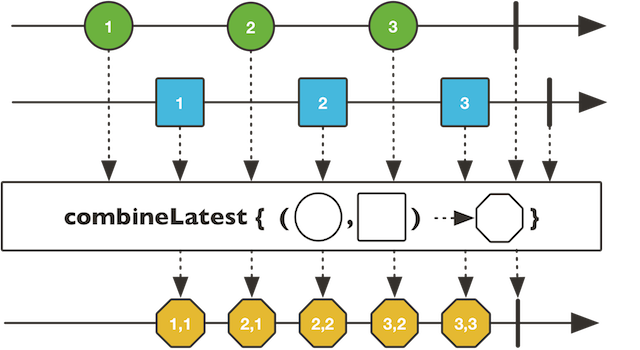
- Type Parameters:
T- type of the value from sourcesV- The produced output after transformation by the given combinator- Parameters:
sources- The upstreamsPublisherto subscribe to.combinator- The aggregate function that will receive a unique value from each upstream and return the value to signal downstream- Returns:
- a
Fluxbased on the produced combinations , 3.0
-
combineLatest
@SafeVarargs public static <T,V> Flux<V> combineLatest(Function<Object[],V> combinator, int prefetch, Publisher<? extends T>... sources)
Build aFluxwhose data are generated by the combination of the most recent published values from all publishers.
- Type Parameters:
T- type of the value from sourcesV- The produced output after transformation by the given combinator- Parameters:
sources- The upstreamsPublisherto subscribe to.prefetch- demand produced to each combined sourcePublishercombinator- The aggregate function that will receive a unique value from each upstream and return the value to signal downstream- Returns:
- a
Fluxbased on the produced combinations , 3.0
-
combineLatest
public static <T1,T2,V> Flux<V> combineLatest(Publisher<? extends T1> source1, Publisher<? extends T2> source2, BiFunction<? super T1,? super T2,? extends V> combinator)
Build aFluxwhose data are generated by the combination of the most recent published values from all publishers.
- Type Parameters:
T1- type of the value from source1T2- type of the value from source2V- The produced output after transformation by the given combinator- Parameters:
source1- The first upstreamPublisherto subscribe to.source2- The second upstreamPublisherto subscribe to.combinator- The aggregate function that will receive a unique value from each upstream and return the value to signal downstream- Returns:
- a
Fluxbased on the produced value
-
combineLatest
public static <T1,T2,T3,V> Flux<V> combineLatest(Publisher<? extends T1> source1, Publisher<? extends T2> source2, Publisher<? extends T3> source3, Function<Object[],V> combinator)
Build aFluxwhose data are generated by the combination of the most recent published values from all publishers.
- Type Parameters:
T1- type of the value from source1T2- type of the value from source2T3- type of the value from source3V- The produced output after transformation by the given combinator- Parameters:
source1- The first upstreamPublisherto subscribe to.source2- The second upstreamPublisherto subscribe to.source3- The third upstreamPublisherto subscribe to.combinator- The aggregate function that will receive a unique value from each upstream and return the value to signal downstream- Returns:
- a
Fluxbased on the produced value
-
combineLatest
public static <T1,T2,T3,T4,V> Flux<V> combineLatest(Publisher<? extends T1> source1, Publisher<? extends T2> source2, Publisher<? extends T3> source3, Publisher<? extends T4> source4, Function<Object[],V> combinator)
Build aFluxwhose data are generated by the combination of the most recent published values from all publishers.
- Type Parameters:
T1- type of the value from source1T2- type of the value from source2T3- type of the value from source3T4- type of the value from source4V- The produced output after transformation by the given combinator- Parameters:
source1- The first upstreamPublisherto subscribe to.source2- The second upstreamPublisherto subscribe to.source3- The third upstreamPublisherto subscribe to.source4- The fourth upstreamPublisherto subscribe to.combinator- The aggregate function that will receive a unique value from each upstream and return the value to signal downstream- Returns:
- a
Fluxbased on the produced value
-
combineLatest
public static <T1,T2,T3,T4,T5,V> Flux<V> combineLatest(Publisher<? extends T1> source1, Publisher<? extends T2> source2, Publisher<? extends T3> source3, Publisher<? extends T4> source4, Publisher<? extends T5> source5, Function<Object[],V> combinator)
Build aFluxwhose data are generated by the combination of the most recent published values from all publishers.
- Type Parameters:
T1- type of the value from source1T2- type of the value from source2T3- type of the value from source3T4- type of the value from source4T5- type of the value from source5V- The produced output after transformation by the given combinator- Parameters:
source1- The first upstreamPublisherto subscribe to.source2- The second upstreamPublisherto subscribe to.source3- The third upstreamPublisherto subscribe to.source4- The fourth upstreamPublisherto subscribe to.source5- The fifth upstreamPublisherto subscribe to.combinator- The aggregate function that will receive a unique value from each upstream and return the value to signal downstream- Returns:
- a
Fluxbased on the produced value
-
combineLatest
public static <T1,T2,T3,T4,T5,T6,V> Flux<V> combineLatest(Publisher<? extends T1> source1, Publisher<? extends T2> source2, Publisher<? extends T3> source3, Publisher<? extends T4> source4, Publisher<? extends T5> source5, Publisher<? extends T6> source6, Function<Object[],V> combinator)
Build aFluxwhose data are generated by the combination of the most recent published values from all publishers.
- Type Parameters:
T1- type of the value from source1T2- type of the value from source2T3- type of the value from source3T4- type of the value from source4T5- type of the value from source5T6- type of the value from source6V- The produced output after transformation by the given combinator- Parameters:
source1- The first upstreamPublisherto subscribe to.source2- The second upstreamPublisherto subscribe to.source3- The third upstreamPublisherto subscribe to.source4- The fourth upstreamPublisherto subscribe to.source5- The fifth upstreamPublisherto subscribe to.source6- The sixth upstreamPublisherto subscribe to.combinator- The aggregate function that will receive a unique value from each upstream and return the value to signal downstream- Returns:
- a
Fluxbased on the produced value
-
combineLatest
public static <T,V> Flux<V> combineLatest(Iterable<? extends Publisher<? extends T>> sources, Function<Object[],V> combinator)
Build aFluxwhose data are generated by the combination of the most recent published values from all publishers.
- Type Parameters:
T- The common base type of the source sequencesV- The produced output after transformation by the given combinator- Parameters:
sources- The list of upstreamPublisherto subscribe to.combinator- The aggregate function that will receive a unique value from each upstream and return the value to signal downstream- Returns:
- a
Fluxbased on the produced value , 3.0
-
combineLatest
public static <T,V> Flux<V> combineLatest(Iterable<? extends Publisher<? extends T>> sources, int prefetch, Function<Object[],V> combinator)
Build aFluxwhose data are generated by the combination of the most recent published values from all publishers.
- Type Parameters:
T- The common base type of the source sequencesV- The produced output after transformation by the given combinator- Parameters:
sources- The list of upstreamPublisherto subscribe to.prefetch- demand produced to each combined sourcePublishercombinator- The aggregate function that will receive a unique value from each upstream and return the value to signal downstream- Returns:
- a
Fluxbased on the produced value , 3.0
-
concat
public static <T> Flux<T> concat(Iterable<? extends Publisher<? extends T>> sources)
Concat all sources pulled from the suppliedIteratoronPublisher.subscribe(org.reactivestreams.Subscriber<? super T>)from the passedIterableuntilIterator.hasNext()returns false. A complete signal from each source will delimit the individual sequences and will be eventually passed to the returned Publisher.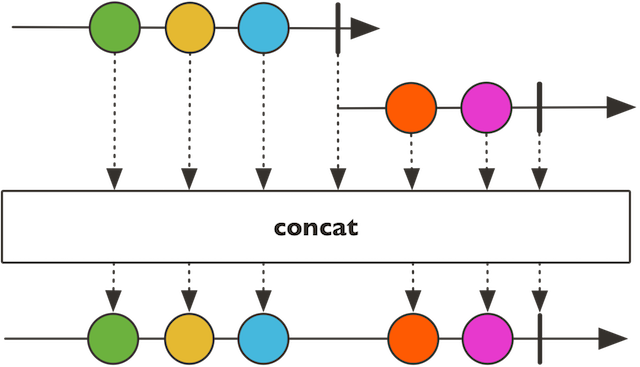
-
concat
public static <T> Flux<T> concat(Publisher<? extends Publisher<? extends T>> sources, int prefetch)
-
concat
@SafeVarargs public static <T> Flux<T> concat(Publisher<? extends T>... sources)
Concat all sources pulled from the givenPublisherarray. A complete signal from each source will delimit the individual sequences and will be eventually passed to the returned Publisher.
-
concatDelayError
public static <T> Flux<T> concatDelayError(Publisher<? extends Publisher<? extends T>> sources)
-
concatDelayError
public static <T> Flux<T> concatDelayError(Publisher<? extends Publisher<? extends T>> sources, int prefetch)
-
concatDelayError
public static <T> Flux<T> concatDelayError(Publisher<? extends Publisher<? extends T>> sources, boolean delayUntilEnd, int prefetch)
Concat all sources emitted as an onNext signal from a parentPublisher. A complete signal from each source will delimit the individual sequences and will be eventually passed to the returnedPublisherwhich will stop listening if the main sequence has also completed. Errors will be delayed after the current concat backlog if delayUntilEnd is false or after all sources if delayUntilEnd is true.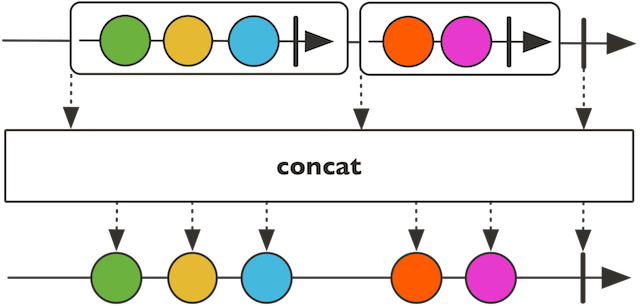
- Type Parameters:
T- The source type of the data sequence- Parameters:
sources- ThePublisherofPublisherto concatdelayUntilEnd- delay error until all sources have been consumed instead of after the current sourceprefetch- the inner source request size- Returns:
- a new
Fluxconcatenating all inner sources sequences until complete or error
-
concatDelayError
@SafeVarargs public static <T> Flux<T> concatDelayError(Publisher<? extends T>... sources)
Concat all sources pulled from the givenPublisherarray. A complete signal from each source will delimit the individual sequences and will be eventually passed to the returned Publisher. Any error will be delayed until all sources have been concatenated.
-
create
public static <T> Flux<T> create(Consumer<? super FluxSink<T>> emitter)
Creates a Flux with multi-emission capabilities (synchronous or asynchronous) through the FluxSink API.This Flux factory is useful if one wants to adapt some other multi-valued async API and not worry about cancellation and backpressure. For example:
Handles backpressure by buffering all signals if the downstream can't keep up.
Flux.<String>create(emitter -> { ActionListener al = e -> { emitter.next(textField.getText()); }; // without cleanup support: button.addActionListener(al); // with cleanup support: button.addActionListener(al); emitter.onDispose(() -> { button.removeListener(al); }); });- Type Parameters:
T- the value type- Parameters:
emitter- the consumer that will receive a FluxSink for each individual Subscriber.- Returns:
- a
Flux
-
create
public static <T> Flux<T> create(Consumer<? super FluxSink<T>> emitter, FluxSink.OverflowStrategy backpressure)
Creates a Flux with multi-emission capabilities (synchronous or asynchronous) through the FluxSink API.This Flux factory is useful if one wants to adapt some other multi-valued async API and not worry about cancellation and backpressure. For example:
Flux.<String>create(emitter -> { ActionListener al = e -> { emitter.next(textField.getText()); }; // without cleanup support: button.addActionListener(al); // with cleanup support: button.addActionListener(al); emitter.onDispose(() -> { button.removeListener(al); }); }, FluxSink.OverflowStrategy.LATEST);- Type Parameters:
T- the value type- Parameters:
backpressure- the backpressure mode, seeFluxSink.OverflowStrategyfor the available backpressure modesemitter- the consumer that will receive a FluxSink for each individual Subscriber.- Returns:
- a
Flux
-
push
public static <T> Flux<T> push(Consumer<? super FluxSink<T>> emitter)
Creates a Flux with multi-emission capabilities from a single threaded producer through the FluxSink API.This Flux factory is useful if one wants to adapt some other single=threaded multi-valued async API and not worry about cancellation and backpressure. For example:
Flux.<String>push(emitter -> { ActionListener al = e -> { emitter.next(textField.getText()); }; // without cleanup support: button.addActionListener(al); // with cleanup support: button.addActionListener(al); emitter.onDispose(() -> { button.removeListener(al); }); }, FluxSink.OverflowStrategy.LATEST);- Type Parameters:
T- the value type- Parameters:
emitter- the consumer that will receive a FluxSink for each individual Subscriber.- Returns:
- a
Flux
-
push
public static <T> Flux<T> push(Consumer<? super FluxSink<T>> emitter, FluxSink.OverflowStrategy backpressure)
Creates a Flux with multi-emission capabilities from a single threaded producer through the FluxSink API.This Flux factory is useful if one wants to adapt some other single-threaded multi-valued async API and not worry about cancellation and backpressure. For example:
Flux.<String>push(emitter -> { ActionListener al = e -> { emitter.next(textField.getText()); }; // without cleanup support: button.addActionListener(al); // with cleanup support: button.addActionListener(al); emitter.onDispose(() -> { button.removeListener(al); }); }, FluxSink.OverflowStrategy.LATEST);- Type Parameters:
T- the value type- Parameters:
backpressure- the backpressure mode, seeFluxSink.OverflowStrategyfor the available backpressure modesemitter- the consumer that will receive a FluxSink for each individual Subscriber.- Returns:
- a
Flux
-
defer
public static <T> Flux<T> defer(Supplier<? extends Publisher<T>> supplier)
Supply aPublishereverytime subscribe is called on the returned flux. The passedSupplierwill be invoked and it's up to the developer to choose to return a new instance of aPublisheror reuse one effectively behaving likefrom(Publisher).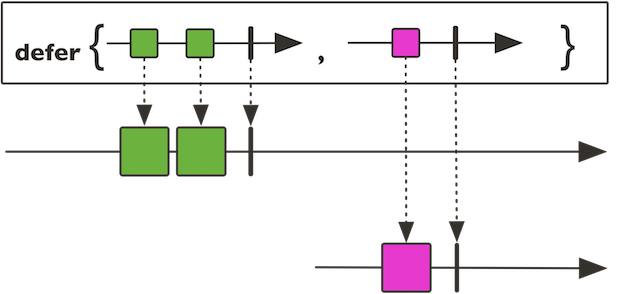
-
empty
public static <T> Flux<T> empty()
Create aFluxthat completes without emitting any item.
- Type Parameters:
T- the reified type of the targetSubscriber- Returns:
- an empty
Flux
-
error
public static <T> Flux<T> error(Throwable error)
Create aFluxthat completes with the specified error.
- Type Parameters:
T- the reified type of the targetSubscriber- Parameters:
error- the error to signal to eachSubscriber- Returns:
- a new failed
Flux
-
error
public static <O> Flux<O> error(Throwable throwable, boolean whenRequested)
Build aFluxthat will only emit an error signal to any new subscriber.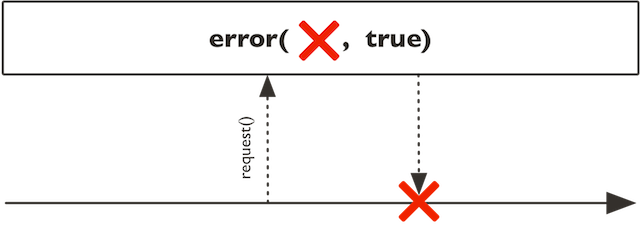
- Type Parameters:
O- the output type- Parameters:
throwable- the error to signal to eachSubscriberwhenRequested- if true, will onError on the first request instead of subscribe().- Returns:
- a new failed
Flux
-
firstEmitting
@SafeVarargs public static <I> Flux<I> firstEmitting(Publisher<? extends I>... sources)
Select the fastest source who emitted first onNext or onComplete or onError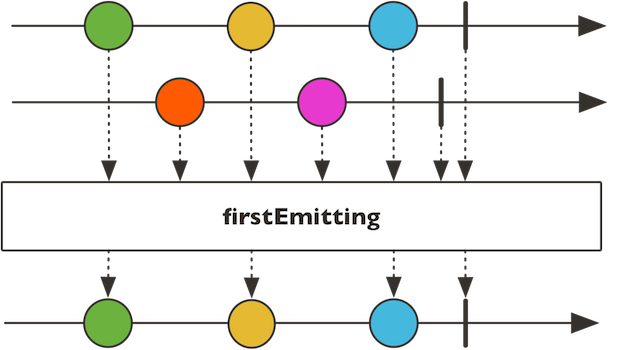
- Type Parameters:
I- The source type of the data sequence- Parameters:
sources- The competing source publishers- Returns:
- a new
Fluxeventually subscribed to one of the sources or empty
-
firstEmitting
public static <I> Flux<I> firstEmitting(Iterable<? extends Publisher<? extends I>> sources)
Select the fastest source who won the "ambiguous" race and emitted first onNext or onComplete or onError
- Type Parameters:
I- The source type of the data sequence- Parameters:
sources- The competing source publishers- Returns:
- a new
Fluxeventually subscribed to one of the sources or empty
-
from
public static <T> Flux<T> from(Publisher<? extends T> source)
- Type Parameters:
T- the source sequence type- Parameters:
source- the source to decorate- Returns:
- a new
Flux
-
fromArray
public static <T> Flux<T> fromArray(T[] array)
-
generate
public static <T> Flux<T> generate(Consumer<SynchronousSink<T>> generator)
Generate signals one-by-one via a consumer callback.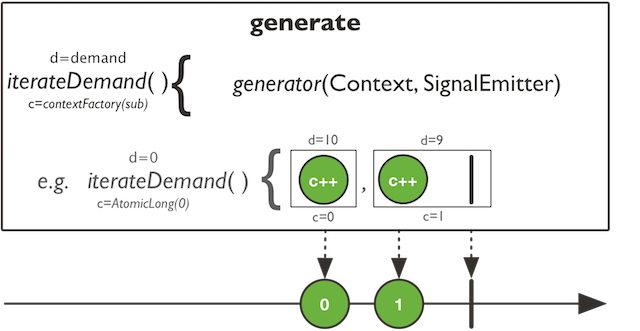
- Type Parameters:
T- the value type emitted- Parameters:
generator- the consumer called with the SynchronousSink API instance- Returns:
- a Reactive
Fluxpublisher ready to be subscribed
-
generate
public static <T,S> Flux<T> generate(Callable<S> stateSupplier, BiFunction<S,SynchronousSink<T>,S> generator)
Generate signals one-by-one via a function callback. ThestateSuppliermay returnnull.
- Type Parameters:
T- the value type emittedS- the custom state per subscriber- Parameters:
stateSupplier- called for each incoming Supplier to provide the initial state for the generator bifunctiongenerator- the bifunction called with the current state, the SynchronousSink API instance and is expected to return a (new) state.- Returns:
- a Reactive
Fluxpublisher ready to be subscribed
-
generate
public static <T,S> Flux<T> generate(Callable<S> stateSupplier, BiFunction<S,SynchronousSink<T>,S> generator, Consumer<? super S> stateConsumer)
Generate signals one-by-one via a function callback. ThestateSuppliermay returnnullbut yourstateConsumershould be prepared to handle it.
- Type Parameters:
T- the value type emittedS- the custom state per subscriber- Parameters:
stateSupplier- called for each incoming Supplier to provide the initial state for the generator bifunctiongenerator- the bifunction called with the current state, the SynchronousSink API instance and is expected to return a (new) state.stateConsumer- called after the generator has terminated or the downstream cancelled, receiving the last state to be handled (i.e., release resources or do other cleanup).- Returns:
- a Reactive
Fluxpublisher ready to be subscribed
-
interval
public static Flux<Long> interval(Duration period)
Create aFluxthat emits an ever incrementing long starting with 0 every period on the global timer. If demand is not produced in time, an onError will be signalled. TheFluxwill never complete.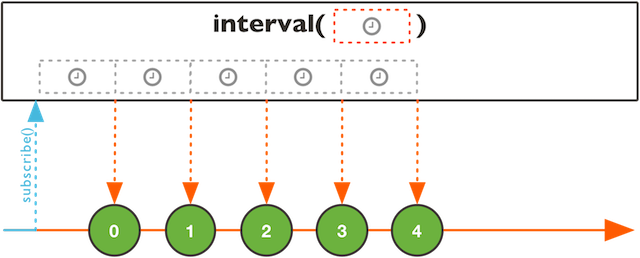
- Parameters:
period- The duration to wait before the next increment- Returns:
- a new timed
Flux
-
interval
public static Flux<Long> interval(Duration delay, Duration period)
Create aFluxthat emits an ever incrementing long starting with 0 every N period of time unit on a global timer. If demand is not produced in time, an onError will be signalled. TheFluxwill never complete.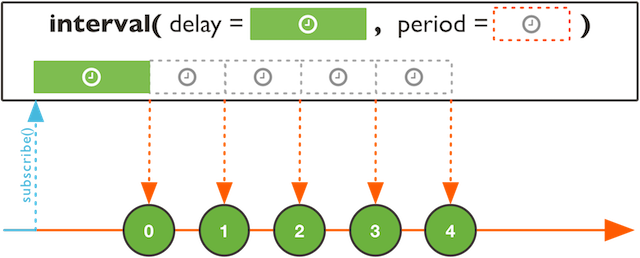
- Parameters:
delay- the delay to wait before emitting 0lperiod- the period before each following increment- Returns:
- a new timed
Flux
-
intervalMillis
@Deprecated public static Flux<Long> intervalMillis(long period)
Deprecated. use theDurationbased variants instead, will be removed in 3.1.0Create aFluxthat emits an ever incrementing long starting with 0 every N milliseconds on the given timer. If demand is not produced in time, an onError will be signalled. TheFluxwill never complete.
- Parameters:
period- The number of milliseconds to wait before the next increment- Returns:
- a new timed
Flux
-
intervalMillis
@Deprecated public static Flux<Long> intervalMillis(long period, TimedScheduler timer)
Deprecated. use theDurationbased variants instead, will be removed in 3.1.0
-
intervalMillis
@Deprecated public static Flux<Long> intervalMillis(long delay, long period)
Deprecated. use theDurationbased variants instead, will be removed in 3.1.0Create aFluxthat emits an ever incrementing long starting with 0 every N period of time unit on a global timer. If demand is not produced in time, an onError will be signalled. TheFluxwill never complete.
- Parameters:
delay- the delay in milliseconds to wait before emitting 0lperiod- the period in milliseconds before each following increment- Returns:
- a new timed
Flux
-
intervalMillis
@Deprecated public static Flux<Long> intervalMillis(long delay, long period, TimedScheduler timer)
Deprecated. use theDurationbased variants instead, will be removed in 3.1.0
-
just
@SafeVarargs public static <T> Flux<T> just(T... data)
Create aFluxthat emits the specified items and then completes.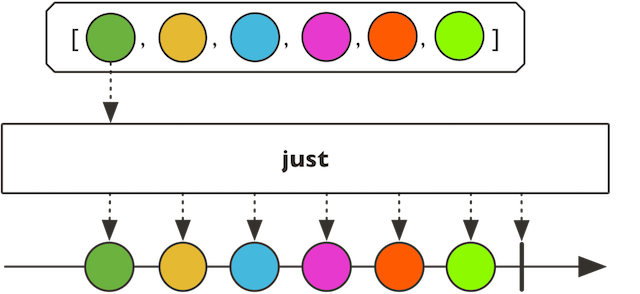
- Type Parameters:
T- the emitted data type- Parameters:
data- the consecutive data objects to emit- Returns:
- a new
Flux
-
just
public static <T> Flux<T> just(T data)
Create a newFluxthat will only emit the passed data then onComplete.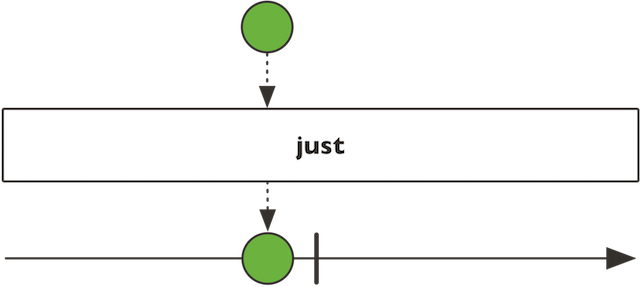
- Type Parameters:
T- the emitted data type- Parameters:
data- the unique data to emit- Returns:
- a new
Flux
-
merge
public static <T> Flux<T> merge(Publisher<? extends Publisher<? extends T>> source, int concurrency)
-
merge
public static <T> Flux<T> merge(Publisher<? extends Publisher<? extends T>> source, int concurrency, int prefetch)
-
merge
public static <I> Flux<I> merge(Iterable<? extends Publisher<? extends I>> sources)
Merge emittedPublishersequences from the passedIterableinto an interleaved merged sequence.Iterable.iterator()will be called for eachPublisher.subscribe(org.reactivestreams.Subscriber<? super T>).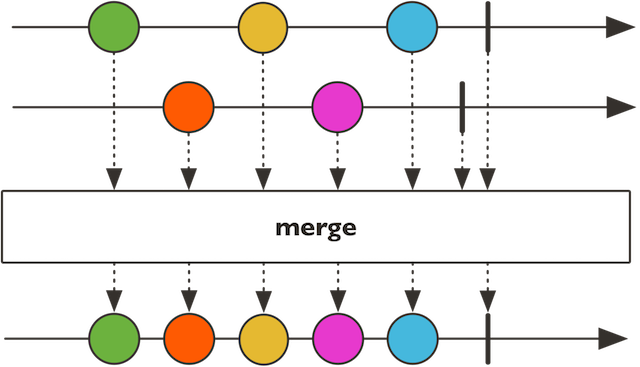
- Type Parameters:
I- The source type of the data sequence- Parameters:
sources- theIterableto lazily iterate onPublisher.subscribe(Subscriber)- Returns:
- a fresh Reactive
Fluxpublisher ready to be subscribed
-
merge
@SafeVarargs public static <I> Flux<I> merge(Publisher<? extends I>... sources)
Merge emittedPublishersequences from the passedPublisherarray into an interleaved merged sequence.
- Type Parameters:
I- The source type of the data sequence- Parameters:
sources- thePublisherarray to iterate onPublisher.subscribe(Subscriber)- Returns:
- a fresh Reactive
Fluxpublisher ready to be subscribed
-
merge
@SafeVarargs public static <I> Flux<I> merge(int prefetch, Publisher<? extends I>... sources)
Merge emittedPublishersequences from the passedPublisherarray into an interleaved merged sequence.
- Type Parameters:
I- The source type of the data sequence- Parameters:
sources- thePublisherarray to iterate onPublisher.subscribe(Subscriber)prefetch- the inner source request size- Returns:
- a fresh Reactive
Fluxpublisher ready to be subscribed
-
mergeDelayError
@SafeVarargs public static <I> Flux<I> mergeDelayError(int prefetch, Publisher<? extends I>... sources)
Merge emittedPublishersequences from the passedPublisherarray into an interleaved merged sequence. This variant will delay any error until after the rest of the merge backlog has been processed.
- Type Parameters:
I- The source type of the data sequence- Parameters:
sources- thePublisherarray to iterate onPublisher.subscribe(Subscriber)prefetch- the inner source request size- Returns:
- a fresh Reactive
Fluxpublisher ready to be subscribed
-
merge
@SafeVarargs @Deprecated public static <I> Flux<I> merge(int prefetch, boolean delayError, Publisher<? extends I>... sources)
Deprecated. usemerge(int, Publisher[])ormergeDelayError(int, Publisher[])instead, will be removed in 3.1.0Merge emittedPublishersequences from the passedPublisherarray into an interleaved merged sequence.
- Type Parameters:
I- The source type of the data sequence- Parameters:
sources- thePublisherarray to iterate onPublisher.subscribe(Subscriber)prefetch- the inner source request sizedelayError- should any error be delayed after current merge backlog- Returns:
- a fresh Reactive
Fluxpublisher ready to be subscribed
-
mergeSequential
public static <T> Flux<T> mergeSequential(Publisher<? extends Publisher<? extends T>> sources)
-
mergeSequential
public static <T> Flux<T> mergeSequential(Publisher<? extends Publisher<? extends T>> sources, int maxConcurrency, int prefetch)
Merge emittedPublishersequences by the passedPublisherinto an ordered merged sequence. Unlike concat, the inner publishers are subscribed to eagerly. Unlike merge, their emitted values are merged into the final sequence in subscription order.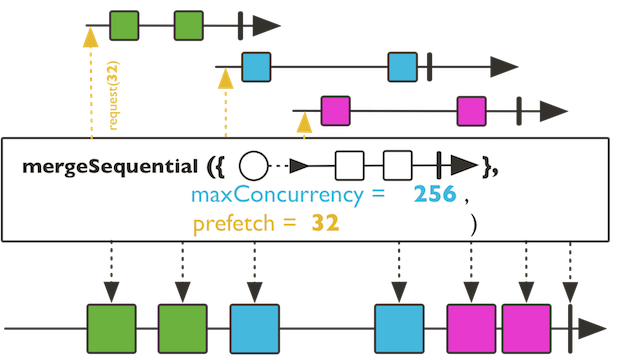
- Type Parameters:
T- the merged type- Parameters:
sources- aPublisherofPublishersequence to mergeprefetch- the inner source request sizemaxConcurrency- the request produced to the main source thus limiting concurrent merge backlog- Returns:
- a merged
Flux, subscribing early but keeping the original ordering
-
mergeSequentialDelayError
public static <T> Flux<T> mergeSequentialDelayError(Publisher<? extends Publisher<? extends T>> sources, int maxConcurrency, int prefetch)
Merge emittedPublishersequences by the passedPublisherinto an ordered merged sequence. Unlike concat, the inner publishers are subscribed to eagerly. Unlike merge, their emitted values are merged into the final sequence in subscription order. This variant will delay any error until after the rest of the mergeSequential backlog has been processed.
- Type Parameters:
T- the merged type- Parameters:
sources- aPublisherofPublishersequence to mergeprefetch- the inner source request sizemaxConcurrency- the request produced to the main source thus limiting concurrent merge backlog- Returns:
- a merged
Flux, subscribing early but keeping the original ordering
-
mergeSequential
@Deprecated public static <T> Flux<T> mergeSequential(Publisher<? extends Publisher<? extends T>> sources, boolean delayError, int maxConcurrency, int prefetch)
Deprecated. usemergeSequential(Publisher, int, int)ormergeSequentialDelayError(Publisher, int, int)instead, will be removed in 3.1.0.Merge emittedPublishersequences by the passedPublisherinto an ordered merged sequence. Unlike concat, the inner publishers are subscribed to eagerly. Unlike merge, their emitted values are merged into the final sequence in subscription order.
- Type Parameters:
T- the merged type- Parameters:
sources- aPublisherofPublishersequence to mergedelayError- should any error be delayed after current merge backlogprefetch- the inner source request sizemaxConcurrency- the request produced to the main source thus limiting concurrent merge backlog- Returns:
- a merged
Flux, subscribing early but keeping the original ordering
-
mergeSequential
@SafeVarargs public static <I> Flux<I> mergeSequential(Publisher<? extends I>... sources)
Merge a number ofPublishersequences into an ordered merged sequence. Unlike concat, the inner publishers are subscribed to eagerly. Unlike merge, their emitted values are merged into the final sequence in subscription order.
-
mergeSequential
@SafeVarargs public static <I> Flux<I> mergeSequential(int prefetch, Publisher<? extends I>... sources)
Merge a number ofPublishersequences into an ordered merged sequence. Unlike concat, the inner publishers are subscribed to eagerly. Unlike merge, their emitted values are merged into the final sequence in subscription order.
-
mergeSequentialDelayError
@SafeVarargs public static <I> Flux<I> mergeSequentialDelayError(int prefetch, Publisher<? extends I>... sources)
Merge a number ofPublishersequences into an ordered merged sequence. Unlike concat, the inner publishers are subscribed to eagerly. Unlike merge, their emitted values are merged into the final sequence in subscription order. This variant will delay any error until after the rest of the mergeSequential backlog has been processed.
-
mergeSequential
@SafeVarargs @Deprecated public static <I> Flux<I> mergeSequential(int prefetch, boolean delayError, Publisher<? extends I>... sources)
Deprecated. usemergeSequential(int, Publisher[])ormergeSequentialDelayError(int, Publisher[])instead, will be removed in 3.1.0Merge a number ofPublishersequences into an ordered merged sequence. Unlike concat, the inner publishers are subscribed to eagerly. Unlike merge, their emitted values are merged into the final sequence in subscription order.
-
mergeSequential
public static <I> Flux<I> mergeSequential(Iterable<? extends Publisher<? extends I>> sources)
-
mergeSequential
public static <I> Flux<I> mergeSequential(Iterable<? extends Publisher<? extends I>> sources, int maxConcurrency, int prefetch)
MergePublishersequences from anIterableinto an ordered merged sequence. Unlike concat, the inner publishers are subscribed to eagerly. Unlike merge, their emitted values are merged into the final sequence in subscription order.
- Type Parameters:
I- the merged type- Parameters:
sources- anIterableofPublishersequences to mergemaxConcurrency- the request produced to the main source thus limiting concurrent merge backlogprefetch- the inner source request size- Returns:
- a merged
Flux, subscribing early but keeping the original ordering
-
mergeSequentialDelayError
public static <I> Flux<I> mergeSequentialDelayError(Iterable<? extends Publisher<? extends I>> sources, int maxConcurrency, int prefetch)
MergePublishersequences from anIterableinto an ordered merged sequence. Unlike concat, the inner publishers are subscribed to eagerly. Unlike merge, their emitted values are merged into the final sequence in subscription order. This variant will delay any error until after the rest of the mergeSequential backlog has been processed.
- Type Parameters:
I- the merged type- Parameters:
sources- anIterableofPublishersequences to mergemaxConcurrency- the request produced to the main source thus limiting concurrent merge backlogprefetch- the inner source request size- Returns:
- a merged
Flux, subscribing early but keeping the original ordering
-
mergeSequential
@Deprecated public static <I> Flux<I> mergeSequential(Iterable<? extends Publisher<? extends I>> sources, boolean delayError, int maxConcurrency, int prefetch)
Deprecated. usemergeSequential(Iterable, int, int)ormergeSequentialDelayError(Iterable, int, int)instead, will be removed in 3.1.0.MergePublishersequences from anIterableinto an ordered merged sequence. Unlike concat, the inner publishers are subscribed to eagerly. Unlike merge, their emitted values are merged into the final sequence in subscription order.
- Type Parameters:
I- the merged type- Parameters:
sources- anIterableofPublishersequences to mergedelayError- should any error be delayed after current merge backlogmaxConcurrency- the request produced to the main source thus limiting concurrent merge backlogprefetch- the inner source request size- Returns:
- a merged
Flux, subscribing early but keeping the original ordering
-
never
public static <T> Flux<T> never()
Create aFluxthat will never signal any data, error or completion signal.
- Type Parameters:
T- theSubscribertype target- Returns:
- a never completing
Flux
-
range
public static Flux<Integer> range(int start, int count)
Build aFluxthat will only emit a sequence of incrementing integer fromstarttostart + countthen complete.
- Parameters:
start- the first integer to be emitcount- the number ot times to emit an increment including the first value- Returns:
- a ranged
Flux
-
switchOnNext
public static <T> Flux<T> switchOnNext(Publisher<? extends Publisher<? extends T>> mergedPublishers)
Build aFluxProcessorwhose data are emitted by the most recent emittedPublisher. TheFluxwill complete once both the publishers source and the last switched toPublisherhave completed.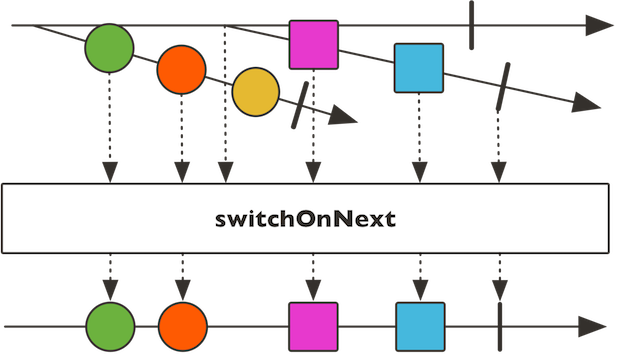
- Type Parameters:
T- the produced type- Parameters:
mergedPublishers- ThePublisherof switchingPublisherto subscribe to.- Returns:
- a
FluxProcessoraccepting publishers and producing T
-
switchOnNext
public static <T> Flux<T> switchOnNext(Publisher<? extends Publisher<? extends T>> mergedPublishers, int prefetch)
Build aFluxProcessorwhose data are emitted by the most recent emittedPublisher. TheFluxwill complete once both the publishers source and the last switched toPublisherhave completed.
- Type Parameters:
T- the produced type- Parameters:
mergedPublishers- ThePublisherof switchingPublisherto subscribe to.prefetch- the inner source request size- Returns:
- a
FluxProcessoraccepting publishers and producing T
-
using
public static <T,D> Flux<T> using(Callable<? extends D> resourceSupplier, Function<? super D,? extends Publisher<? extends T>> sourceSupplier, Consumer<? super D> resourceCleanup)
Uses a resource, generated by a supplier for each individual Subscriber, while streaming the values from a Publisher derived from the same resource and makes sure the resource is released if the sequence terminates or the Subscriber cancels.Eager resource cleanup happens just before the source termination and exceptions raised by the cleanup Consumer may override the terminal even.
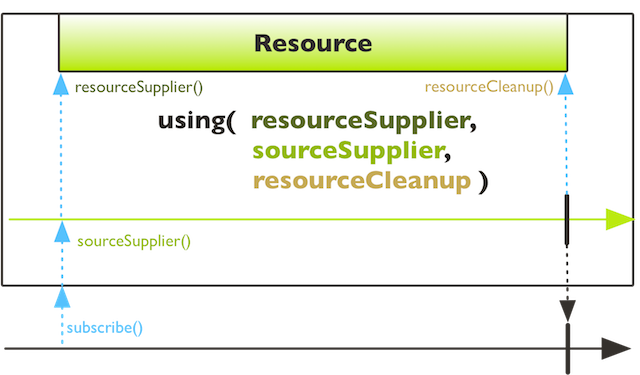
-
using
public static <T,D> Flux<T> using(Callable<? extends D> resourceSupplier, Function<? super D,? extends Publisher<? extends T>> sourceSupplier, Consumer<? super D> resourceCleanup, boolean eager)
Uses a resource, generated by a supplier for each individual Subscriber, while streaming the values from a Publisher derived from the same resource and makes sure the resource is released if the sequence terminates or the Subscriber cancels.- Eager resource cleanup happens just before the source termination and exceptions raised by the cleanup Consumer may override the terminal even.
- Non-eager cleanup will drop any exception.

- Type Parameters:
T- emitted typeD- resource type- Parameters:
resourceSupplier- aCallablethat is called on subscribesourceSupplier- aPublisherfactory derived from the supplied resourceresourceCleanup- invoked on completioneager- true to clean before terminating downstream subscribers- Returns:
- new Stream
-
zip
public static <T1,T2,O> Flux<O> zip(Publisher<? extends T1> source1, Publisher<? extends T2> source2, BiFunction<? super T1,? super T2,? extends O> combinator)
"Step-Merge" especially useful in Scatter-Gather scenarios. The operator will forward all combinations produced by the passed combinator function of the most recent items emitted by each source until any of them completes. Errors will immediately be forwarded.
- Type Parameters:
T1- type of the value from source1T2- type of the value from source2O- The produced output after transformation by the combinator- Parameters:
source1- The first upstreamPublisherto subscribe to.source2- The second upstreamPublisherto subscribe to.combinator- The aggregate function that will receive a unique value from each upstream and return the value to signal downstream- Returns:
- a zipped
Flux
-
zip
public static <T1,T2> Flux<Tuple2<T1,T2>> zip(Publisher<? extends T1> source1, Publisher<? extends T2> source2)
"Step-Merge" especially useful in Scatter-Gather scenarios. The operator will forward all combinations of the most recent items emitted by each source until any of them completes. Errors will immediately be forwarded.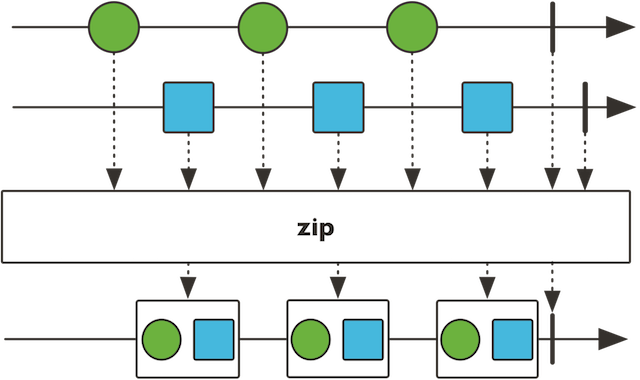
-
zip
public static <T1,T2,T3> Flux<Tuple3<T1,T2,T3>> zip(Publisher<? extends T1> source1, Publisher<? extends T2> source2, Publisher<? extends T3> source3)
"Step-Merge" especially useful in Scatter-Gather scenarios. The operator will forward all combinations of the most recent items emitted by each source until any of them completes. Errors will immediately be forwarded.
- Type Parameters:
T1- type of the value from source1T2- type of the value from source2T3- type of the value from source3- Parameters:
source1- The first upstreamPublisherto subscribe to.source2- The second upstreamPublisherto subscribe to.source3- The third upstreamPublisherto subscribe to.- Returns:
- a zipped
Flux
-
zip
public static <T1,T2,T3,T4> Flux<Tuple4<T1,T2,T3,T4>> zip(Publisher<? extends T1> source1, Publisher<? extends T2> source2, Publisher<? extends T3> source3, Publisher<? extends T4> source4)
"Step-Merge" especially useful in Scatter-Gather scenarios. The operator will forward all combinations of the most recent items emitted by each source until any of them completes. Errors will immediately be forwarded.
- Type Parameters:
T1- type of the value from source1T2- type of the value from source2T3- type of the value from source3T4- type of the value from source4- Parameters:
source1- The first upstreamPublisherto subscribe to.source2- The second upstreamPublisherto subscribe to.source3- The third upstreamPublisherto subscribe to.source4- The fourth upstreamPublisherto subscribe to.- Returns:
- a zipped
Flux
-
zip
public static <T1,T2,T3,T4,T5> Flux<Tuple5<T1,T2,T3,T4,T5>> zip(Publisher<? extends T1> source1, Publisher<? extends T2> source2, Publisher<? extends T3> source3, Publisher<? extends T4> source4, Publisher<? extends T5> source5)
"Step-Merge" especially useful in Scatter-Gather scenarios. The operator will forward all combinations of the most recent items emitted by each source until any of them completes. Errors will immediately be forwarded.
- Type Parameters:
T1- type of the value from source1T2- type of the value from source2T3- type of the value from source3T4- type of the value from source4T5- type of the value from source5- Parameters:
source1- The first upstreamPublisherto subscribe to.source2- The second upstreamPublisherto subscribe to.source3- The third upstreamPublisherto subscribe to.source4- The fourth upstreamPublisherto subscribe to.source5- The fifth upstreamPublisherto subscribe to.- Returns:
- a zipped
Flux
-
zip
public static <T1,T2,T3,T4,T5,T6> Flux<Tuple6<T1,T2,T3,T4,T5,T6>> zip(Publisher<? extends T1> source1, Publisher<? extends T2> source2, Publisher<? extends T3> source3, Publisher<? extends T4> source4, Publisher<? extends T5> source5, Publisher<? extends T6> source6)
"Step-Merge" especially useful in Scatter-Gather scenarios. The operator will forward all combinations of the most recent items emitted by each source until any of them completes. Errors will immediately be forwarded.
- Type Parameters:
T1- type of the value from source1T2- type of the value from source2T3- type of the value from source3T4- type of the value from source4T5- type of the value from source5T6- type of the value from source6- Parameters:
source1- The first upstreamPublisherto subscribe to.source2- The second upstreamPublisherto subscribe to.source3- The third upstreamPublisherto subscribe to.source4- The fourth upstreamPublisherto subscribe to.source5- The fifth upstreamPublisherto subscribe to.source6- The sixth upstreamPublisherto subscribe to.- Returns:
- a zipped
Flux
-
zip
@Deprecated public static Flux<Tuple2> zip(Iterable<? extends Publisher<?>> sources)
Deprecated. prefer usingzip(Iterable, Function), will be removed in 3.1.0"Step-Merge" especially useful in Scatter-Gather scenarios. The operator will forward all combinations of the most recent items emitted by each source until any of them completes. Errors will immediately be forwarded. TheIterable.iterator()will be called on eachPublisher.subscribe(Subscriber).Note that this version is very limited compared to the alternatives where you either provide a fixed number of sources or a more meaningful combinator. Here we default to combining into
Tuples, which limits us to up to 8 sources (Tuple8). Additionally, since aTuple2is returned, the usage will probably be limited to iterating over the Tuple (or casting to the correct TupleN, but if you can do that you're better off using the fixed size signatures likezip(Publisher, Publisher, Publisher)). Consider usingzip(Iterable, Function)instead, withArrays.asList(Object[])as a combinator, if you really don't know the number of sources or if it can grow beyond 8.
- Parameters:
sources- theIterableto iterate onPublisher.subscribe(Subscriber)- Returns:
- a zipped
Flux - See Also:
zip(Publisher, Publisher, Publisher),zip(Iterable, Function)
-
zip
public static <O> Flux<O> zip(Iterable<? extends Publisher<?>> sources, Function<? super Object[],? extends O> combinator)
"Step-Merge" especially useful in Scatter-Gather scenarios. The operator will forward all combinations produced by the passed combinator function of the most recent items emitted by each source until any of them completes. Errors will immediately be forwarded. TheIterable.iterator()will be called on eachPublisher.subscribe(Subscriber).
- Type Parameters:
O- the combined produced type- Parameters:
sources- theIterableto iterate onPublisher.subscribe(Subscriber)combinator- The aggregate function that will receive a unique value from each upstream and return the value to signal downstream- Returns:
- a zipped
Flux
-
zip
public static <O> Flux<O> zip(Iterable<? extends Publisher<?>> sources, int prefetch, Function<? super Object[],? extends O> combinator)
"Step-Merge" especially useful in Scatter-Gather scenarios. The operator will forward all combinations produced by the passed combinator function of the most recent items emitted by each source until any of them completes. Errors will immediately be forwarded. TheIterable.iterator()will be called on eachPublisher.subscribe(Subscriber).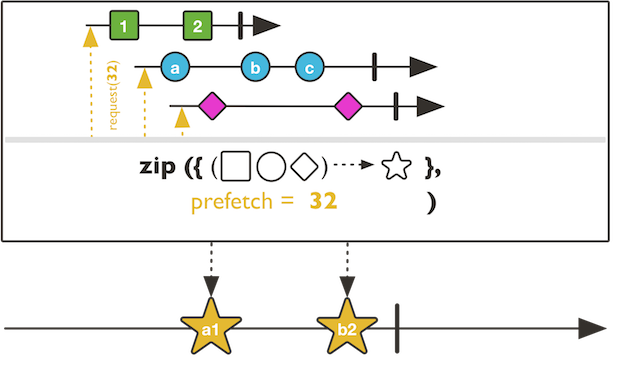
- Type Parameters:
O- the combined produced type- Parameters:
sources- theIterableto iterate onPublisher.subscribe(Subscriber)prefetch- the inner source request sizecombinator- The aggregate function that will receive a unique value from each upstream and return the value to signal downstream- Returns:
- a zipped
Flux
-
zip
@SafeVarargs public static <I,O> Flux<O> zip(Function<? super Object[],? extends O> combinator, Publisher<? extends I>... sources)
"Step-Merge" especially useful in Scatter-Gather scenarios. The operator will forward all combinations produced by the passed combinator function of the most recent items emitted by each source until any of them completes. Errors will immediately be forwarded.
- Type Parameters:
I- the type of the input sourcesO- the combined produced type- Parameters:
combinator- The aggregate function that will receive a unique value from each upstream and return the value to signal downstreamsources- thePublisherarray to iterate onPublisher.subscribe(Subscriber)- Returns:
- a zipped
Flux
-
zip
@SafeVarargs public static <I,O> Flux<O> zip(Function<? super Object[],? extends O> combinator, int prefetch, Publisher<? extends I>... sources)
"Step-Merge" especially useful in Scatter-Gather scenarios. The operator will forward all combinations produced by the passed combinator function of the most recent items emitted by each source until any of them completes. Errors will immediately be forwarded.
- Type Parameters:
I- the type of the input sourcesO- the combined produced type- Parameters:
combinator- The aggregate function that will receive a unique value from each upstream and return the value to signal downstreamprefetch- individual source request sizesources- thePublisherarray to iterate onPublisher.subscribe(Subscriber)- Returns:
- a zipped
Flux
-
zip
public static <TUPLE extends Tuple2,V> Flux<V> zip(Publisher<? extends Publisher<?>> sources, Function<? super TUPLE,? extends V> combinator)
"Step-Merge" especially useful in Scatter-Gather scenarios. ThePublisherofPublisherwill accumulate into a list until completion before starting zip operation. The operator will forward all combinations of the most recent items emitted by each published source until any of them completes. Errors will immediately be forwarded.
- Type Parameters:
TUPLE- the raw tuple typeV- The produced output after transformation by the given combinator- Parameters:
sources- The publisher of upstreamPublisherto subscribe to.combinator- The aggregate function that will receive a unique value from each upstream and return the value to signal downstream- Returns:
- a
Fluxbased on the produced value
-
all
public final Mono<Boolean> all(Predicate<? super T> predicate)
Emit a single boolean true if all values of this sequence match thePredicate.The implementation uses short-circuit logic and completes with false if the predicate doesn't match a value.

-
any
public final Mono<Boolean> any(Predicate<? super T> predicate)
Emit a single boolean true if any of the values of thisFluxsequence match the predicate.The implementation uses short-circuit logic and completes with true if the predicate matches a value.
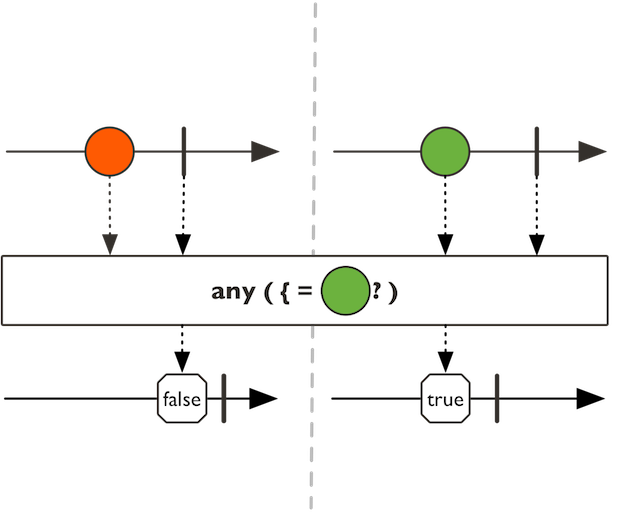
- Parameters:
predicate- predicate tested upon values- Returns:
- a new
Fluxwithtrueif any value satisfies a predicate andfalseotherwise
-
as
public final <P> P as(Function<? super Flux<T>,P> transformer)
Immediately apply the given transformation to thisFluxin order to generate a target type.flux.as(Mono::from).subscribe()- Type Parameters:
P- the returned type- Parameters:
transformer- theFunctionto immediately map thisFluxinto a target type instance.- Returns:
- a an instance of P
- See Also:
for a bounded conversion to {@link Publisher}
-
awaitOnSubscribe
public final Flux<T> awaitOnSubscribe()
Intercepts the onSubscribe call and makes sure calls to Subscription methods only happen after the child Subscriber has returned from its onSubscribe method.This helps with child Subscribers that don't expect a recursive call from onSubscribe into their onNext because, for example, they request immediately from their onSubscribe but don't finish their preparation before that and onNext runs into a half-prepared state. This can happen with non Reactor mentality based Subscribers.
- Returns:
- non reentrant onSubscribe
Flux
-
blockFirst
public final T blockFirst()
Blocks until the upstream signals its first value or completes.- Returns:
- the first value or null
-
blockFirst
public final T blockFirst(Duration d)
Blocks until the upstream signals its first value or completes.- Parameters:
d- max duration timeout to wait for.- Returns:
- the first value or null
-
blockFirstMillis
@Deprecated public final T blockFirstMillis(long timeout)
Deprecated. use theDurationbased variants instead, will be removed in 3.1.0Blocks until the upstream signals its first value or completes.- Parameters:
timeout- max duration timeout in millis to wait for.- Returns:
- the first value or null
-
blockLast
public final T blockLast()
Blocks until the upstream completes and return the last emitted value.- Returns:
- the last value or null
-
blockLast
public final T blockLast(Duration d)
Blocks until the upstream completes and return the last emitted value.- Parameters:
d- max duration timeout to wait for.- Returns:
- the last value or null
-
blockLastMillis
@Deprecated public final T blockLastMillis(long timeout)
Deprecated. use theDurationbased variants instead, will be removed in 3.1.0Blocks until the upstream completes and return the last emitted value.- Parameters:
timeout- max duration timeout in millis to wait for.- Returns:
- the last value or null
-
buffer
public final Flux<List<T>> buffer()
- Returns:
- a buffered
Fluxof at most oneList - See Also:
for an alternative collecting algorithm returning {@link Mono}
-
buffer
public final <C extends Collection<? super T>> Flux<C> buffer(int maxSize, Supplier<C> bufferSupplier)
Collect incoming values into multipleCollectionbuckets that will be pushed into the returnedFluxwhen the given max size is reached or onComplete is received.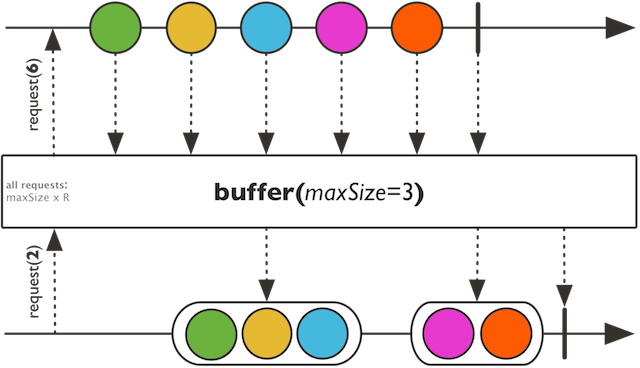
- Type Parameters:
C- the suppliedCollectiontype- Parameters:
maxSize- the maximum collected sizebufferSupplier- the collection to use for each data segment- Returns:
- a microbatched
FluxofCollection
-
buffer
public final Flux<List<T>> buffer(int maxSize, int skip)
Collect incoming values into multipleListthat will be pushed into the returnedFluxwhen the given max size is reached or onComplete is received. A new containerListwill be created every given skip count.When Skip > Max Size : dropping buffers
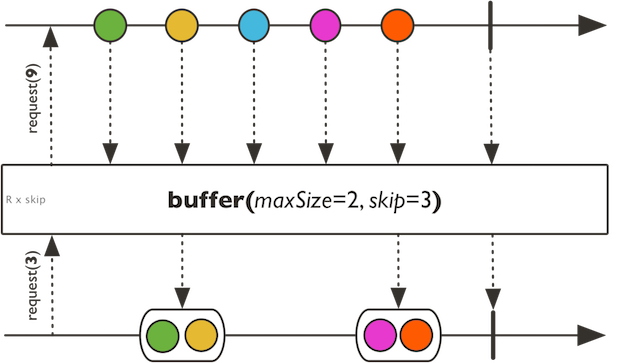
When Skip < Max Size : overlapping buffers
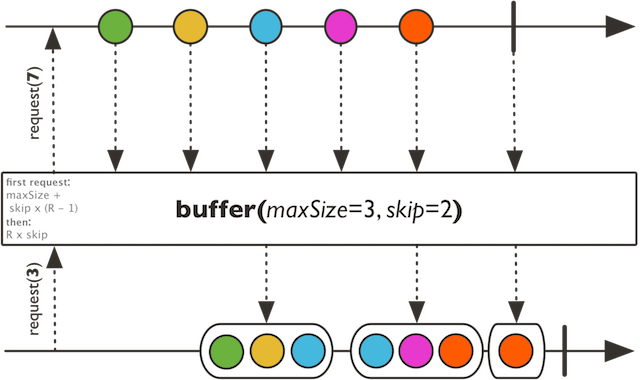
When Skip == Max Size : exact buffers

-
buffer
public final <C extends Collection<? super T>> Flux<C> buffer(int maxSize, int skip, Supplier<C> bufferSupplier)
Collect incoming values into multipleCollectionthat will be pushed into the returnedFluxwhen the given max size is reached or onComplete is received. A new containerCollectionwill be created every given skip count.When Skip > Max Size : dropping buffers

When Skip < Max Size : overlapping buffers

When Skip == Max Size : exact buffers

- Type Parameters:
C- the suppliedCollectiontype- Parameters:
skip- the number of items to skip before creating a new bucketmaxSize- the max collected sizebufferSupplier- the collection to use for each data segment- Returns:
- a microbatched
Fluxof possibly overlapped or gappedCollection
-
buffer
public final <C extends Collection<? super T>> Flux<C> buffer(Publisher<?> other, Supplier<C> bufferSupplier)
- Type Parameters:
C- the suppliedCollectiontype- Parameters:
other- the otherPublisherto subscribe to for emitting and recycling receiving bucketbufferSupplier- the collection to use for each data segment- Returns:
- a microbatched
FluxofCollectiondelimited by aPublisher
-
buffer
@Deprecated public final <U,V> Flux<List<T>> buffer(Publisher<U> bucketOpening, Function<? super U,? extends Publisher<V>> closeSelector)
Deprecated. will be removed in 3.1.0. UsebufferWhen(Publisher, Function)instead.Collect incoming values into multipleListdelimited by the givenPublishersignals. EachListbucket will last until the mappedPublisherreceiving the boundary signal emits, thus releasing the bucket to the returnedFlux.When Open signal is strictly not overlapping Close signal : dropping buffers
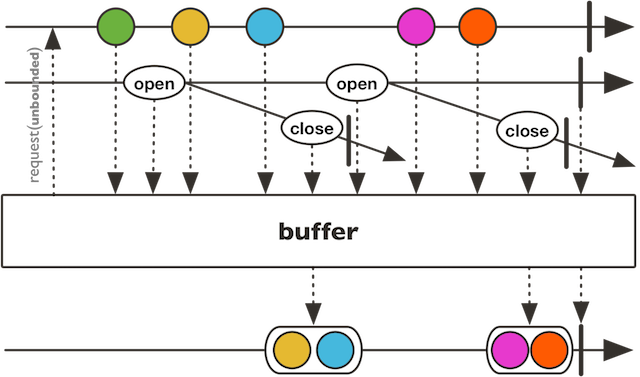
When Open signal is strictly more frequent than Close signal : overlapping buffers
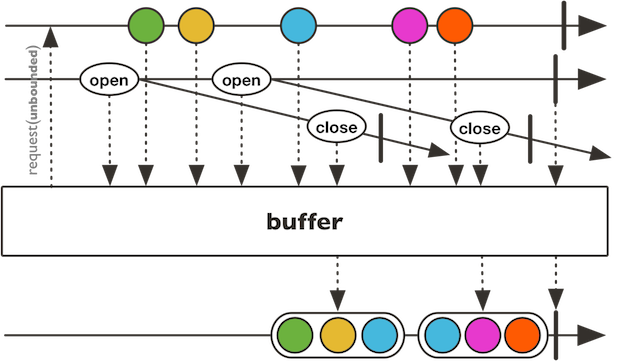
When Open signal is exactly coordinated with Close signal : exact buffers
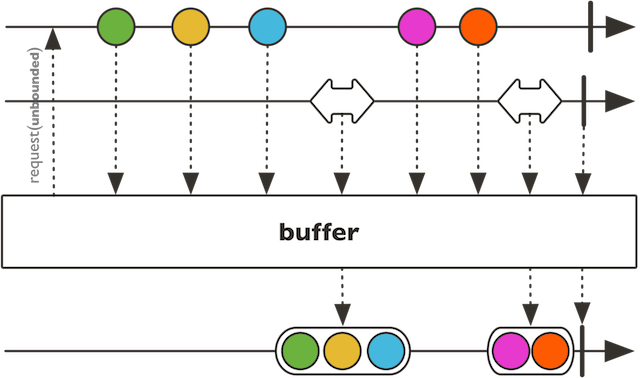
- Type Parameters:
U- the element type of the bucket-opening sequenceV- the element type of the bucket-closing sequence- Parameters:
bucketOpening- aPublisherto subscribe to for creating new receiving bucket signals.closeSelector- aPublisherfactory provided the opening signal and returning aPublisherto subscribe to for emitting relative bucket.- Returns:
- a microbatched
FluxofListdelimited by an openingPublisherand a relative closingPublisher
-
buffer
@Deprecated public final <U,V,C extends Collection<? super T>> Flux<C> buffer(Publisher<U> bucketOpening, Function<? super U,? extends Publisher<V>> closeSelector, Supplier<C> bufferSupplier)
Deprecated. will be removed in 3.1.0. UsebufferWhen(Publisher, Function, Supplier)instead.Collect incoming values into multipleCollectiondelimited by the givenPublishersignals. EachCollectionbucket will last until the mappedPublisherreceiving the boundary signal emits, thus releasing the bucket to the returnedFlux.When Open signal is strictly not overlapping Close signal : dropping buffers

When Open signal is strictly more frequent than Close signal : overlapping buffers

When Open signal is exactly coordinated with Close signal : exact buffers

- Type Parameters:
U- the element type of the bucket-opening sequenceV- the element type of the bucket-closing sequenceC- the suppliedCollectiontype- Parameters:
bucketOpening- aPublisherto subscribe to for creating new receiving bucket signals.closeSelector- aPublisherfactory provided the opening signal and returning aPublisherto subscribe to for emitting relative bucket.bufferSupplier- the collection to use for each data segment- Returns:
- a microbatched
FluxofCollectiondelimited by an openingPublisherand a relative closingPublisher
-
buffer
public final Flux<List<T>> buffer(Duration timespan, Duration timeshift)
Collect incoming values into multipleListdelimited by the giventimeshiftperiod. EachListbucket will last until thetimespanhas elapsed, thus releasing the bucket to the returnedFlux.When timeshift > timespan : dropping buffers
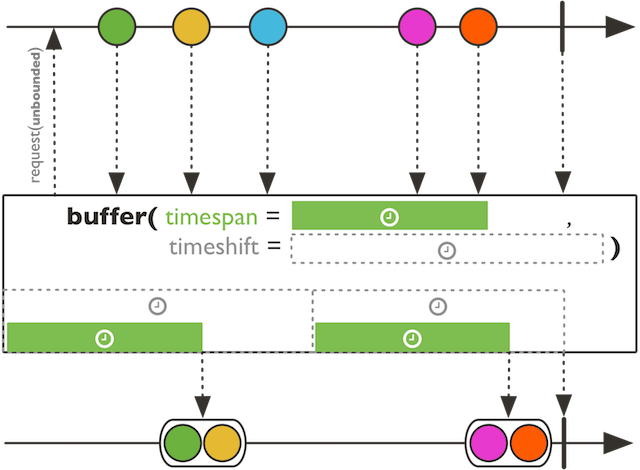
When timeshift < timespan : overlapping buffers
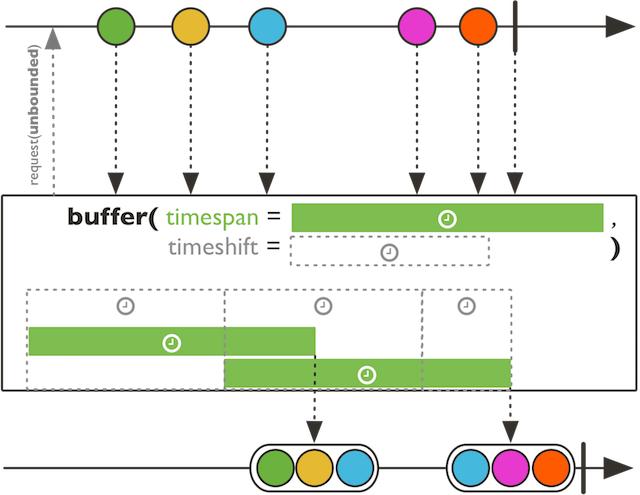
When timeshift == timespan : exact buffers
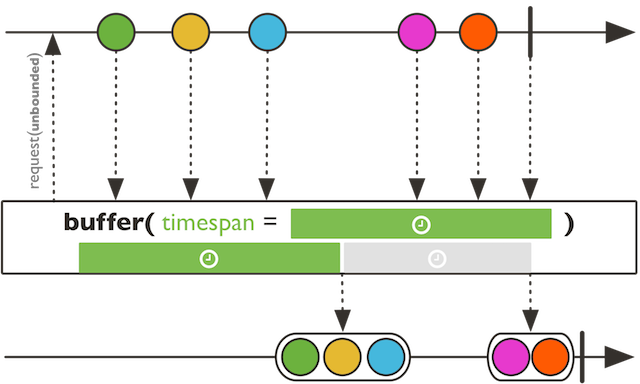
-
buffer
public final Flux<List<T>> buffer(Duration timespan, Duration timeshift, Scheduler timer)
Collect incoming values into multipleListdelimited by the giventimeshiftperiod. EachListbucket will last until thetimespanhas elapsed, thus releasing the bucket to the returnedFlux.When timeshift > timespan : dropping buffers

When timeshift < timespan : overlapping buffers

When timeshift == timespan : exact buffers

-
buffer
@Deprecated public final Flux<List<T>> buffer(int maxSize, Duration timespan)
Deprecated. usebufferTimeout(int, Duration)instead, will be removed in 3.1.0
-
buffer
@Deprecated public final <C extends Collection<? super T>> Flux<C> buffer(int maxSize, Duration timespan, Supplier<C> bufferSupplier)
Deprecated. usebufferTimeout(int, Duration, Supplier)instead, will be removed in 3.1.0Collect incoming values into aCollectionthat will be pushed into the returnedFluxevery timespan OR maxSize items.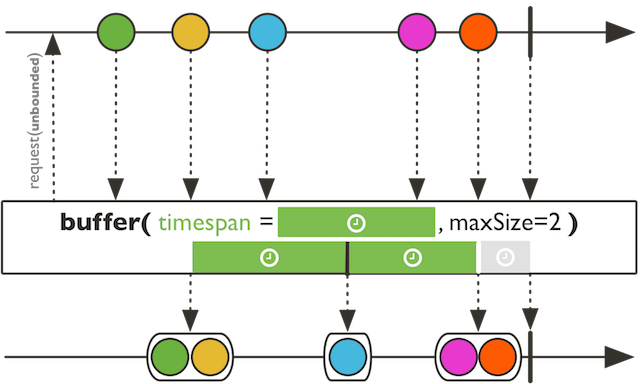
- Type Parameters:
C- the suppliedCollectiontype- Parameters:
maxSize- the max collected sizetimespan- the timeout to use to release a buffered listbufferSupplier- the collection to use for each data segment- Returns:
- a microbatched
FluxofCollectiondelimited by given size or a given period timeout
-
bufferTimeout
public final <C extends Collection<? super T>> Flux<C> bufferTimeout(int maxSize, Duration timespan, Supplier<C> bufferSupplier)
Collect incoming values into aCollectionthat will be pushed into the returnedFluxevery timespan OR maxSize items.
- Type Parameters:
C- the suppliedCollectiontype- Parameters:
maxSize- the max collected sizetimespan- the timeout to use to release a buffered listbufferSupplier- the collection to use for each data segment- Returns:
- a microbatched
FluxofCollectiondelimited by given size or a given period timeout
-
bufferTimeout
public final Flux<List<T>> bufferTimeout(int maxSize, Duration timespan, Scheduler timer)
-
bufferTimeout
public final <C extends Collection<? super T>> Flux<C> bufferTimeout(int maxSize, Duration timespan, Scheduler timer, Supplier<C> bufferSupplier)
Collect incoming values into aCollectionthat will be pushed into the returnedFluxevery timespan OR maxSize items
- Type Parameters:
C- the suppliedCollectiontype- Parameters:
maxSize- the max collected sizetimespan- the timeout to use to release a buffered collectiontimer- a time-capableSchedulerinstance to run onbufferSupplier- the collection to use for each data segment- Returns:
- a microbatched
FluxofCollectiondelimited by given size or a given period timeout
-
bufferMillis
@Deprecated public final Flux<List<T>> bufferMillis(long timespan)
Deprecated. use theDurationbased variants instead, will be removed in 3.1.0
-
bufferMillis
@Deprecated public final Flux<List<T>> bufferMillis(long timespan, TimedScheduler timer)
Deprecated. use theDurationbased variants instead, will be removed in 3.1.0
-
bufferMillis
@Deprecated public final Flux<List<T>> bufferMillis(long timespan, long timeshift)
Deprecated. use theDurationbased variants instead, will be removed in 3.1.0Collect incoming values into multipleListdelimited by the giventimeshiftperiod. EachListbucket will last until thetimespanhas elapsed, thus releasing the bucket to the returnedFlux.When timeshift > timespan : dropping buffers

When timeshift < timespan : overlapping buffers

When timeshift == timespan : exact buffers

-
bufferMillis
@Deprecated public final Flux<List<T>> bufferMillis(long timespan, long timeshift, TimedScheduler timer)
Deprecated. use theDurationbased variants instead, will be removed in 3.1.0Collect incoming values into multipleListdelimited by the giventimeshiftperiod. EachListbucket will last until thetimespanhas elapsed, thus releasing the bucket to the returnedFlux.When timeshift > timespan : dropping buffers

When timeshift < timespan : overlapping buffers

When timeshift == timespan : exact buffers

-
bufferMillis
@Deprecated public final Flux<List<T>> bufferMillis(int maxSize, long timespan)
Deprecated. usebufferTimeout(int, Duration)instead, will be removed in 3.1.0
-
bufferMillis
@Deprecated public final Flux<List<T>> bufferMillis(int maxSize, long timespan, TimedScheduler timer)
Deprecated. usebufferTimeout(int, Duration, Scheduler)instead, will be removed in 3.1.0
-
bufferMillis
@Deprecated public final <C extends Collection<? super T>> Flux<C> bufferMillis(int maxSize, long timespan, TimedScheduler timer, Supplier<C> bufferSupplier)
Deprecated. usebufferTimeout(int, Duration, Scheduler, Supplier)instead, will be removed in 3.1.0Collect incoming values into aCollectionthat will be pushed into the returnedFluxevery timespan OR maxSize items
- Type Parameters:
C- the suppliedCollectiontype- Parameters:
maxSize- the max collected sizetimespan- the timeout to use to release a buffered collectiontimer- a time-capableSchedulerinstance to run onbufferSupplier- the collection to use for each data segment- Returns:
- a microbatched
FluxofCollectiondelimited by given size or a given period timeout
-
bufferTimeoutMillis
@Deprecated public final Flux<List<T>> bufferTimeoutMillis(int maxSize, long timespan)
Deprecated. use theDurationbased variants instead, will be removed in 3.1.0
-
bufferTimeoutMillis
@Deprecated public final Flux<List<T>> bufferTimeoutMillis(int maxSize, long timespan, TimedScheduler timer)
Deprecated. use theDurationbased variants instead, will be removed in 3.1.0
-
bufferTimeoutMillis
@Deprecated public final <C extends Collection<? super T>> Flux<C> bufferTimeoutMillis(int maxSize, long timespan, TimedScheduler timer, Supplier<C> bufferSupplier)
Deprecated. use theDurationbased variants instead, will be removed in 3.1.0Collect incoming values into aCollectionthat will be pushed into the returnedFluxevery timespan OR maxSize items
- Type Parameters:
C- the suppliedCollectiontype- Parameters:
maxSize- the max collected sizetimespan- the timeout to use to release a buffered collectiontimer- a time-capableSchedulerinstance to run onbufferSupplier- the collection to use for each data segment- Returns:
- a microbatched
FluxofCollectiondelimited by given size or a given period timeout
-
bufferUntil
public final Flux<List<T>> bufferUntil(Predicate<? super T> predicate)
Collect incoming values into multipleListthat will be pushed into the returnedFluxeach time the given predicate returns true. Note that the element that triggers the predicate to return true (and thus closes a buffer) is included as last element in the emitted buffer.
On completion, if the latest buffer is non-empty and has not been closed it is emitted. However, such a "partial" buffer isn't emitted in case of onError termination.
-
bufferUntil
public final Flux<List<T>> bufferUntil(Predicate<? super T> predicate, boolean cutBefore)
Collect incoming values into multipleListthat will be pushed into the returnedFluxeach time the given predicate returns true. Note that the buffer into which the element that triggers the predicate to return true (and thus closes a buffer) is included depends on thecutBeforeparameter: set it to true to include the boundary element in the newly opened buffer, false to include it in the closed buffer (as inbufferUntil(Predicate)).
On completion, if the latest buffer is non-empty and has not been closed it is emitted. However, such a "partial" buffer isn't emitted in case of onError termination.
-
bufferWhile
public final Flux<List<T>> bufferWhile(Predicate<? super T> predicate)
Collect incoming values into multipleListthat will be pushed into the returnedFlux. Each buffer continues aggregating values while the given predicate returns true, and a new buffer is created as soon as the predicate returns false... Note that the element that triggers the predicate to return false (and thus closes a buffer) is NOT included in any emitted buffer.
On completion, if the latest buffer is non-empty and has not been closed it is emitted. However, such a "partial" buffer isn't emitted in case of onError termination.
-
bufferWhen
public final <U,V> Flux<List<T>> bufferWhen(Publisher<U> bucketOpening, Function<? super U,? extends Publisher<V>> closeSelector)
Collect incoming values into multipleListbuffers started each time an opening companionPublisheremits. Each buffer will last until the corresponding closing companionPublisheremits, thus releasing the buffer to the resultingFlux.When Open signal is strictly not overlapping Close signal : dropping buffers

When Open signal is strictly more frequent than Close signal : overlapping buffers

When Open signal is exactly coordinated with Close signal : exact buffers

- Type Parameters:
U- the element type of the buffer-opening sequenceV- the element type of the buffer-closing sequence- Parameters:
bucketOpening- a companionPublisherto subscribe for buffer creation signals.closeSelector- a factory that, given a buffer opening signal, returns a companionPublisherto subscribe to for buffer closure and emission signals.- Returns:
- a microbatched
FluxofListdelimited by an openingPublisherand a relative closingPublisher
-
bufferWhen
public final <U,V,C extends Collection<? super T>> Flux<C> bufferWhen(Publisher<U> bucketOpening, Function<? super U,? extends Publisher<V>> closeSelector, Supplier<C> bufferSupplier)
Collect incoming values into multiple user-definedCollectionbuffers started each time an opening companionPublisheremits. Each buffer will last until the corresponding closing companionPublisheremits, thus releasing the buffer to the resultingFlux.When Open signal is strictly not overlapping Close signal : dropping buffers

When Open signal is strictly more frequent than Close signal : overlapping buffers

When Open signal is exactly coordinated with Close signal : exact buffers

- Type Parameters:
U- the element type of the buffer-opening sequenceV- the element type of the buffer-closing sequenceC- theCollectionbuffer type- Parameters:
bucketOpening- a companionPublisherto subscribe for buffer creation signals.closeSelector- a factory that, given a buffer opening signal, returns a companionPublisherto subscribe to for buffer closure and emission signals.bufferSupplier- aSupplierof the concreteCollectionto use for each buffer- Returns:
- a microbatched
FluxofCollectiondelimited by an openingPublisherand a relative closingPublisher
-
cache
public final Flux<T> cache()
Turn thisFluxinto a hot source and cache last emitted signals for furtherSubscriber. Will retain up an unbounded volume of onNext signals. Completion and Error will also be replayed.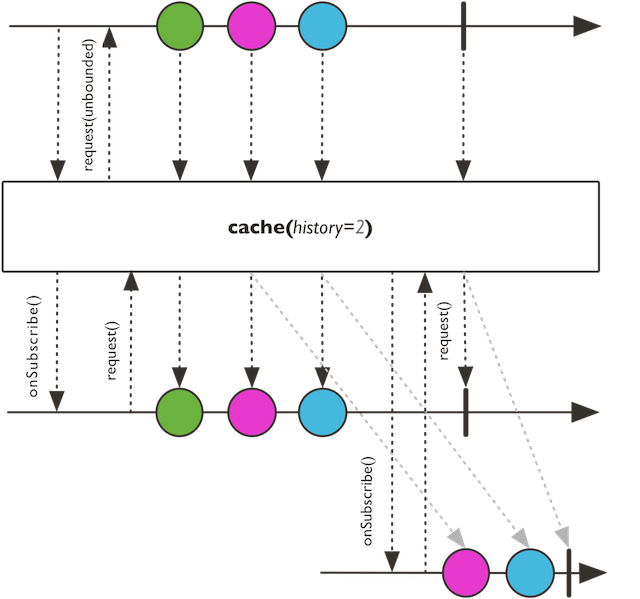
- Returns:
- a replaying
Flux
-
cache
public final Flux<T> cache(int history)
Turn thisFluxinto a hot source and cache last emitted signals for furtherSubscriber. Will retain up to the given history size onNext signals. Completion and Error will also be replayed.
- Parameters:
history- number of events retained in history excluding complete and error- Returns:
- a replaying
Flux
-
cache
public final Flux<T> cache(Duration ttl)
Turn thisFluxinto a hot source and cache last emitted signals for furtherSubscriber. Will retain an unbounded history with per-item expiry timeout Completion and Error will also be replayed.
- Parameters:
ttl- Time-to-live for each cached item.- Returns:
- a replaying
Flux
-
cache
public final Flux<T> cache(int history, Duration ttl)
Turn thisFluxinto a hot source and cache last emitted signals for furtherSubscriber. Will retain up to the given history size with per-item expiry timeout.
- Parameters:
history- number of events retained in history excluding complete and errorttl- Time-to-live for each cached item.- Returns:
- a replaying
Flux
-
cast
public final <E> Flux<E> cast(Class<E> clazz)
Cast the currentFluxproduced type into a target produced type.
-
checkpoint
public final Flux<T> checkpoint()
Activate assembly tracing for this particularFlux, in case of an error upstream of the checkpoint.It should be placed towards the end of the reactive chain, as errors triggered downstream of it cannot be observed and augmented with assembly trace.
- Returns:
- the assembly tracing
Flux.
-
checkpoint
public final Flux<T> checkpoint(String description)
Activate assembly tracing for this particularFluxand give it a description that will be reflected in the assembly traceback in case of an error upstream of the checkpoint.It should be placed towards the end of the reactive chain, as errors triggered downstream of it cannot be observed and augmented with assembly trace.
The description could for example be a meaningful name for the assembled flux or a wider correlation ID.
- Parameters:
description- a description to include in the assembly traceback.- Returns:
- the assembly tracing
Flux.
-
collect
public final <E> Mono<E> collect(Supplier<E> containerSupplier, BiConsumer<E,? super T> collector)
Collect theFluxsequence with the given collector and supplied container on subscribe. The collected result will be emitted when this sequence completes.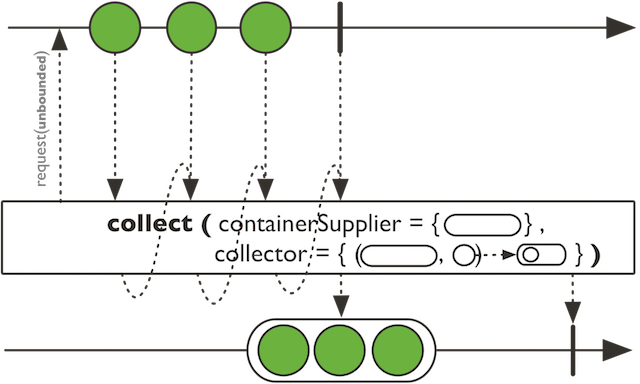
-
collect
public final <R,A> Mono<R> collect(Collector<? super T,A,? extends R> collector)
Collect theFluxsequence with the given collector and supplied container on subscribe. The collected result will be emitted when this sequence completes.
-
collectMap
public final <K> Mono<Map<K,T>> collectMap(Function<? super T,? extends K> keyExtractor)
Convert all thisFluxsequence into a hashed map where the key is extracted by the givenFunctionand the value will be the most recent emitted item for this key.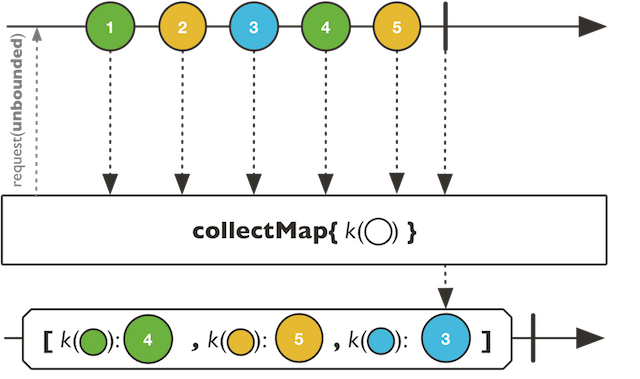
- Type Parameters:
K- the key extracted from each value of this Flux instance- Parameters:
keyExtractor- aFunctionto route items into a keyedCollection- Returns:
- a
Monoof all last matched key-values from thisFlux
-
collectMap
public final <K,V> Mono<Map<K,V>> collectMap(Function<? super T,? extends K> keyExtractor, Function<? super T,? extends V> valueExtractor)
Convert all thisFluxsequence into a hashed map where the key is extracted by the given function and the value will be the most recent extracted item for this key.
- Type Parameters:
K- the key extracted from each value of this Flux instanceV- the value extracted from each value of this Flux instance- Parameters:
keyExtractor- aFunctionto route items into a keyedCollectionvalueExtractor- aFunctionto select the data to store from each item- Returns:
- a
Monoof all last matched key-values from thisFlux
-
collectMap
public final <K,V> Mono<Map<K,V>> collectMap(Function<? super T,? extends K> keyExtractor, Function<? super T,? extends V> valueExtractor, Supplier<Map<K,V>> mapSupplier)
Convert all thisFluxsequence into a supplied map where the key is extracted by the given function and the value will be the most recent extracted item for this key.
- Type Parameters:
K- the key extracted from each value of this Flux instanceV- the value extracted from each value of this Flux instance- Parameters:
keyExtractor- aFunctionto route items into a keyedCollectionvalueExtractor- aFunctionto select the data to store from each itemmapSupplier- aMapfactory called for eachSubscriber- Returns:
- a
Monoof all last matched key-values from thisFlux
-
collectMultimap
public final <K> Mono<Map<K,Collection<T>>> collectMultimap(Function<? super T,? extends K> keyExtractor)
Convert thisFluxsequence into a hashed map where the key is extracted by the given function and the value will be all the emitted item for this key.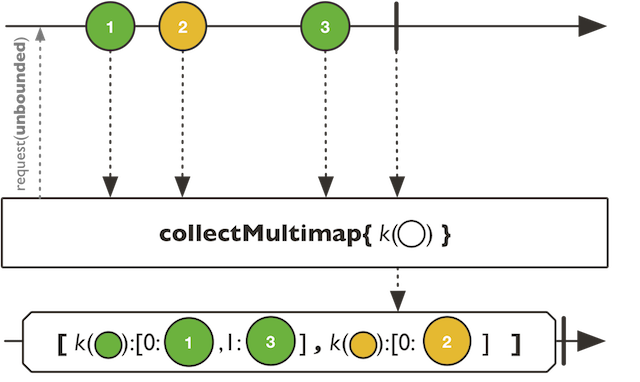
- Type Parameters:
K- the key extracted from each value of this Flux instance- Parameters:
keyExtractor- aFunctionto route items into a keyedCollection- Returns:
- a
Monoof all matched key-values from thisFlux
-
collectMultimap
public final <K,V> Mono<Map<K,Collection<V>>> collectMultimap(Function<? super T,? extends K> keyExtractor, Function<? super T,? extends V> valueExtractor)
Convert thisFluxsequence into a hashed map where the key is extracted by the given function and the value will be all the extracted items for this key.
- Type Parameters:
K- the key extracted from each value of this Flux instanceV- the value extracted from each value of this Flux instance- Parameters:
keyExtractor- aFunctionto route items into a keyedCollectionvalueExtractor- aFunctionto select the data to store from each item- Returns:
- a
Monoof all matched key-values from thisFlux
-
collectMultimap
public final <K,V> Mono<Map<K,Collection<V>>> collectMultimap(Function<? super T,? extends K> keyExtractor, Function<? super T,? extends V> valueExtractor, Supplier<Map<K,Collection<V>>> mapSupplier)
Convert thisFluxsequence into a supplied map where the key is extracted by the given function and the value will be all the extracted items for this key.
- Type Parameters:
K- the key extracted from each value of this Flux instanceV- the value extracted from each value of this Flux instance- Parameters:
keyExtractor- aFunctionto route items into a keyedCollectionvalueExtractor- aFunctionto select the data to store from each itemmapSupplier- aMapfactory called for eachSubscriber- Returns:
- a
Monoof all matched key-values from thisFlux
-
collectSortedList
public final Mono<List<T>> collectSortedList(Comparator<? super T> comparator)
Accumulate and sort using the given comparator thisFluxsequence in aListthat is emitted to the returnedMonoon onComplete.
- Parameters:
comparator- aComparatorto sort the items of this sequences- Returns:
- a
Monoof all sorted values from thisFlux
-
compose
public final <V> Flux<V> compose(Function<? super Flux<T>,? extends Publisher<V>> transformer)
Defer the transformation of thisFluxin order to generate a targetFluxfor each newSubscriber.flux.compose(Mono::from).subscribe()- Type Parameters:
V- the item type in the returnedPublisher- Parameters:
transformer- theFunctionto map thisFluxinto a targetPublisherinstance for each new subscriber- Returns:
- a new
Flux - See Also:
for immmediate transformation of {@link Flux},for a loose conversion to an arbitrary type
-
concatMap
public final <V> Flux<V> concatMap(Function<? super T,? extends Publisher<? extends V>> mapper)
Bind dynamic sequences given this input sequence likeflatMap(Function), but preserve ordering and concatenate emissions instead of merging (no interleave). Errors will immediately short circuit current concat backlog.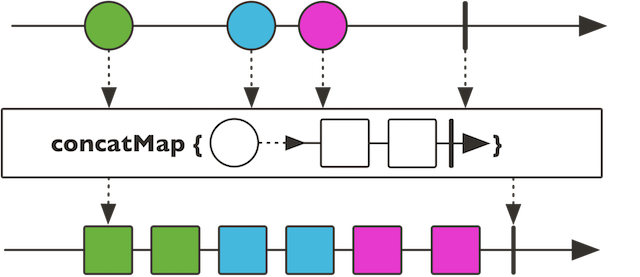
- Type Parameters:
V- the produced concatenated type- Parameters:
mapper- the function to transform this sequence of T into concatenated sequences of V- Returns:
- a concatenated
Flux
-
concatMap
public final <V> Flux<V> concatMap(Function<? super T,? extends Publisher<? extends V>> mapper, int prefetch)
Bind dynamic sequences given this input sequence likeflatMap(Function), but preserve ordering and concatenate emissions instead of merging (no interleave). Errors will immediately short circuit current concat backlog.
- Type Parameters:
V- the produced concatenated type- Parameters:
mapper- the function to transform this sequence of T into concatenated sequences of Vprefetch- the inner source produced demand- Returns:
- a concatenated
Flux
-
concatMapDelayError
public final <V> Flux<V> concatMapDelayError(Function<? super T,Publisher<? extends V>> mapper)
Bind dynamic sequences given this input sequence likeflatMap(Function), but preserve ordering and concatenate emissions instead of merging (no interleave). Errors will be delayed after the current concat backlog.
- Type Parameters:
V- the produced concatenated type- Parameters:
mapper- the function to transform this sequence of T into concatenated sequences of V- Returns:
- a concatenated
Flux
-
concatMapDelayError
public final <V> Flux<V> concatMapDelayError(Function<? super T,? extends Publisher<? extends V>> mapper, int prefetch)
Bind dynamic sequences given this input sequence likeflatMap(Function), but preserve ordering and concatenate emissions instead of merging (no interleave). Errors will be delayed after all concated sources terminate.
- Type Parameters:
V- the produced concatenated type- Parameters:
mapper- the function to transform this sequence of T into concatenated sequences of Vprefetch- the inner source produced demand- Returns:
- a concatenated
Flux
-
concatMapDelayError
public final <V> Flux<V> concatMapDelayError(Function<? super T,? extends Publisher<? extends V>> mapper, boolean delayUntilEnd, int prefetch)
Bind dynamic sequences given this input sequence likeflatMap(Function), but preserve ordering and concatenate emissions instead of merging (no interleave). Errors will be delayed after the current concat backlog if delayUntilEnd is false or after all sources if delayUntilEnd is true.
- Type Parameters:
V- the produced concatenated type- Parameters:
mapper- the function to transform this sequence of T into concatenated sequences of VdelayUntilEnd- delay error until all sources have been consumed instead of after the current sourceprefetch- the inner source produced demand- Returns:
- a concatenated
Flux
-
concatMapIterable
public final <R> Flux<R> concatMapIterable(Function<? super T,? extends Iterable<? extends R>> mapper)
Transform the items emitted by thisFluxintoIterable, then flatten the elements from those by concatening them into a singleFlux.
Note that unlike
flatMap(Function)andconcatMap(Function), with Iterable there is no notion of eager vs lazy inner subscription. The content of the Iterables are all played sequentially. ThusflatMapIterableandconcatMapIterableare equivalent offered as a discoverability improvement for users that explore the API with the concat vs flatMap expectation.
-
concatMapIterable
public final <R> Flux<R> concatMapIterable(Function<? super T,? extends Iterable<? extends R>> mapper, int prefetch)
Transform the items emitted by thisFluxintoIterable, then flatten the emissions from those by concatening them into a singleFlux. The prefetch argument allows to give an arbitrary prefetch size to the mergedIterable.
Note that unlike
flatMap(Function)andconcatMap(Function), with Iterable there is no notion of eager vs lazy inner subscription. The content of the Iterables are all played sequentially. ThusflatMapIterableandconcatMapIterableare equivalent offered as a discoverability improvement for users that explore the API with the concat vs flatMap expectation.- Type Parameters:
R- the merged output sequence type- Parameters:
mapper- theFunctionto transform input sequence into NIterableprefetch- the maximum in-flight elements from each innerIterablesequence- Returns:
- a concatenation of the values from the Iterables obtained from each element in this
Flux
-
count
public final Mono<Long> count()
Counts the number of values in thisFlux. The count will be emitted when onComplete is observed.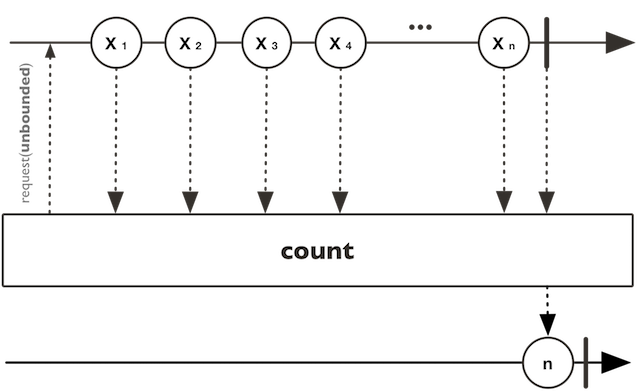
-
defaultIfEmpty
public final Flux<T> defaultIfEmpty(T defaultV)
Provide a default unique value if this sequence is completed without any data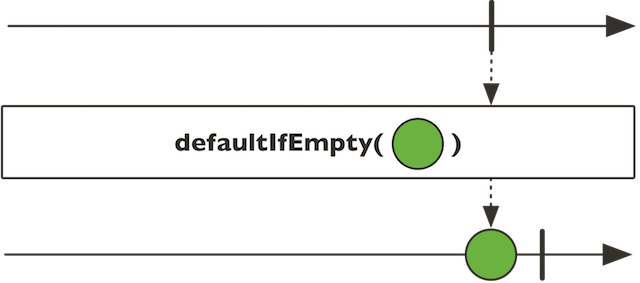
- Parameters:
defaultV- the alternate value if this sequence is empty- Returns:
- a new
Flux
-
delay
@Deprecated public final Flux<T> delay(Duration delay)
Deprecated. will be replaced bydelayElements(Duration)in 3.1.0- Parameters:
delay- duration to delay eachSubscriber.onNext(T)signal- Returns:
- a delayed
Flux - See Also:
delaySubscription to introduce a delay at the beginning of the sequence only
-
delayElements
public final Flux<T> delayElements(Duration delay)
- Parameters:
delay- duration to delay eachSubscriber.onNext(T)signal- Returns:
- a delayed
Flux - See Also:
delaySubscription to introduce a delay at the beginning of the sequence only
-
delayElements
public final Flux<T> delayElements(Duration delay, Scheduler timer)
Delay each of thisFluxelements (Subscriber.onNext(T)signals) by a givenDuration. Signals are delayed and played on theparalleldefault Scheduler.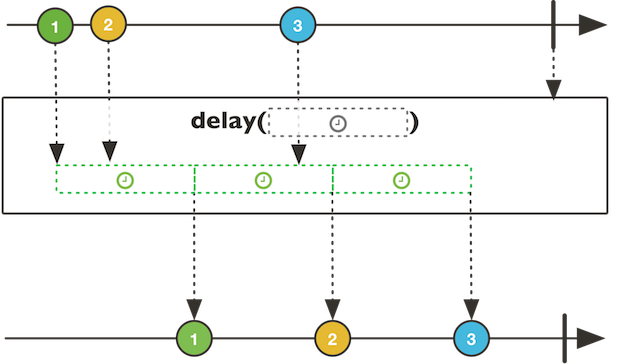
- Parameters:
delay- period to delay eachSubscriber.onNext(T)signaltimer- a time-capableSchedulerinstance to delay each signal on- Returns:
- a delayed
Flux
-
delayMillis
@Deprecated public final Flux<T> delayMillis(long delay)
Deprecated. will be replaced bydelayElements(Duration)in 3.1.0Delay each of thisFluxelements (Subscriber.onNext(T)signals) by a given duration in milliseconds.
- Parameters:
delay- period to delay eachSubscriber.onNext(T)signal, in milliseconds- Returns:
- a delayed
Flux
-
delayElementsMillis
@Deprecated public final Flux<T> delayElementsMillis(long delay)
Deprecated. use theDurationbased variants instead, will be removed in 3.1.0Delay each of thisFluxelements (Subscriber.onNext(T)signals) by a given duration in milliseconds.
- Parameters:
delay- period to delay eachSubscriber.onNext(T)signal, in milliseconds- Returns:
- a delayed
Flux
-
delayMillis
@Deprecated public final Flux<T> delayMillis(long delay, TimedScheduler timer)
Deprecated. will be replaced bydelayElements(Duration, Scheduler)in 3.1.0Delay each of thisFluxelements (Subscriber.onNext(T)signals) by a given duration in milliseconds.
- Parameters:
delay- period to delay eachSubscriber.onNext(T)signal, in millisecondstimer- a time-capableSchedulerinstance to delay each signal on- Returns:
- a delayed
Flux
-
delayElementsMillis
@Deprecated public final Flux<T> delayElementsMillis(long delay, TimedScheduler timer)
Deprecated. use theDurationbased variants instead, will be removed in 3.1.0Delay each of thisFluxelements (Subscriber.onNext(T)signals) by a given duration in milliseconds.
- Parameters:
delay- period to delay eachSubscriber.onNext(T)signal, in millisecondstimer- a time-capableSchedulerinstance to delay each signal on- Returns:
- a delayed
Flux
-
delaySubscription
public final Flux<T> delaySubscription(Duration delay)
Delay thesubscriptionto thisFluxsource until the given period elapses. The delay is introduced through theparalleldefault Scheduler.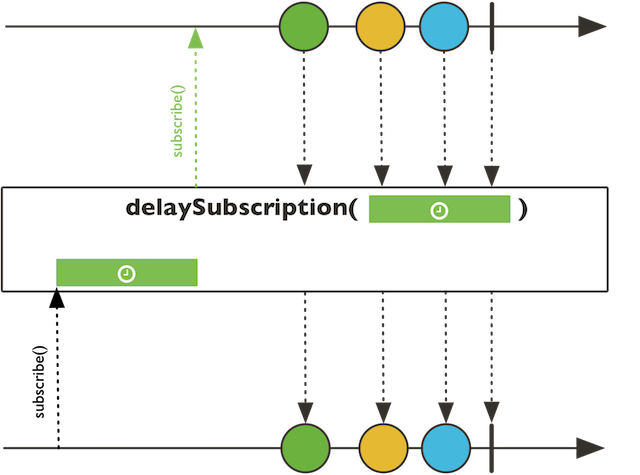
-
delaySubscription
public final <U> Flux<T> delaySubscription(Publisher<U> subscriptionDelay)
Delay the subscription to the main source until another Publisher signals a value or completes.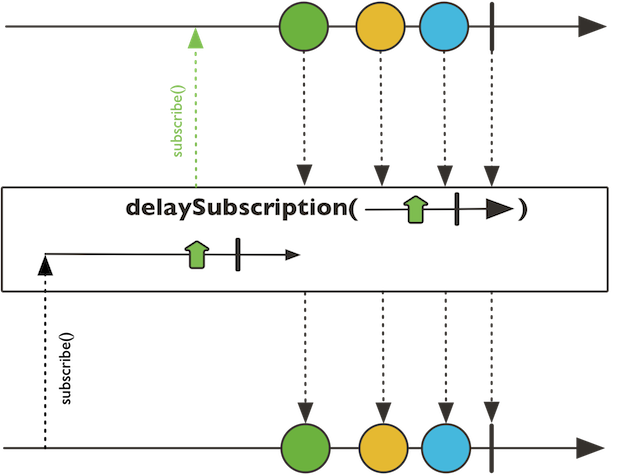
- Type Parameters:
U- the other source type- Parameters:
subscriptionDelay- aPublisherto signal by next or complete thisPublisher.subscribe(Subscriber)- Returns:
- a delayed
Flux
-
delaySubscriptionMillis
@Deprecated public final Flux<T> delaySubscriptionMillis(long delay)
Deprecated. use theDurationbased variants instead, will be removed in 3.1.0Delay thesubscriptionto thisFluxsource until the given period elapses. The delay is introduced through theparalleldefault Scheduler.
-
delaySubscriptionMillis
@Deprecated public final Flux<T> delaySubscriptionMillis(long delay, TimedScheduler timer)
Deprecated. use theDurationbased variants instead, will be removed in 3.1.0
-
dematerialize
public final <X> Flux<X> dematerialize()
A "phantom-operator" working only if thisFluxis a emits onNext, onError or onCompleteSignal. The relativeSubscribercallback will be invoked, errorSignalwill trigger onError and completeSignalwill trigger onComplete.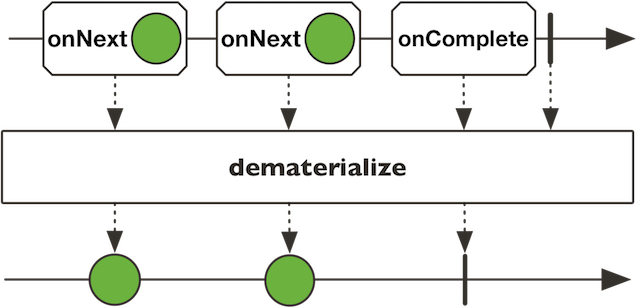
- Type Parameters:
X- the dematerialized type- Returns:
- a dematerialized
Flux
-
distinct
public final <V> Flux<T> distinct(Function<? super T,? extends V> keySelector)
For eachSubscriber, tracks thisFluxvalues that have been seen and filters out duplicates given the extracted key.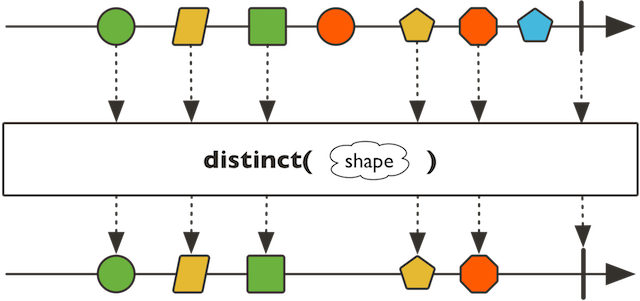
- Type Parameters:
V- the type of the key extracted from each value in this sequence- Parameters:
keySelector- function to compute comparison key for each element- Returns:
- a filtering
Fluxwith values having distinct keys
-
distinctUntilChanged
public final Flux<T> distinctUntilChanged()
Filters out subsequent and repeated elements.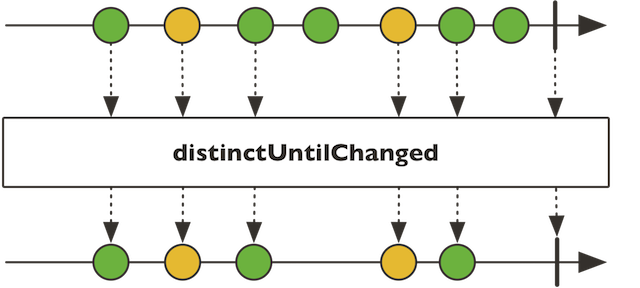
- Returns:
- a filtering
Fluxwith conflated repeated elements
-
distinctUntilChanged
public final <V> Flux<T> distinctUntilChanged(Function<? super T,? extends V> keySelector)
Filters out subsequent and repeated elements provided a matching extracted key.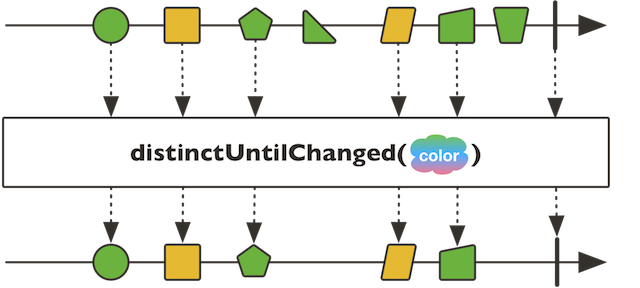
- Type Parameters:
V- the type of the key extracted from each value in this sequence- Parameters:
keySelector- function to compute comparison key for each element- Returns:
- a filtering
Fluxwith conflated repeated elements given a comparison key
-
doAfterTerminate
public final Flux<T> doAfterTerminate(Runnable afterTerminate)
Triggered after theFluxterminates, either by completing downstream successfully or with an error.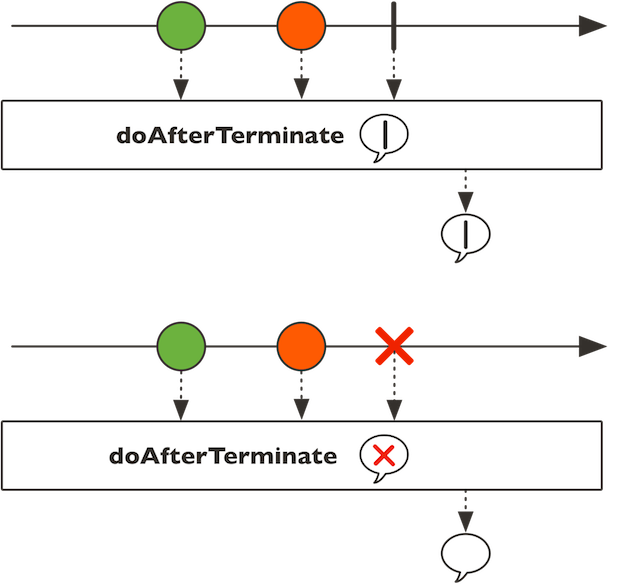
- Parameters:
afterTerminate- the callback to call afterSubscriber.onComplete()orSubscriber.onError(java.lang.Throwable)- Returns:
- an observed
Flux
-
doOnCancel
public final Flux<T> doOnCancel(Runnable onCancel)
Triggered when theFluxis cancelled.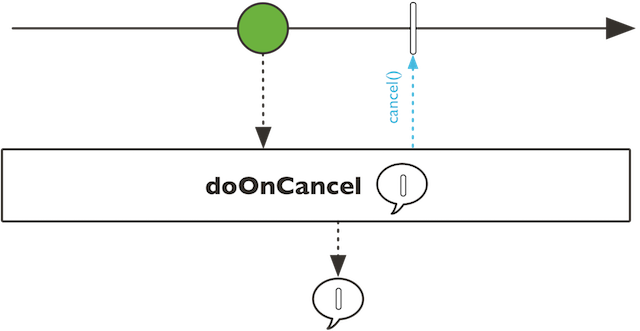
- Parameters:
onCancel- the callback to call onSubscription.cancel()- Returns:
- an observed
Flux
-
doOnComplete
public final Flux<T> doOnComplete(Runnable onComplete)
Triggered when theFluxcompletes successfully.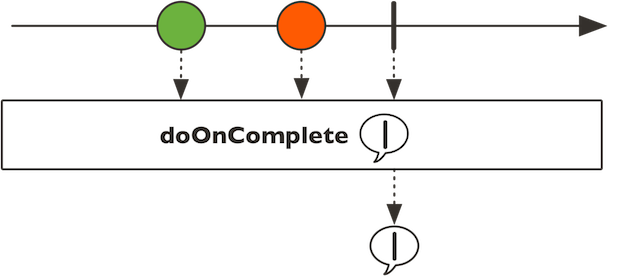
- Parameters:
onComplete- the callback to call onSubscriber.onComplete()- Returns:
- an observed
Flux
-
doOnEach
public final Flux<T> doOnEach(Consumer<? super Signal<T>> signalConsumer)
Triggers side-effects when theFluxemits an item, fails with an error or completes successfully. All these events are represented as aSignalthat is passed to the side-effect callback. Note that this is an advanced operator, typically used for monitoring of a Flux.- Parameters:
signalConsumer- the mandatory callback to call onSubscriber.onNext(Object),Subscriber.onError(Throwable)andSubscriber.onComplete()- Returns:
- an observed
Flux - See Also:
doOnNext(Consumer),doOnError(Consumer),doOnComplete(Runnable),materialize(),Signal
-
doOnError
public final Flux<T> doOnError(Consumer<? super Throwable> onError)
Triggered when theFluxcompletes with an error.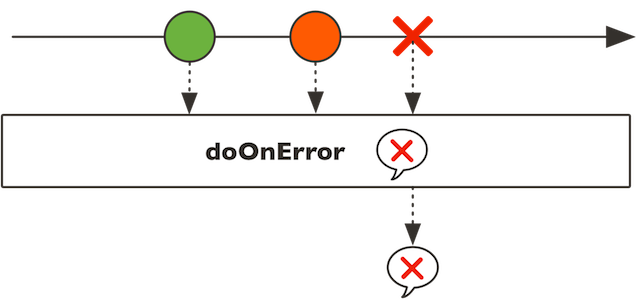
- Parameters:
onError- the callback to call onSubscriber.onError(java.lang.Throwable)- Returns:
- an observed
Flux
-
doOnError
public final <E extends Throwable> Flux<T> doOnError(Class<E> exceptionType, Consumer<? super E> onError)
Triggered when theFluxcompletes with an error matching the given exception type.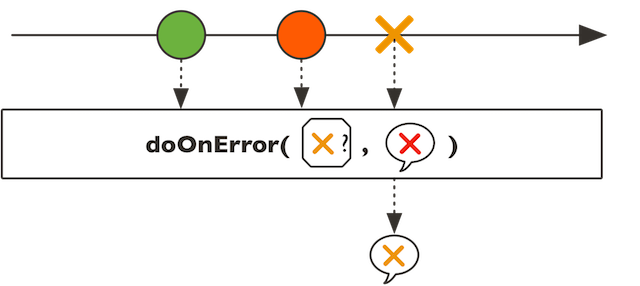
- Type Parameters:
E- type of the error to handle- Parameters:
exceptionType- the type of exceptions to handleonError- the error handler for each error- Returns:
- an observed
Flux
-
doOnError
public final Flux<T> doOnError(Predicate<? super Throwable> predicate, Consumer<? super Throwable> onError)
Triggered when theFluxcompletes with an error matching the given exception.
- Parameters:
predicate- the matcher for exceptions to handleonError- the error handler for each error- Returns:
- an observed
Flux
-
doOnNext
public final Flux<T> doOnNext(Consumer<? super T> onNext)
Triggered when theFluxemits an item.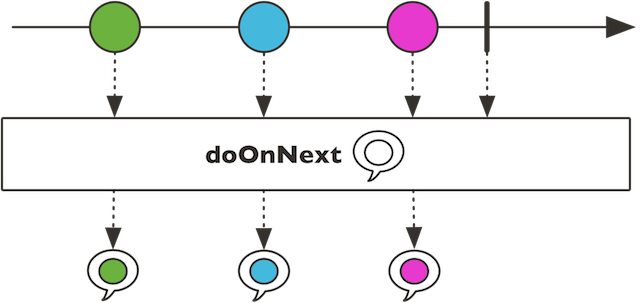
- Parameters:
onNext- the callback to call onSubscriber.onNext(T)- Returns:
- an observed
Flux
-
doOnRequest
public final Flux<T> doOnRequest(LongConsumer consumer)
- Parameters:
consumer- the consumer to invoke on each request- Returns:
- an observed
Flux
-
doOnSubscribe
public final Flux<T> doOnSubscribe(Consumer<? super Subscription> onSubscribe)
Triggered when theFluxis subscribed.
- Parameters:
onSubscribe- the callback to call onSubscriber.onSubscribe(org.reactivestreams.Subscription)- Returns:
- an observed
Flux
-
doOnTerminate
public final Flux<T> doOnTerminate(Runnable onTerminate)
Triggered when theFluxterminates, either by completing successfully or with an error.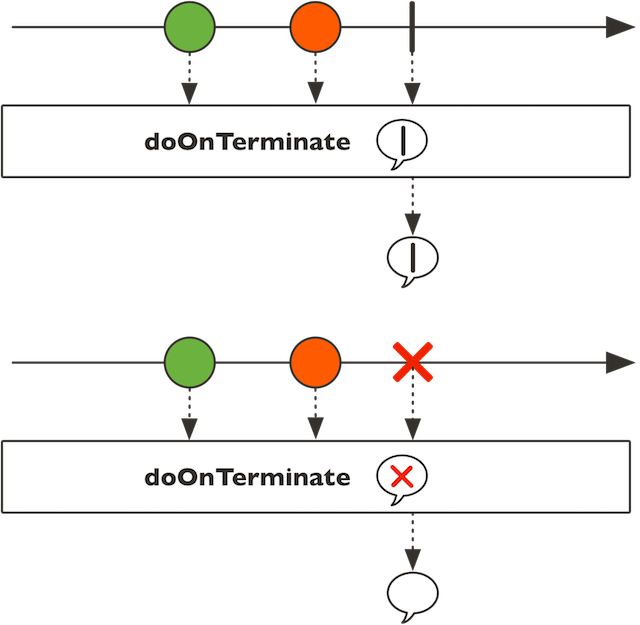
- Parameters:
onTerminate- the callback to call onSubscriber.onComplete()orSubscriber.onError(java.lang.Throwable)- Returns:
- an observed
Flux
-
doFinally
public final Flux<T> doFinally(Consumer<SignalType> onFinally)
Triggering aftertheFluxterminates for any reason, including cancellation. The terminating event (SignalType.ON_COMPLETE,SignalType.ON_ERRORandSignalType.CANCEL) is passed to the consumer, which is executed after the signal has been passed downstream.Note that the fact that the signal is propagated downstream before the callback is executed means that several doFinally in a row will be executed in reverse order. If you want to assert the execution of the callback please keep in mind that the Flux will complete before it is executed, so its effect might not be visible immediately after eg. a
blockLast().- Parameters:
onFinally- the callback to execute after a terminal signal (complete, error or cancel)- Returns:
- an observed
Flux
-
elapsed
public final Flux<Tuple2<Long,T>> elapsed()
Map thisFluxsequence intoTuple2of T1Longtimemillis and T2Tassociated data. The timemillis corresponds to the elapsed time between the subscribe and the first next signal OR between two next signals.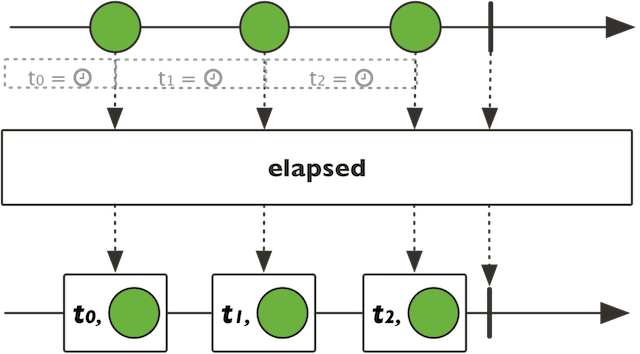
- Returns:
- a transforming
Fluxthat emits tuples of time elapsed in milliseconds and matching data
-
elapsed
@Deprecated public final Flux<Tuple2<Long,T>> elapsed(TimedScheduler scheduler)
Deprecated. useelapsed(Scheduler)Map thisFluxsequence intoTuple2of T1Longtimemillis and T2Tassociated data. The timemillis corresponds to the elapsed time between the subscribe and the first next signal OR between two next signals.
- Parameters:
scheduler- aSchedulerinstance toread time from- Returns:
- a transforming
Fluxthat emits tuples of time elapsed in milliseconds and matching data
-
elapsed
public final Flux<Tuple2<Long,T>> elapsed(Scheduler scheduler)
Map thisFluxsequence intoTuple2of T1Longtimemillis and T2Tassociated data. The timemillis corresponds to the elapsed time between the subscribe and the first next signal OR between two next signals.
- Parameters:
scheduler- aSchedulerinstance toread time from- Returns:
- a transforming
Fluxthat emits tuples of time elapsed in milliseconds and matching data
-
elementAt
public final Mono<T> elementAt(int index)
Emit only the element at the given index position orIndexOutOfBoundsExceptionif the sequence is shorter.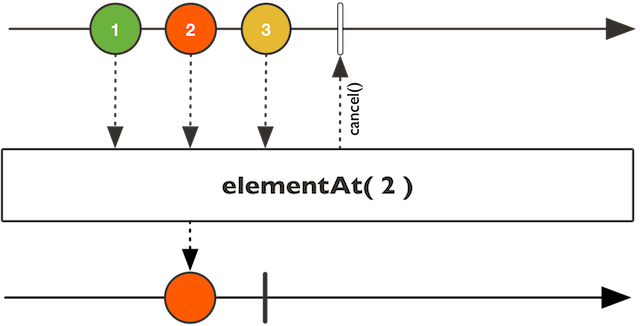
- Parameters:
index- index of an item- Returns:
- a
Monoof the item at a specified index
-
elementAt
public final Mono<T> elementAt(int index, T defaultValue)
Emit only the element at the given index position or signals a default value if specified if the sequence is shorter.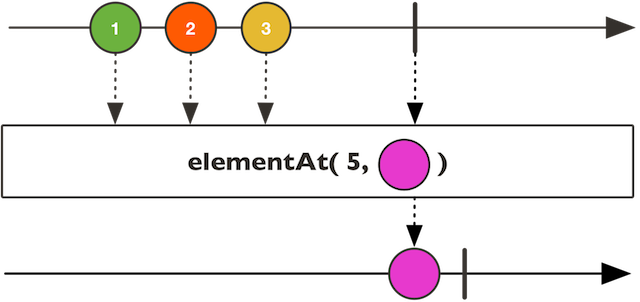
- Parameters:
index- index of an itemdefaultValue- supply a default value if not found- Returns:
- a
Monoof the item at a specified index or a default value
-
filterWhen
public final Flux<T> filterWhen(Function<? super T,? extends Publisher<Boolean>> asyncPredicate)
Test each value emitted by thisFluxasynchronously using a generatedPublisher<Boolean>test. A value is replayed if the first item emitted by its corresponding test is true. It is dropped if its test is either empty or its first emitted value is false.Note that only the first value of the test publisher is considered, and unless it is a
Mono, test will be cancelled after receiving that first value. Test publishers are generated and subscribed to in sequence.
-
filterWhen
public final Flux<T> filterWhen(Function<? super T,? extends Publisher<Boolean>> asyncPredicate, int bufferSize)
Test each value emitted by thisFluxasynchronously using a generatedPublisher<Boolean>test. A value is replayed if the first item emitted by its corresponding test is true. It is dropped if its test is either empty or its first emitted value is false.Note that only the first value of the test publisher is considered, and unless it is a
Mono, test will be cancelled after receiving that first value. Test publishers are generated and subscribed to in sequence.- Parameters:
asyncPredicate- the function generating aPublisherofBooleanfor each value, to filter the Flux withbufferSize- the maximum expected number of values to hold pending a result of their respective asynchronous predicates, rounded to the next power of two. This is capped depending on the size of the heap and the JVM limits, so be careful with large values (although eg. 65536 should still be fine). Also serves as the initial request size for the source.- Returns:
- a filtered
Flux
-
firstEmittingWith
public final Flux<T> firstEmittingWith(Publisher<? extends T> other)
Emit from the fastest first sequence between this publisher and the given publisher
- Parameters:
other- thePublisherto race with- Returns:
- the fastest sequence
- See Also:
firstEmitting(org.reactivestreams.Publisher<? extends I>...)
-
flatMap
public final <R> Flux<R> flatMap(Function<? super T,? extends Publisher<? extends R>> mapper)
-
flatMap
public final <V> Flux<V> flatMap(Function<? super T,? extends Publisher<? extends V>> mapper, int concurrency)
-
flatMap
public final <V> Flux<V> flatMap(Function<? super T,? extends Publisher<? extends V>> mapper, int concurrency, int prefetch)
Transform the items emitted by thisFluxinto Publishers, then flatten the emissions from those by merging them into a singleFlux, so that they may interleave. The concurrency argument allows to control how many mergedPublishercan happen in parallel. The prefetch argument allows to give an arbitrary prefetch size to the mergedPublisher.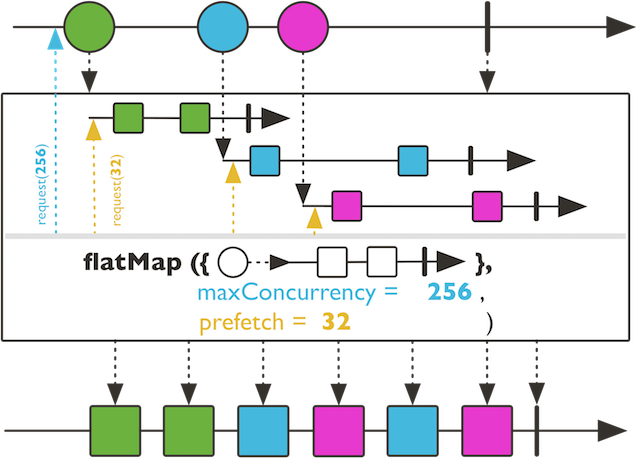
- Type Parameters:
V- the merged output sequence type- Parameters:
mapper- theFunctionto transform input sequence into N sequencesPublisherconcurrency- the maximum in-flight elements from thisFluxsequenceprefetch- the maximum in-flight elements from each innerPublishersequence- Returns:
- a merged
Flux
-
flatMapDelayError
public final <V> Flux<V> flatMapDelayError(Function<? super T,? extends Publisher<? extends V>> mapper, int concurrency, int prefetch)
Transform the items emitted by thisFluxinto Publishers, then flatten the emissions from those by merging them into a singleFlux, so that they may interleave. The concurrency argument allows to control how many mergedPublishercan happen in parallel. The prefetch argument allows to give an arbitrary prefetch size to the mergedPublisher. This variant will delay any error until after the rest of the flatMap backlog has been processed.
- Type Parameters:
V- the merged output sequence type- Parameters:
mapper- theFunctionto transform input sequence into N sequencesPublisherconcurrency- the maximum in-flight elements from thisFluxsequenceprefetch- the maximum in-flight elements from each innerPublishersequence- Returns:
- a merged
Flux
-
flatMap
@Deprecated public final <V> Flux<V> flatMap(Function<? super T,? extends Publisher<? extends V>> mapper, boolean delayError, int concurrency, int prefetch)
Deprecated. useflatMap(Function, int, int)orflatMapDelayError(Function, int, int)instead, will be removed in 3.1.0.Transform the items emitted by thisFluxinto Publishers, then flatten the emissions from those by merging them into a singleFlux, so that they may interleave. The concurrency argument allows to control how many mergedPublishercan happen in parallel. The prefetch argument allows to give an arbitrary prefetch size to the mergedPublisher.
- Type Parameters:
V- the merged output sequence type- Parameters:
mapper- theFunctionto transform input sequence into N sequencesPublisherdelayError- should any error be delayed after current merge backlogconcurrency- the maximum in-flight elements from thisFluxsequenceprefetch- the maximum in-flight elements from each innerPublishersequence- Returns:
- a merged
Flux
-
flatMap
public final <R> Flux<R> flatMap(Function<? super T,? extends Publisher<? extends R>> mapperOnNext, Function<Throwable,? extends Publisher<? extends R>> mapperOnError, Supplier<? extends Publisher<? extends R>> mapperOnComplete)
Transform the signals emitted by thisFluxinto Publishers, then flatten the emissions from those by merging them into a singleFlux, so that they may interleave. OnError will be transformed into completion signal after its mapping callback has been applied.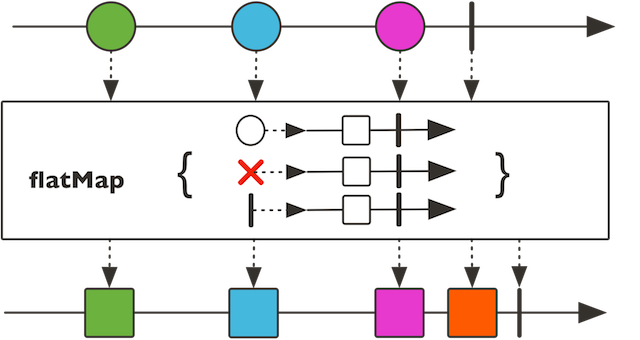
- Type Parameters:
R- the outputPublishertype target- Parameters:
mapperOnNext- theFunctionto call on next data and returning a sequence to mergemapperOnError- theFunctionto call on error signal and returning a sequence to mergemapperOnComplete- theFunctionto call on complete signal and returning a sequence to merge- Returns:
- a new
Flux
-
flatMapIterable
public final <R> Flux<R> flatMapIterable(Function<? super T,? extends Iterable<? extends R>> mapper)
Transform the items emitted by thisFluxintoIterable, then flatten the elements from those by merging them into a singleFlux.
Note that unlike
flatMap(Function)andconcatMap(Function), with Iterable there is no notion of eager vs lazy inner subscription. The content of the Iterables are all played sequentially. ThusflatMapIterableandconcatMapIterableare equivalent offered as a discoverability improvement for users that explore the API with the concat vs flatMap expectation.
-
flatMapIterable
public final <R> Flux<R> flatMapIterable(Function<? super T,? extends Iterable<? extends R>> mapper, int prefetch)
Transform the items emitted by thisFluxintoIterable, then flatten the emissions from those by merging them into a singleFlux. The prefetch argument allows to give an arbitrary prefetch size to the mergedIterable.
Note that unlike
flatMap(Function)andconcatMap(Function), with Iterable there is no notion of eager vs lazy inner subscription. The content of the Iterables are all played sequentially. ThusflatMapIterableandconcatMapIterableare equivalent offered as a discoverability improvement for users that explore the API with the concat vs flatMap expectation.- Type Parameters:
R- the merged output sequence type- Parameters:
mapper- theFunctionto transform input sequence into NIterableprefetch- the maximum in-flight elements from each innerIterablesequence- Returns:
- a concatenation of the values from the Iterables obtained from each element in this
Flux
-
flatMapSequential
public final <R> Flux<R> flatMapSequential(Function<? super T,? extends Publisher<? extends R>> mapper)
Transform the items emitted by thisFluxinto Publishers, then flatten the emissions from those by merging them into a singleFlux, in order. Unlike concatMap, transformed inner Publishers are subscribed to eagerly. Unlike flatMap, their emitted elements are merged respecting the order of the original sequence.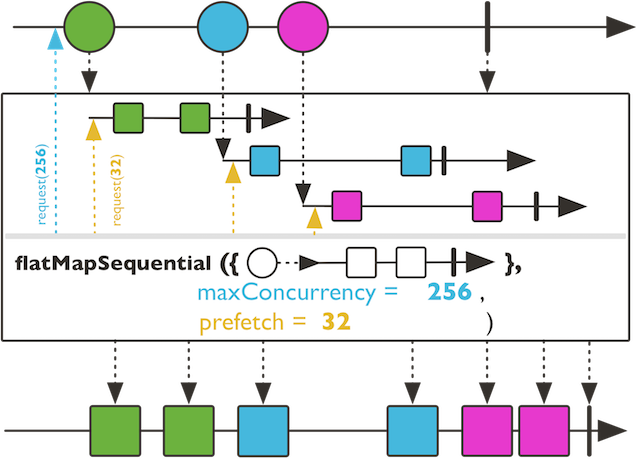
-
flatMapSequential
public final <R> Flux<R> flatMapSequential(Function<? super T,? extends Publisher<? extends R>> mapper, int maxConcurrency)
Transform the items emitted by thisFluxinto Publishers, then flatten the emissions from those by merging them into a singleFlux, in order. Unlike concatMap, transformed inner Publishers are subscribed to eagerly. Unlike flatMap, their emitted elements are merged respecting the order of the original sequence. The concurrency argument allows to control how many mergedPublishercan happen in parallel.
-
flatMapSequential
public final <R> Flux<R> flatMapSequential(Function<? super T,? extends Publisher<? extends R>> mapper, int maxConcurrency, int prefetch)
Transform the items emitted by thisFluxinto Publishers, then flatten the emissions from those by merging them into a singleFlux, in order. Unlike concatMap, transformed inner Publishers are subscribed to eagerly. Unlike flatMap, their emitted elements are merged respecting the order of the original sequence. The concurrency argument allows to control how many mergedPublishercan happen in parallel. The prefetch argument allows to give an arbitrary prefetch size to the mergedPublisher.
- Type Parameters:
R- the merged output sequence type- Parameters:
mapper- theFunctionto transform input sequence into N sequencesPublishermaxConcurrency- the maximum in-flight elements from thisFluxsequenceprefetch- the maximum in-flight elements from each innerPublishersequence- Returns:
- a merged
Flux, subscribing early but keeping the original ordering
-
flatMapSequentialDelayError
public final <R> Flux<R> flatMapSequentialDelayError(Function<? super T,? extends Publisher<? extends R>> mapper, int maxConcurrency, int prefetch)
Transform the items emitted by thisFluxinto Publishers, then flatten the emissions from those by merging them into a singleFlux, in order. Unlike concatMap, transformed inner Publishers are subscribed to eagerly. Unlike flatMap, their emitted elements are merged respecting the order of the original sequence. The concurrency argument allows to control how many mergedPublishercan happen in parallel. The prefetch argument allows to give an arbitrary prefetch size to the mergedPublisher. This variant will delay any error until after the rest of the flatMap backlog has been processed.
- Type Parameters:
R- the merged output sequence type- Parameters:
mapper- theFunctionto transform input sequence into N sequencesPublishermaxConcurrency- the maximum in-flight elements from thisFluxsequenceprefetch- the maximum in-flight elements from each innerPublishersequence- Returns:
- a merged
Flux, subscribing early but keeping the original ordering
-
flatMapSequential
@Deprecated public final <R> Flux<R> flatMapSequential(Function<? super T,? extends Publisher<? extends R>> mapper, boolean delayError, int maxConcurrency, int prefetch)
Deprecated. useflatMapSequential(Function, int, int)orflatMapSequentialDelayError(Function, int, int)instead, will be removed in 3.1.0.Transform the items emitted by thisFluxinto Publishers, then flatten the emissions from those by merging them into a singleFlux, in order. Unlike concatMap, transformed inner Publishers are subscribed to eagerly. Unlike flatMap, their emitted elements are merged respecting the order of the original sequence. The concurrency argument allows to control how many mergedPublishercan happen in parallel. The prefetch argument allows to give an arbitrary prefetch size to the mergedPublisher.
- Type Parameters:
R- the merged output sequence type- Parameters:
mapper- theFunctionto transform input sequence into N sequencesPublisherdelayError- should any error be delayed after current merge backlogmaxConcurrency- the maximum in-flight elements from thisFluxsequenceprefetch- the maximum in-flight elements from each innerPublishersequence- Returns:
- a merged
Flux, subscribing early but keeping the original ordering
-
getPrefetch
public long getPrefetch()
The prefetch configuration of theFlux- Returns:
- the prefetch configuration of the
Flux, -1L if unspecified
-
groupBy
public final <K> Flux<GroupedFlux<K,T>> groupBy(Function<? super T,? extends K> keyMapper)
Re-route this sequence into dynamically createdFluxfor each unique key evaluated by the given key mapper.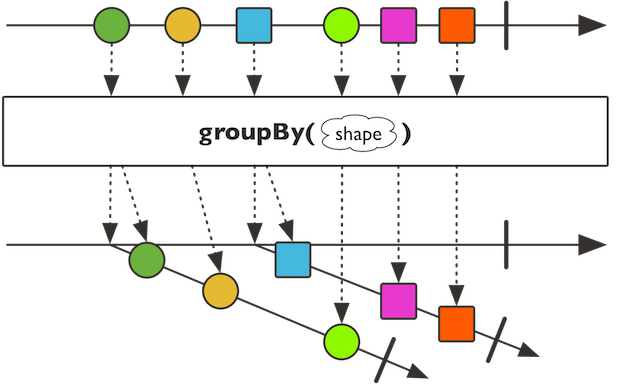
- Type Parameters:
K- the key type extracted from each value of this sequence- Parameters:
keyMapper- the key mappingFunctionthat evaluates an incoming data and returns a key.- Returns:
- a
FluxofGroupedFluxgrouped sequences
-
groupBy
public final <K> Flux<GroupedFlux<K,T>> groupBy(Function<? super T,? extends K> keyMapper, int prefetch)
Re-route this sequence into dynamically createdFluxfor each unique key evaluated by the given key mapper.
- Type Parameters:
K- the key type extracted from each value of this sequence- Parameters:
keyMapper- the key mappingFunctionthat evaluates an incoming data and returns a key.prefetch- the number of values to prefetch from the source- Returns:
- a
FluxofGroupedFluxgrouped sequences
-
groupBy
public final <K,V> Flux<GroupedFlux<K,V>> groupBy(Function<? super T,? extends K> keyMapper, Function<? super T,? extends V> valueMapper)
Re-route this sequence into dynamically createdFluxfor each unique key evaluated by the given key mapper. It will use the given value mapper to extract the element to route.
- Type Parameters:
K- the key type extracted from each value of this sequenceV- the value type extracted from each value of this sequence- Parameters:
keyMapper- the key mapping function that evaluates an incoming data and returns a key.valueMapper- the value mapping function that evaluates which data to extract for re-routing.- Returns:
- a
FluxofGroupedFluxgrouped sequences
-
groupBy
public final <K,V> Flux<GroupedFlux<K,V>> groupBy(Function<? super T,? extends K> keyMapper, Function<? super T,? extends V> valueMapper, int prefetch)
Re-route this sequence into dynamically createdFluxfor each unique key evaluated by the given key mapper. It will use the given value mapper to extract the element to route.
- Type Parameters:
K- the key type extracted from each value of this sequenceV- the value type extracted from each value of this sequence- Parameters:
keyMapper- the key mapping function that evaluates an incoming data and returns a key.valueMapper- the value mapping function that evaluates which data to extract for re-routing.prefetch- the number of values to prefetch from the source- Returns:
- a
FluxofGroupedFluxgrouped sequences
-
groupJoin
public final <TRight,TLeftEnd,TRightEnd,R> Flux<R> groupJoin(Publisher<? extends TRight> other, Function<? super T,? extends Publisher<TLeftEnd>> leftEnd, Function<? super TRight,? extends Publisher<TRightEnd>> rightEnd, BiFunction<? super T,? super Flux<TRight>,? extends R> resultSelector)
Returns aFluxthat correlates two Publishers when they overlap in time and groups the results.There are no guarantees in what order the items get combined when multiple items from one or both source Publishers overlap.
Unlike
join(org.reactivestreams.Publisher<? extends TRight>, java.util.function.Function<? super T, ? extends org.reactivestreams.Publisher<TLeftEnd>>, java.util.function.Function<? super TRight, ? extends org.reactivestreams.Publisher<TRightEnd>>, java.util.function.BiFunction<? super T, ? super TRight, ? extends R>), items from the right Publisher will be streamed into the right resultSelector argumentFlux.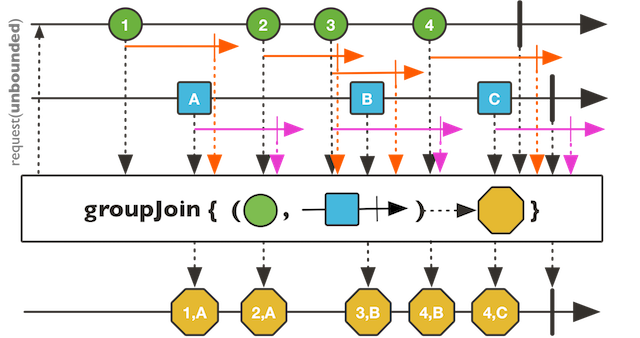
- Type Parameters:
TRight- the type of the right PublisherTLeftEnd- thisFluxtimeout typeTRightEnd- the right Publisher timeout typeR- the combined result type- Parameters:
other- the other Publisher to correlate items from the source Publisher withleftEnd- a function that returns a Publisher whose emissions indicate the duration of the values of the source PublisherrightEnd- a function that returns a Publisher whose emissions indicate the duration of the values of therightPublisherresultSelector- a function that takes an item emitted by each Publisher and returns the value to be emitted by the resulting Publisher- Returns:
- a joining
Flux
-
handle
public final <R> Flux<R> handle(BiConsumer<? super T,SynchronousSink<R>> handler)
Handle the items emitted by thisFluxby calling a biconsumer with the output sink for each onNext. At most oneSynchronousSink.next(Object)call must be performed and/or 0 or 1SynchronousSink.error(Throwable)orSynchronousSink.complete().- Type Parameters:
R- the transformed type- Parameters:
handler- the handlingBiConsumer- Returns:
- a transformed
Flux
-
hasElement
public final Mono<Boolean> hasElement(T value)
Emit a single boolean true if any of the values of thisFluxsequence match the constant.The implementation uses short-circuit logic and completes with true if the constant matches a value.
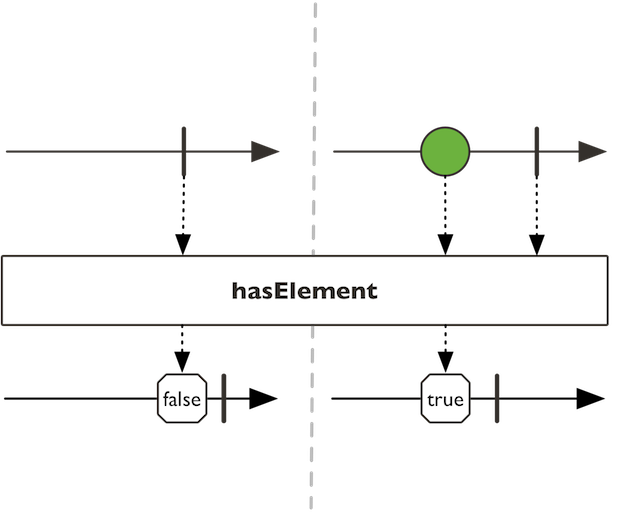
- Parameters:
value- constant compared to incoming signals- Returns:
- a new
Fluxwithtrueif any value satisfies a predicate andfalseotherwise
-
hasElements
public final Mono<Boolean> hasElements()
Emit a single boolean true if thisFluxsequence has at least one element.The implementation uses short-circuit logic and completes with true on onNext.
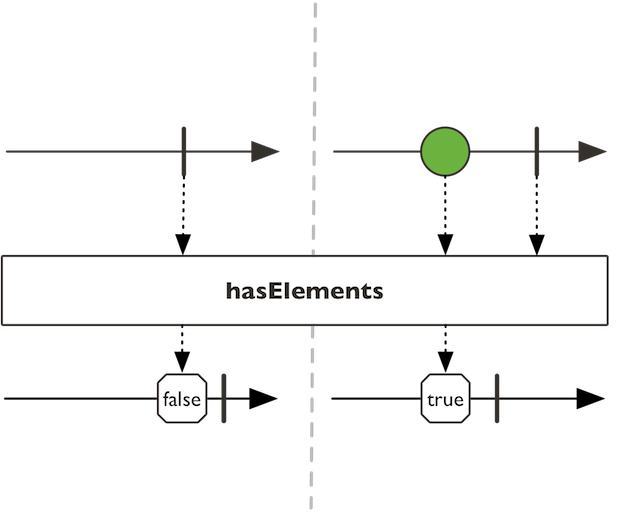
- Returns:
- a new
Monowithtrueif any value is emitted andfalseotherwise
-
hide
public final Flux<T> hide()
Hides the identities of thisFluxand itsSubscriptionas well.- Returns:
- a new
Fluxdefeating anyPublisher/Subscriptionfeature-detection
-
ignoreElements
public final Mono<T> ignoreElements()
Ignores onNext signals (dropping them) and only reacts on termination.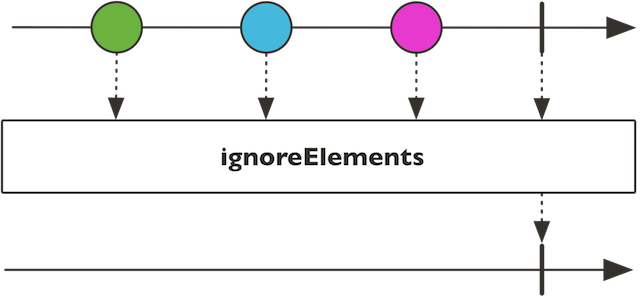
- Returns:
- a new completable
Mono.
-
join
public final <TRight,TLeftEnd,TRightEnd,R> Flux<R> join(Publisher<? extends TRight> other, Function<? super T,? extends Publisher<TLeftEnd>> leftEnd, Function<? super TRight,? extends Publisher<TRightEnd>> rightEnd, BiFunction<? super T,? super TRight,? extends R> resultSelector)
Returns aFluxthat correlates two Publishers when they overlap in time and groups the results.There are no guarantees in what order the items get combined when multiple items from one or both source Publishers overlap.

- Type Parameters:
TRight- the type of the right PublisherTLeftEnd- thisFluxtimeout typeTRightEnd- the right Publisher timeout typeR- the combined result type- Parameters:
other- the other Publisher to correlate items from the source Publisher withleftEnd- a function that returns a Publisher whose emissions indicate the duration of the values of the source PublisherrightEnd- a function that returns a Publisher whose emissions indicate the duration of the values of therightPublisherresultSelector- a function that takes an item emitted by each Publisher and returns the value to be emitted by the resulting Publisher- Returns:
- a joining
Flux
-
last
public final Mono<T> last()
Signal the last element observed before complete signal or emitNoSuchElementExceptionerror if the source was empty. For a passive version usetakeLast(int)
- Returns:
- a limited
Flux
-
last
public final Mono<T> last(T defaultValue)
Signal the last element observed before complete signal or emit the defaultValue if empty. For a passive version usetakeLast(int)
-
limitRate
public final Flux<T> limitRate(int prefetchRate)
Ensure that backpressure signals from downstream subscribers are capped at the providedprefetchRatewhen propagated upstream, effectively rate limiting the upstreamPublisher.Typically used for scenarios where consumer(s) request a large amount of data (eg.
Long.MAX_VALUE) but the data source behaves better or can be optimized with smaller requests (eg. database paging, etc...). All data is still processed.Equivalent to
flux.publishOn(Schedulers.immediate(), prefetchRate).subscribe()- Parameters:
prefetchRate- the limit to apply to downstream's backpressure- Returns:
- a
Fluxlimiting downstream's backpressure - See Also:
publishOn(Scheduler, int)
-
log
public final Flux<T> log()
Observe all Reactive Streams signals and useLoggersupport to handle trace implementation. Default will useLevel.INFOand java.util.logging. If SLF4J is available, it will be used instead.
The default log category will be "reactor.*", a generated operator suffix will complete, e.g. "reactor.Flux.Map".
- Returns:
- a new unaltered
Flux
-
log
public final Flux<T> log(String category)
Observe all Reactive Streams signals and useLoggersupport to handle trace implementation. Default will useLevel.INFOand java.util.logging. If SLF4J is available, it will be used instead.
- Parameters:
category- to be mapped into logger configuration (e.g. org.springframework .reactor). If category ends with "." like "reactor.", a generated operator suffix will complete, e.g. "reactor.Flux.Map".- Returns:
- a new unaltered
Flux
-
log
public final Flux<T> log(String category, Level level, SignalType... options)
Observe Reactive Streams signals matching the passed filteroptionsand useLoggersupport to handle trace implementation. Default will use the passedLeveland java.util.logging. If SLF4J is available, it will be used instead. Options allow fine grained filtering of the traced signal, for instance to only capture onNext and onError:flux.log("category", Level.INFO, SignalType.ON_NEXT, SignalType.ON_ERROR)
- Parameters:
category- to be mapped into logger configuration (e.g. org.springframework .reactor). If category ends with "." like "reactor.", a generated operator suffix will complete, e.g. "reactor.Flux.Map".level- theLevelto enforce for this tracing Flux (only FINEST, FINE, INFO, WARNING and SEVERE are taken into account)options- a varargSignalTypeoption to filter log messages- Returns:
- a new unaltered
Flux
-
log
public final Flux<T> log(String category, Level level, boolean showOperatorLine, SignalType... options)
Observe Reactive Streams signals matching the passed filteroptionsand useLoggersupport to handle trace implementation. Default will use the passedLeveland java.util.logging. If SLF4J is available, it will be used instead.Options allow fine grained filtering of the traced signal, for instance to only capture onNext and onError:
flux.log("category", Level.INFO, SignalType.ON_NEXT, SignalType.ON_ERROR)
- Parameters:
category- to be mapped into logger configuration (e.g. org.springframework .reactor). If category ends with "." like "reactor.", a generated operator suffix will complete, e.g. "reactor.Flux.Map".level- theLevelto enforce for this tracing Flux (only FINEST, FINE, INFO, WARNING and SEVERE are taken into account)showOperatorLine- capture the current stack to display operator class/line number.options- a varargSignalTypeoption to filter log messages- Returns:
- a new unaltered
Flux
-
map
public final <V> Flux<V> map(Function<? super T,? extends V> mapper)
Transform the items emitted by thisFluxby applying a function to each item.
-
mapError
@Deprecated public final Flux<T> mapError(Function<? super Throwable,? extends Throwable> mapper)
Deprecated. useonErrorMap(java.util.function.Function<? super java.lang.Throwable, ? extends java.lang.Throwable>)instead. Will be removed in 3.1.0.Transform the error emitted by thisFluxby applying a function.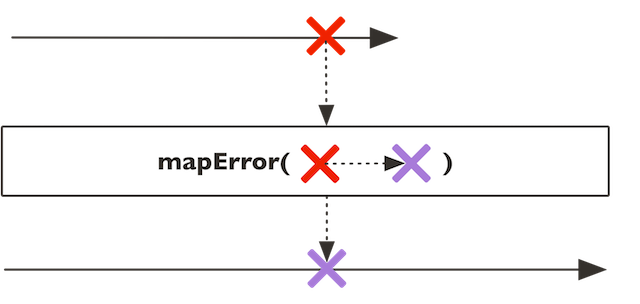
-
mapError
@Deprecated public final <E extends Throwable> Flux<T> mapError(Class<E> type, Function<? super E,? extends Throwable> mapper)
Deprecated. useonErrorMap(java.util.function.Function<? super java.lang.Throwable, ? extends java.lang.Throwable>)instead. Will be removed in 3.1.0.Transform the error emitted by thisFluxby applying a function if the error matches the given type, otherwise let the error flow.
-
mapError
@Deprecated public final Flux<T> mapError(Predicate<? super Throwable> predicate, Function<? super Throwable,? extends Throwable> mapper)
Deprecated. useonErrorMap(java.util.function.Function<? super java.lang.Throwable, ? extends java.lang.Throwable>)instead. Will be removed in 3.1.0.Transform the error emitted by thisFluxby applying a function if the error matches the given predicate, otherwise let the error flow.
-
materialize
public final Flux<Signal<T>> materialize()
Transform the incoming onNext, onError and onComplete signals intoSignal. Since the error is materialized as aSignal, the propagation will be stopped and onComplete will be emitted. Complete signal will first emit aSignal.complete()and then effectively complete the flux.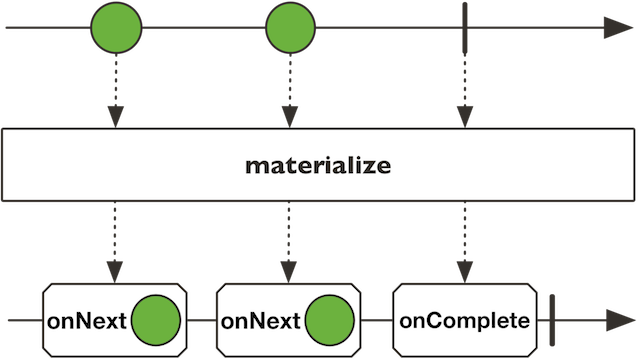
-
onBackpressureBuffer
public final Flux<T> onBackpressureBuffer()
Request an unbounded demand and push the returnedFlux, or park the observed elements if not enough demand is requested downstream. Errors will be delayed until the buffer gets consumed.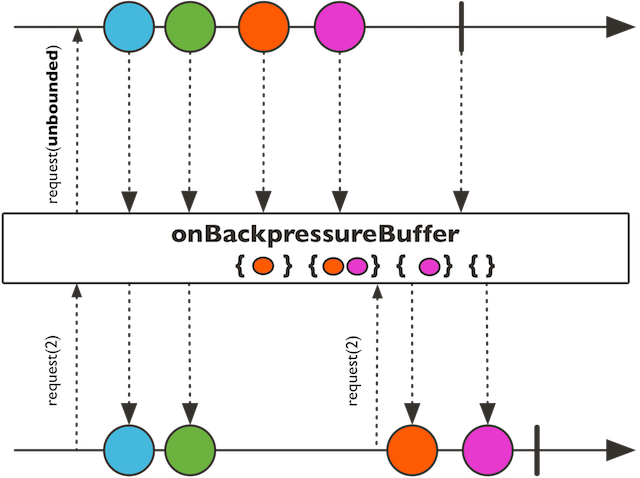
- Returns:
- a buffering
Flux
-
onBackpressureBuffer
public final Flux<T> onBackpressureBuffer(int maxSize)
Request an unbounded demand and push the returnedFlux, or park the observed elements if not enough demand is requested downstream. Errors will be immediately emitted on overflow regardless of the pending buffer.
- Parameters:
maxSize- maximum buffer backlog size before immediate error- Returns:
- a buffering
Flux
-
onBackpressureBuffer
public final Flux<T> onBackpressureBuffer(int maxSize, Consumer<? super T> onOverflow)
Request an unbounded demand and push the returnedFlux, or park the observed elements if not enough demand is requested downstream. Overflow error will be delayed after the current backlog is consumed. However theConsumerwill be immediately invoked.
- Parameters:
maxSize- maximum buffer backlog size before overflow callback is calledonOverflow- callback to invoke on overflow- Returns:
- a buffering
Flux
-
onBackpressureBuffer
public final Flux<T> onBackpressureBuffer(int maxSize, BufferOverflowStrategy bufferOverflowStrategy)
Request an unbounded demand and push the returnedFlux, or park the observed elements if not enough demand is requested downstream, within amaxSizelimit. Over that limit, the overflow strategy is applied (seeBufferOverflowStrategy).Note that for the
ERRORstrategy, the overflow error will be delayed after the current backlog is consumed.
- Parameters:
maxSize- maximum buffer backlog size before overflow strategy is appliedbufferOverflowStrategy- strategy to apply to overflowing elements- Returns:
- a buffering
Flux
-
onBackpressureBuffer
public final Flux<T> onBackpressureBuffer(int maxSize, Consumer<? super T> onBufferOverflow, BufferOverflowStrategy bufferOverflowStrategy)
Request an unbounded demand and push the returnedFlux, or park the observed elements if not enough demand is requested downstream, within amaxSizelimit. Over that limit, the overflow strategy is applied (seeBufferOverflowStrategy).A
Consumeris immediately invoked when there is an overflow, receiving the value that was discarded because of the overflow (which can be different from the latest element emitted by the source in case of aDROP_LATESTstrategy).Note that for the
ERRORstrategy, the overflow error will be delayed after the current backlog is consumed. The consumer is still invoked immediately.
- Parameters:
maxSize- maximum buffer backlog size before overflow callback is calledonBufferOverflow- callback to invoke on overflowbufferOverflowStrategy- strategy to apply to overflowing elements- Returns:
- a buffering
Flux
-
onBackpressureDrop
public final Flux<T> onBackpressureDrop()
Request an unbounded demand and push the returnedFlux, or drop the observed elements if not enough demand is requested downstream.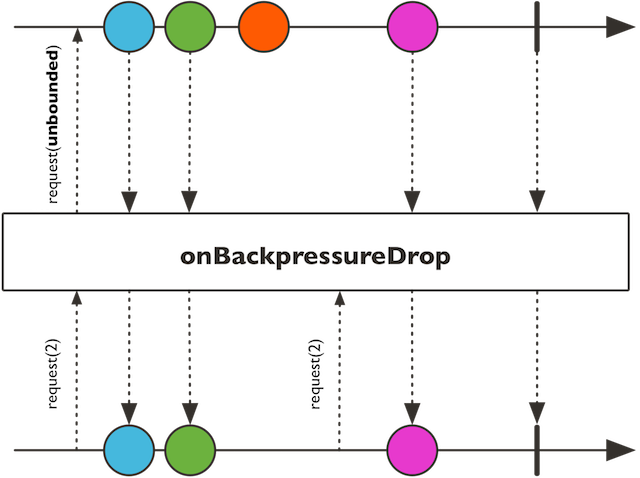
- Returns:
- a dropping
Flux
-
onBackpressureDrop
public final Flux<T> onBackpressureDrop(Consumer<? super T> onDropped)
Request an unbounded demand and push the returnedFlux, or drop and notify droppingConsumerwith the observed elements if not enough demand is requested downstream.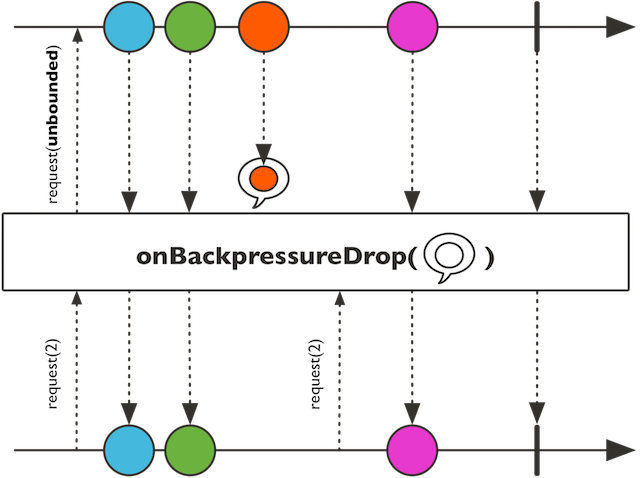
- Parameters:
onDropped- the Consumer called when an value gets dropped due to lack of downstream requests- Returns:
- a dropping
Flux
-
onBackpressureError
public final Flux<T> onBackpressureError()
Request an unbounded demand and push the returnedFlux, or emit onError fomExceptions.failWithOverflow()if not enough demand is requested downstream.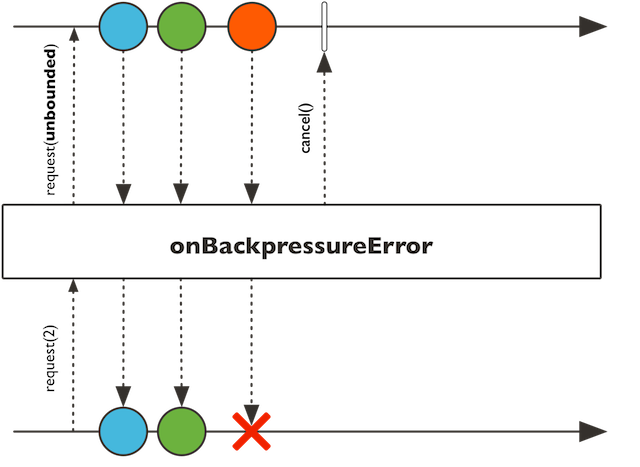
- Returns:
- an erroring
Fluxon backpressure
-
onBackpressureLatest
public final Flux<T> onBackpressureLatest()
Request an unbounded demand and push the returnedFlux, or only keep the most recent observed item if not enough demand is requested downstream.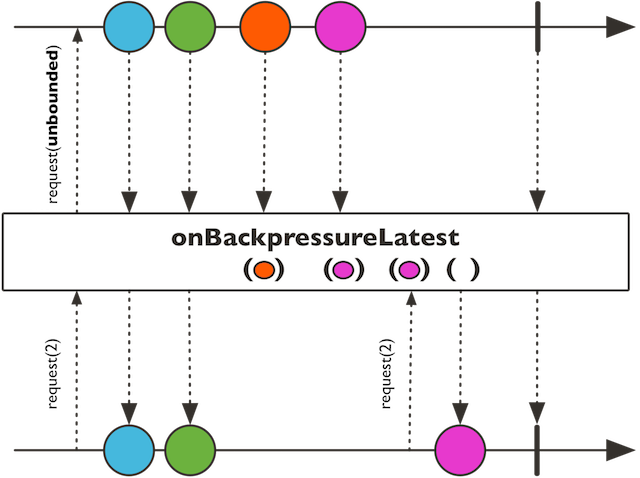
- Returns:
- a dropping
Fluxthat will only keep a reference to the last observed item
-
onErrorMap
public final Flux<T> onErrorMap(Function<? super Throwable,? extends Throwable> mapper)
Transform the error emitted by thisFluxby applying a function.
-
onErrorMap
public final <E extends Throwable> Flux<T> onErrorMap(Class<E> type, Function<? super E,? extends Throwable> mapper)
Transform the error emitted by thisFluxby applying a function if the error matches the given type, otherwise let the error flow.
-
onErrorMap
public final Flux<T> onErrorMap(Predicate<? super Throwable> predicate, Function<? super Throwable,? extends Throwable> mapper)
Transform the error emitted by thisFluxby applying a function if the error matches the given predicate, otherwise let the error flow.
-
onErrorResumeWith
@Deprecated public final Flux<T> onErrorResumeWith(Function<? super Throwable,? extends Publisher<? extends T>> fallback)
Deprecated. useonErrorResume(Function)instead. Will be removed in 3.1.0.Subscribe to a returned fallback publisher when any error occurs.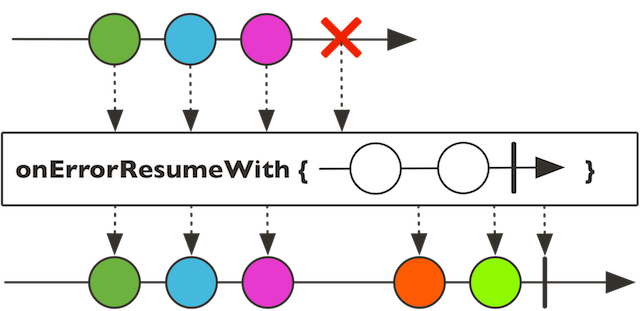
-
onErrorResumeWith
@Deprecated public final <E extends Throwable> Flux<T> onErrorResumeWith(Class<E> type, Function<? super E,? extends Publisher<? extends T>> fallback)
Deprecated. useonErrorResume(Class, Function)instead. Will be removed in 3.1.0.Subscribe to a returned fallback publisher when an error matching the given type occurs.
-
onErrorResumeWith
@Deprecated public final Flux<T> onErrorResumeWith(Predicate<? super Throwable> predicate, Function<? super Throwable,? extends Publisher<? extends T>> fallback)
Deprecated. useonErrorResume(Predicate, Function)instead. Will be removed in 3.1.0.Subscribe to a returned fallback publisher when an error matching the given type occurs.
-
onErrorResume
public final Flux<T> onErrorResume(Function<? super Throwable,? extends Publisher<? extends T>> fallback)
Subscribe to a returned fallback publisher when any error occurs.
-
onErrorResume
public final <E extends Throwable> Flux<T> onErrorResume(Class<E> type, Function<? super E,? extends Publisher<? extends T>> fallback)
Subscribe to a returned fallback publisher when an error matching the given type occurs.
-
onErrorResume
public final Flux<T> onErrorResume(Predicate<? super Throwable> predicate, Function<? super Throwable,? extends Publisher<? extends T>> fallback)
Subscribe to a returned fallback publisher when an error matching the given type occurs.
-
onErrorReturn
public final Flux<T> onErrorReturn(T fallbackValue)
Fallback to the given value if an error is observed on thisFlux
- Parameters:
fallbackValue- alternate value on fallback- Returns:
- a new
Flux
-
onErrorReturn
public final <E extends Throwable> Flux<T> onErrorReturn(Class<E> type, T fallbackValue)
Fallback to the given value if an error of a given type is observed on thisFlux
- Type Parameters:
E- the error type- Parameters:
type- the error type to matchfallbackValue- alternate value on fallback- Returns:
- a new
Flux
-
onErrorReturn
public final <E extends Throwable> Flux<T> onErrorReturn(Predicate<? super Throwable> predicate, T fallbackValue)
Fallback to the given value if an error matching the given predicate is observed on thisFlux
- Type Parameters:
E- the error type- Parameters:
predicate- the error predicate to matchfallbackValue- alternate value on fallback- Returns:
- a new
Flux
-
onTerminateDetach
public final Flux<T> onTerminateDetach()
Detaches the both the childSubscriberand theSubscriptionon termination or cancellation.This should help with odd retention scenarios when running with non-reactor
Subscriber.- Returns:
- a detachable
Flux
-
parallel
public final ParallelFlux<T> parallel()
Prepare to consume thisFluxon number of 'rails' matching number of CPU in round-robin fashion.
- Returns:
- a new
ParallelFluxinstance
-
parallel
public final ParallelFlux<T> parallel(int parallelism)
Prepare to consume thisFluxon parallelism number of 'rails' in round-robin fashion.
- Parameters:
parallelism- the number of parallel rails- Returns:
- a new
ParallelFluxinstance
-
parallel
public final ParallelFlux<T> parallel(int parallelism, int prefetch)
Prepare to consume thisFluxon parallelism number of 'rails' in round-robin fashion and use custom prefetch amount and queue for dealing with the sourceFlux's values.
- Parameters:
parallelism- the number of parallel railsprefetch- the number of values to prefetch from the source- Returns:
- a new
ParallelFluxinstance
-
publish
public final ConnectableFlux<T> publish()
Prepare aConnectableFluxwhich shares thisFluxsequence and dispatches values to subscribers in a backpressure-aware manner. Prefetch will default toQueueSupplier.SMALL_BUFFER_SIZE. This will effectively turn any type of sequence into a hot sequence.Backpressure will be coordinated on
Subscription.request(long)and if anySubscriberis missing demand (requested = 0), multicast will pause pushing/pulling.
- Returns:
- a new
ConnectableFlux
-
publish
public final ConnectableFlux<T> publish(int prefetch)
Prepare aConnectableFluxwhich shares thisFluxsequence and dispatches values to subscribers in a backpressure-aware manner. This will effectively turn any type of sequence into a hot sequence.Backpressure will be coordinated on
Subscription.request(long)and if anySubscriberis missing demand (requested = 0), multicast will pause pushing/pulling.
- Parameters:
prefetch- bounded requested demand- Returns:
- a new
ConnectableFlux
-
publish
public final <R> Flux<R> publish(Function<? super Flux<T>,? extends Publisher<? extends R>> transform)
Shares a sequence for the duration of a function that may transform it and consume it as many times as necessary without causing multiple subscriptions to the upstream.- Type Parameters:
R- the output value type- Parameters:
transform- the transformation function- Returns:
- a new
Flux
-
publish
public final <R> Flux<R> publish(Function<? super Flux<T>,? extends Publisher<? extends R>> transform, int prefetch)
Shares a sequence for the duration of a function that may transform it and consume it as many times as necessary without causing multiple subscriptions to the upstream.- Type Parameters:
R- the output value type- Parameters:
transform- the transformation functionprefetch- the request size- Returns:
- a new
Flux
-
publishNext
public final Mono<T> publishNext()
Prepare aMonowhich shares thisFluxsequence and dispatches the first observed item to subscribers in a backpressure-aware manner. This will effectively turn any type of sequence into a hot sequence when the firstSubscribersubscribes.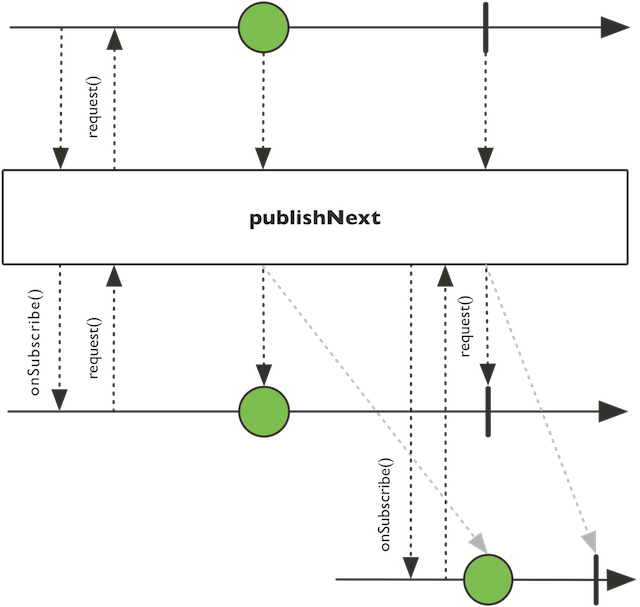
- Returns:
- a new
Mono
-
publishOn
public final Flux<T> publishOn(Scheduler scheduler)
Run onNext, onComplete and onError on a suppliedSchedulerScheduler.Worker.Typically used for fast publisher, slow consumer(s) scenarios.
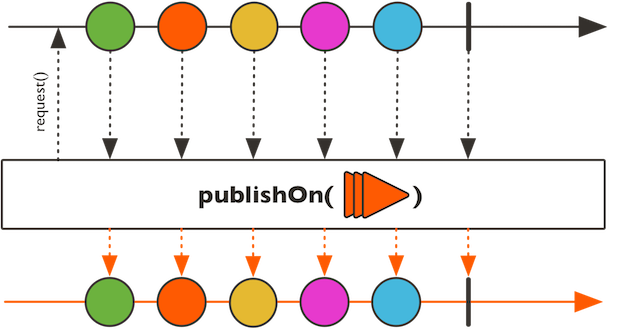
flux.publishOn(Schedulers.single()).subscribe()- Parameters:
scheduler- a checkedScheduler.Workerfactory- Returns:
- a
Fluxproducing asynchronously
-
publishOn
public final Flux<T> publishOn(Scheduler scheduler, int prefetch)
Run onNext, onComplete and onError on a suppliedSchedulerScheduler.Worker.Typically used for fast publisher, slow consumer(s) scenarios.

flux.publishOn(Schedulers.single()).subscribe()- Parameters:
scheduler- a checkedScheduler.Workerfactoryprefetch- the asynchronous boundary capacity- Returns:
- a
Fluxproducing asynchronously
-
publishOn
public final Flux<T> publishOn(Scheduler scheduler, boolean delayError, int prefetch)
Run onNext, onComplete and onError on a suppliedSchedulerScheduler.Worker.Typically used for fast publisher, slow consumer(s) scenarios.

flux.publishOn(Schedulers.single()).subscribe()- Parameters:
scheduler- a checkedScheduler.WorkerfactorydelayError- should the buffer be consumed before forwarding any errorprefetch- the asynchronous boundary capacity- Returns:
- a
Fluxproducing asynchronously
-
reduce
public final Mono<T> reduce(BiFunction<T,T,T> aggregator)
Aggregate the values from thisFluxsequence into an object of the same type than the emitted items. The left/rightBiFunctionarguments are the N-1 and N item, ignoring sequence with 0 or 1 element only.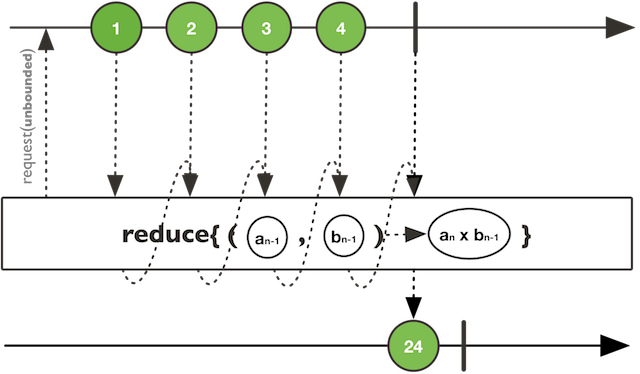
- Parameters:
aggregator- the aggregatingBiFunction- Returns:
- a reduced
Flux
-
reduce
public final <A> Mono<A> reduce(A initial, BiFunction<A,? super T,A> accumulator)
Accumulate the values from thisFluxsequence into an object matching an initial value type. The arguments are the N-1 or initial value and N current item .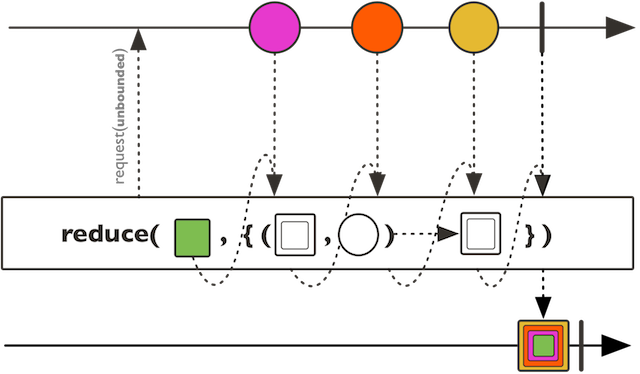
- Type Parameters:
A- the type of the initial and reduced object- Parameters:
accumulator- the reducingBiFunctioninitial- the initial left argument to pass to the reducingBiFunction- Returns:
- a reduced
Flux
-
reduceWith
public final <A> Mono<A> reduceWith(Supplier<A> initial, BiFunction<A,? super T,A> accumulator)
Accumulate the values from thisFluxsequence into an object matching an initial value type. The arguments are the N-1 or initial value and N current item .
- Type Parameters:
A- the type of the initial and reduced object- Parameters:
accumulator- the reducingBiFunctioninitial- the initial left argument supplied on subscription to the reducingBiFunction- Returns:
- a reduced
Flux
-
repeat
public final Flux<T> repeat()
Repeatedly subscribe to the source completion of the previous subscription.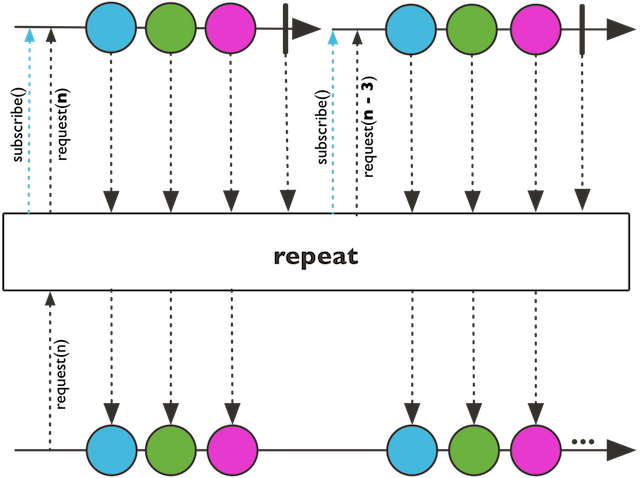
- Returns:
- an indefinitely repeated
Fluxon onComplete
-
repeat
public final Flux<T> repeat(BooleanSupplier predicate)
Repeatedly subscribe to the source if the predicate returns true after completion of the previous subscription.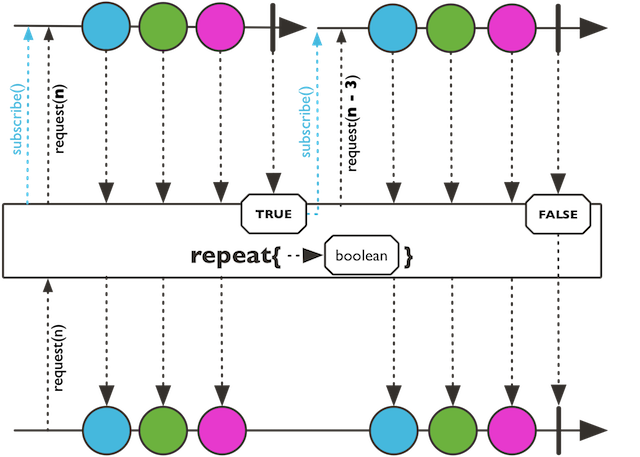
- Parameters:
predicate- the boolean to evaluate on onComplete.- Returns:
- an eventually repeated
Fluxon onComplete
-
repeat
public final Flux<T> repeat(long numRepeat)
Repeatedly subscribe to the source if the predicate returns true after completion of the previous subscription.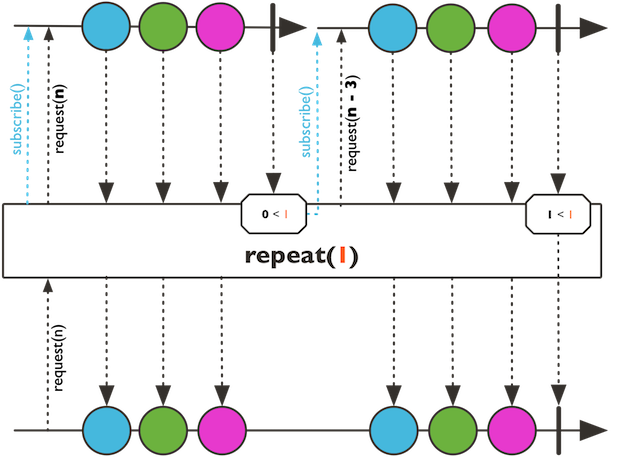
- Parameters:
numRepeat- the number of times to re-subscribe on onComplete- Returns:
- an eventually repeated
Fluxon onComplete up to number of repeat specified
-
repeat
public final Flux<T> repeat(long numRepeat, BooleanSupplier predicate)
Repeatedly subscribe to the source if the predicate returns true after completion of the previous subscription. A specified maximum of repeat will limit the number of re-subscribe.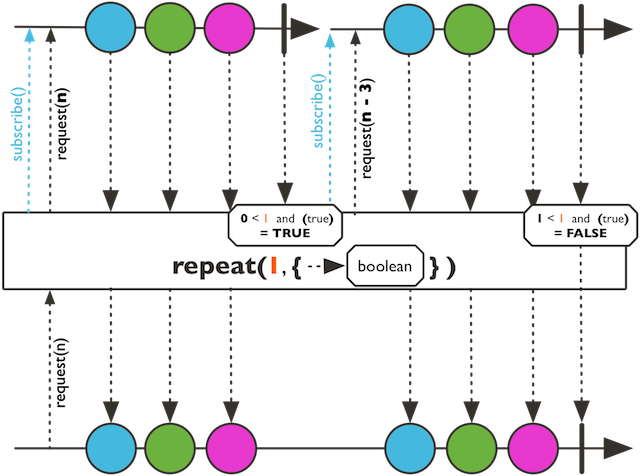
- Parameters:
numRepeat- the number of times to re-subscribe on completepredicate- the boolean to evaluate on onComplete- Returns:
- an eventually repeated
Fluxon onComplete up to number of repeat specified OR matching predicate
-
repeatWhen
public final Flux<T> repeatWhen(Function<Flux<Long>,? extends Publisher<?>> whenFactory)
Repeatedly subscribe to thisFluxwhen a companion sequence signals a number of emitted elements in response to the flux completion signal.If the companion sequence signals when this
Fluxis active, the repeat attempt is suppressed and any terminal signal will terminate thisFluxwith the same signal immediately.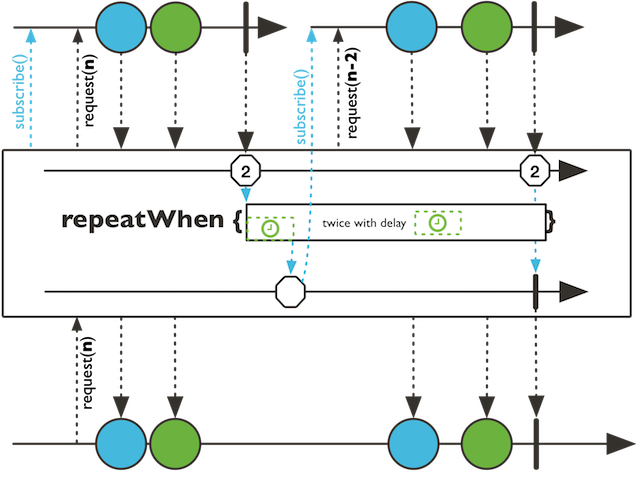
-
replay
public final ConnectableFlux<T> replay()
Turn thisFluxinto a hot source and cache last emitted signals for furtherSubscriber. Will retain an unbounded amount of onNext signals. Completion and Error will also be replayed.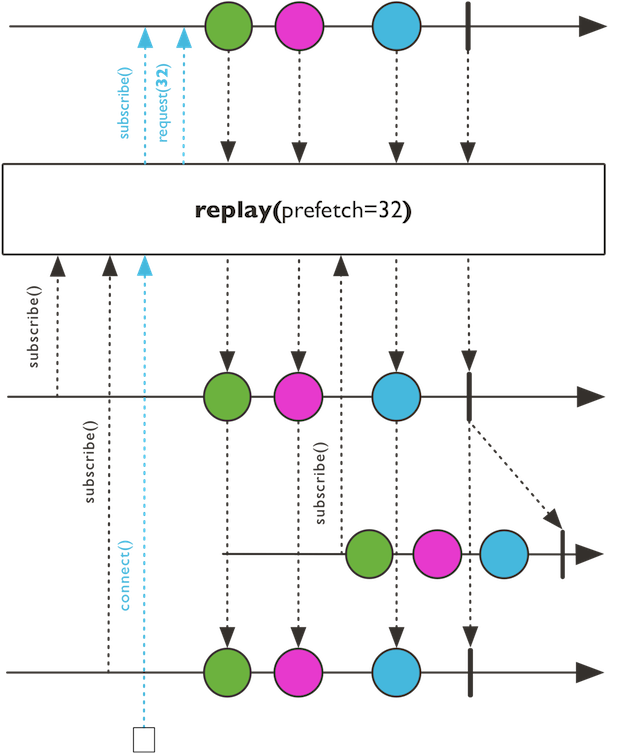
- Returns:
- a replaying
ConnectableFlux
-
replay
public final ConnectableFlux<T> replay(int history)
Turn thisFluxinto a connectable hot source and cache last emitted signals for furtherSubscriber. Will retain up to the given history size onNext signals. Completion and Error will also be replayed.
- Parameters:
history- number of events retained in history excluding complete and error- Returns:
- a replaying
ConnectableFlux
-
replay
public final ConnectableFlux<T> replay(Duration ttl)
Turn thisFluxinto a connectable hot source and cache last emitted signals for furtherSubscriber. Will retain each onNext up to the given per-item expiry timeout. Completion and Error will also be replayed.
- Parameters:
ttl- Per-item timeout duration- Returns:
- a replaying
ConnectableFlux
-
replay
public final ConnectableFlux<T> replay(int history, Duration ttl)
Turn thisFluxinto a connectable hot source and cache last emitted signals for furtherSubscriber. Will retain up to the given history size onNext signals with a per-item ttl. Completion and Error will also be replayed.
- Parameters:
history- number of events retained in history excluding complete and errorttl- Per-item timeoutDuration- Returns:
- a replaying
ConnectableFlux
-
replay
public final ConnectableFlux<T> replay(Duration ttl, Scheduler timer)
Turn thisFluxinto a connectable hot source and cache last emitted signals for furtherSubscriber. Will retain onNext signal for up to the givenDurationwith a per-item ttl. Completion and Error will also be replayed.
- Parameters:
ttl- Per-item timeoutDurationtimer- a time-capableSchedulerinstance to read current time from- Returns:
- a replaying
ConnectableFlux
-
replay
public final ConnectableFlux<T> replay(int history, Duration ttl, Scheduler timer)
Turn thisFluxinto a connectable hot source and cache last emitted signals for furtherSubscriber. Will retain up to the given history size onNext signals with a per-item ttl. Completion and Error will also be replayed.
- Parameters:
history- number of events retained in history excluding complete and errorttl- Per-item timeoutDurationtimer- aSchedulerinstance to read current time from- Returns:
- a replaying
ConnectableFlux
-
replayMillis
@Deprecated public final ConnectableFlux<T> replayMillis(long ttl, TimedScheduler timer)
Deprecated. use theDurationbased variants instead, will be removed in 3.1.0Turn thisFluxinto a connectable hot source and cache last emitted signals for furtherSubscriber. Will retain up to the given history size onNext signals. Completion and Error will also be replayed.
- Parameters:
ttl- Per-item timeout duration in millisecondstimer-Schedulerto read current time from- Returns:
- a replaying
ConnectableFlux
-
replayMillis
@Deprecated public final ConnectableFlux<T> replayMillis(int history, long ttl, TimedScheduler timer)
Deprecated. use theDurationbased variants instead, will be removed in 3.1.0Turn thisFluxinto a connectable hot source and cache last emitted signals for furtherSubscriber. Will retain up to the given history size onNext signals. Completion and Error will also be replayed.
- Parameters:
history- number of events retained in history excluding complete and errorttl- Per-item timeout duration in millisecondstimer-Schedulerto read current time from- Returns:
- a replaying
ConnectableFlux
-
retry
public final Flux<T> retry()
Re-subscribes to thisFluxsequence if it signals any error either indefinitely.The times == Long.MAX_VALUE is treated as infinite retry.
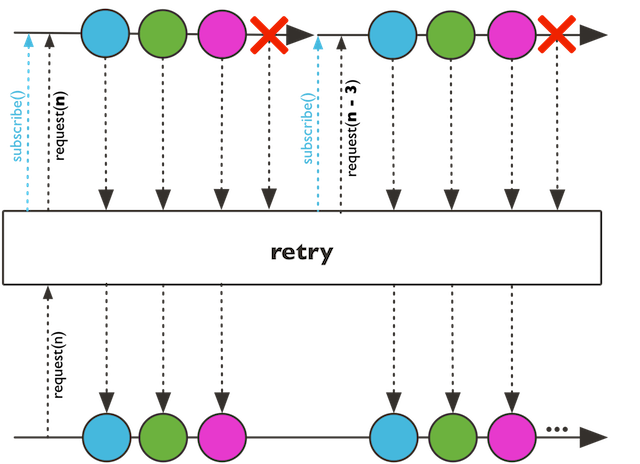
- Returns:
- a re-subscribing
Fluxon onError
-
retry
public final Flux<T> retry(long numRetries)
Re-subscribes to thisFluxsequence if it signals any error either indefinitely or a fixed number of times.The times == Long.MAX_VALUE is treated as infinite retry.
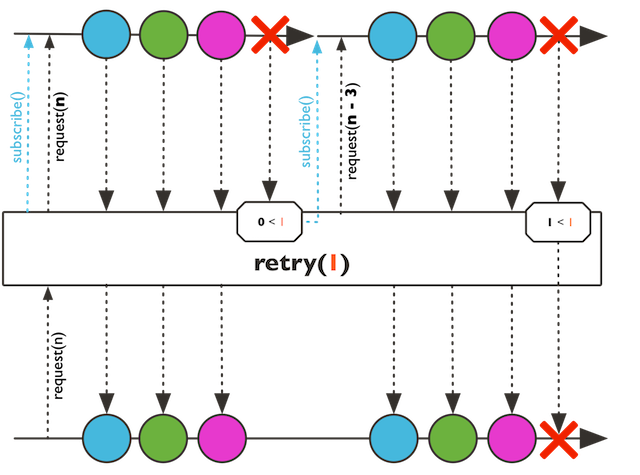
- Parameters:
numRetries- the number of times to tolerate an error- Returns:
- a re-subscribing
Fluxon onError up to the specified number of retries.
-
retry
public final Flux<T> retry(Predicate<Throwable> retryMatcher)
Re-subscribes to thisFluxsequence if it signals any error and the givenPredicatematches otherwise push the error downstream.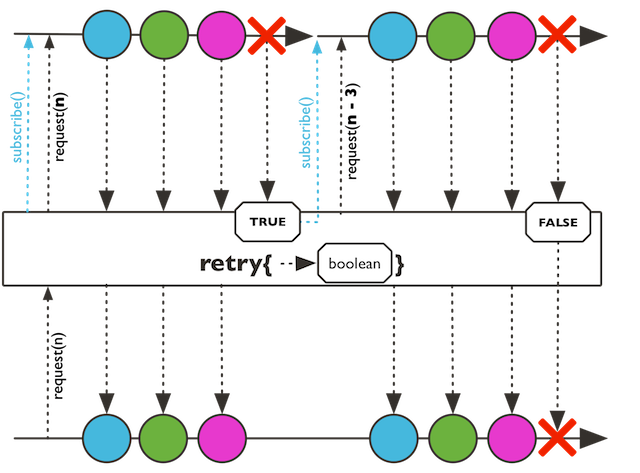
- Parameters:
retryMatcher- the predicate to evaluate if retry should occur based on a given error signal- Returns:
- a re-subscribing
Fluxon onError if the predicates matches.
-
retry
public final Flux<T> retry(long numRetries, Predicate<Throwable> retryMatcher)
Re-subscribes to thisFluxsequence up to the specified number of retries if it signals any error and the givenPredicatematches otherwise push the error downstream.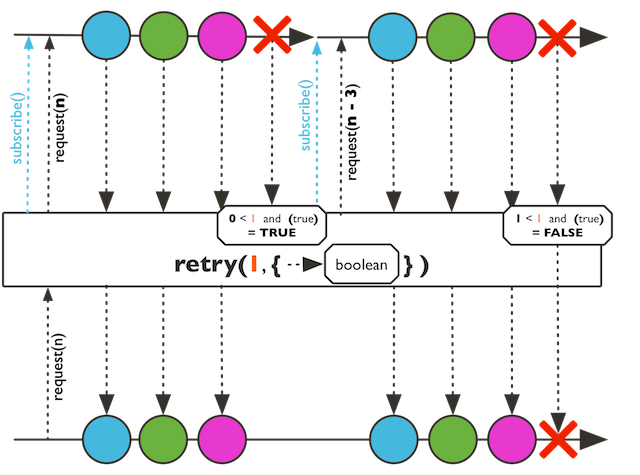
- Parameters:
numRetries- the number of times to tolerate an errorretryMatcher- the predicate to evaluate if retry should occur based on a given error signal- Returns:
- a re-subscribing
Fluxon onError up to the specified number of retries and if the predicate matches.
-
retryWhen
public final Flux<T> retryWhen(Function<Flux<Throwable>,? extends Publisher<?>> whenFactory)
-
sample
public final Flux<T> sample(Duration timespan)
Emit latest value for every given period of time.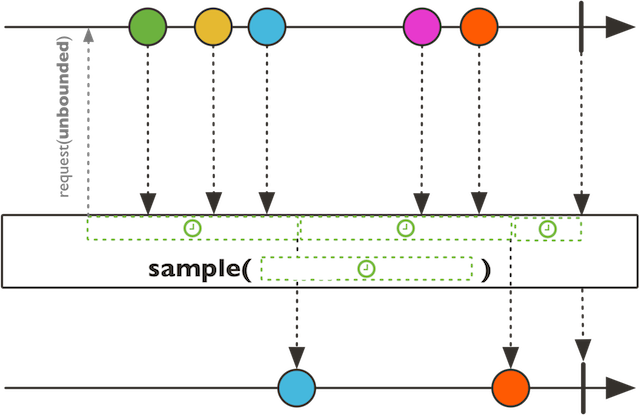
- Parameters:
timespan- the duration to emit the latest observed item- Returns:
- a sampled
Fluxby last item over a period of time
-
sample
public final <U> Flux<T> sample(Publisher<U> sampler)
Sample thisFluxand emit its latest value whenever the samplerPublishersignals a value.Termination of either
Publisherwill result in termination for theSubscriberas well.Both
Publisherwill run in unbounded mode because the backpressure would interfere with the sampling precision.
-
sampleMillis
@Deprecated public final Flux<T> sampleMillis(long timespan)
Deprecated. use theDurationbased variants instead, will be removed in 3.1.0Emit latest value for every given period of ti,e.
- Parameters:
timespan- the period in second to emit the latest observed item- Returns:
- a sampled
Fluxby last item over a period of time
-
sampleFirst
public final Flux<T> sampleFirst(Duration timespan)
Take a value from thisFluxthen use the duration provided to skip other values.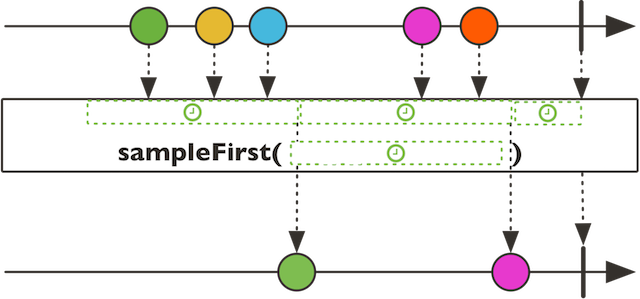
- Parameters:
timespan- the duration to exclude others values from this sequence- Returns:
- a sampled
Fluxby first item over a period of time
-
sampleFirst
public final <U> Flux<T> sampleFirst(Function<? super T,? extends Publisher<U>> samplerFactory)
-
sampleFirstMillis
@Deprecated public final Flux<T> sampleFirstMillis(long timespan)
Deprecated. use theDurationbased variants instead, will be removed in 3.1.0Take a value from thisFluxthen use the duration provided to skip other values.
- Parameters:
timespan- the period in milliseconds to exclude others values from this sequence- Returns:
- a sampled
Fluxby first item over a period of time
-
sampleTimeout
public final <U> Flux<T> sampleTimeout(Function<? super T,? extends Publisher<U>> throttlerFactory)
Emit the last value from thisFluxonly if there were no new values emitted during the time window provided by a publisher for that particular last value.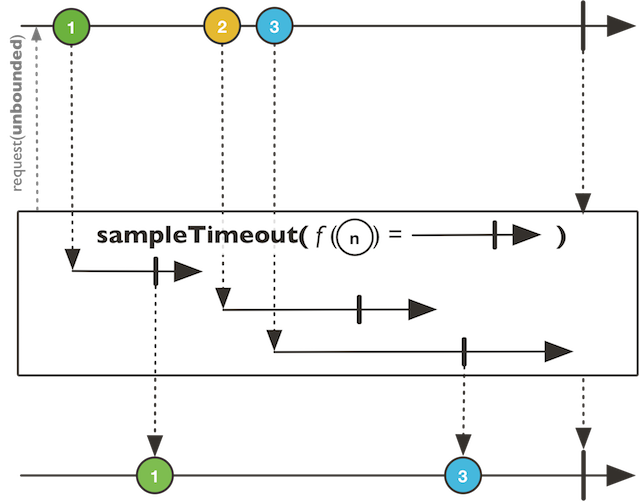
- Type Parameters:
U- the companion reified type- Parameters:
throttlerFactory- select aPublishercompanion to signal onNext or onComplete to stop checking others values from this sequence and emit the selecting item- Returns:
- a sampled
Fluxby last single item observed before a companionPublisheremits
-
sampleTimeout
public final <U> Flux<T> sampleTimeout(Function<? super T,? extends Publisher<U>> throttlerFactory, int maxConcurrency)
Emit the last value from thisFluxonly if there were no newer values emitted during the time window provided by a publisher for that particular last value.The provided maxConcurrency will keep a bounded maximum of concurrent timeouts and drop any new items until at least one timeout terminates.
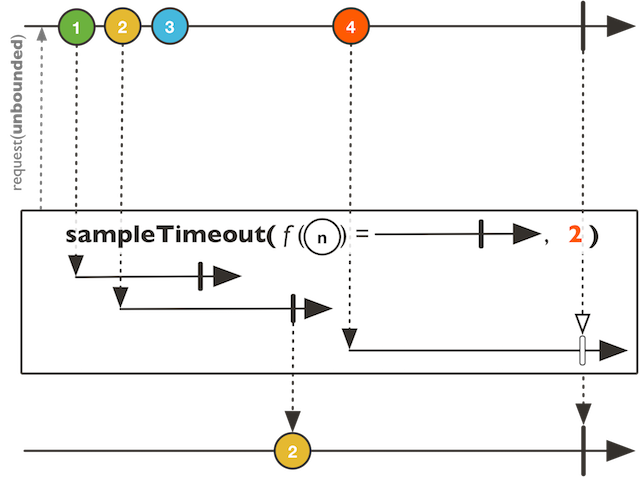
- Type Parameters:
U- the throttling type- Parameters:
throttlerFactory- select aPublishercompanion to signal onNext or onComplete to stop checking others values from this sequence and emit the selecting itemmaxConcurrency- the maximum number of concurrent timeouts- Returns:
- a sampled
Fluxby last single item observed before a companionPublisheremits
-
scan
public final Flux<T> scan(BiFunction<T,T,T> accumulator)
Accumulate thisFluxvalues with an accumulatorBiFunctionand returns the intermediate results of this function.Unlike
scan(Object, BiFunction), this operator doesn't take an initial value but treats the firstFluxvalue as initial value.
The accumulation works as follows:result[0] = accumulator(source[0], source[1]) result[1] = accumulator(result[0], source[2]) result[2] = accumulator(result[1], source[3]) ...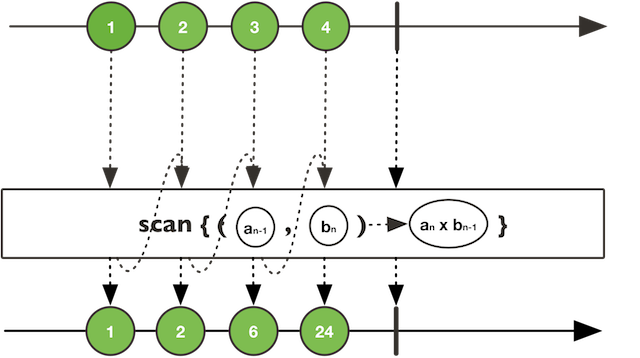
- Parameters:
accumulator- the accumulatingBiFunction- Returns:
- an accumulating
Flux
-
scan
public final <A> Flux<A> scan(A initial, BiFunction<A,? super T,A> accumulator)
Aggregate thisFluxvalues with the help of an accumulatorBiFunctionand emits the intermediate results.The accumulation works as follows:
result[0] = initialValue; result[1] = accumulator(result[0], source[0]) result[2] = accumulator(result[1], source[1]) result[3] = accumulator(result[2], source[2]) ...
- Type Parameters:
A- the accumulated type- Parameters:
initial- the initial argument to pass to the reduce functionaccumulator- the accumulatingBiFunction- Returns:
- an accumulating
Fluxstarting with initial state
-
scanWith
public final <A> Flux<A> scanWith(Supplier<A> initial, BiFunction<A,? super T,A> accumulator)
Aggregate thisFluxvalues with the help of an accumulatorBiFunctionand emits the intermediate results.The accumulation works as follows:
result[0] = initialValue; result[1] = accumulator(result[0], source[0]) result[2] = accumulator(result[1], source[1]) result[3] = accumulator(result[2], source[2]) ...
- Type Parameters:
A- the accumulated type- Parameters:
initial- the initial supplier to init the first value to pass to the reduce functionaccumulator- the accumulatingBiFunction- Returns:
- an accumulating
Fluxstarting with initial state
-
share
public final Flux<T> share()
Returns a newFluxthat multicasts (shares) the originalFlux. As long as there is at least oneSubscriberthisFluxwill be subscribed and emitting data. When all subscribers have cancelled it will cancel the sourceFlux.This is an alias for
publish().ConnectableFlux.refCount().
-
single
public final Mono<T> single()
Expect and emit a single item from thisFluxsource or signalNoSuchElementException(or a default generated value) for empty source,IndexOutOfBoundsExceptionfor a multi-item source.
- Returns:
- a
Monowith the eventual single item or an error signal
-
single
public final Mono<T> single(T defaultValue)
Expect and emit a single item from thisFluxsource or signalNoSuchElementException(or a default value) for empty source,IndexOutOfBoundsExceptionfor a multi-item source.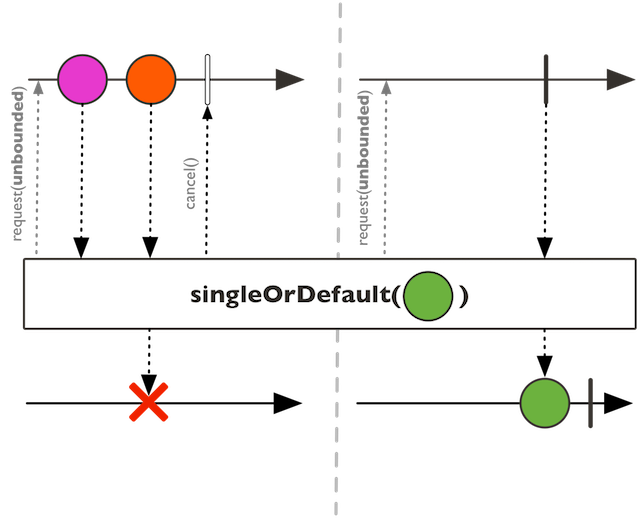
-
singleOrEmpty
public final Mono<T> singleOrEmpty()
Expect and emit a zero or single item from thisFluxsource orIndexOutOfBoundsExceptionfor a multi-item source.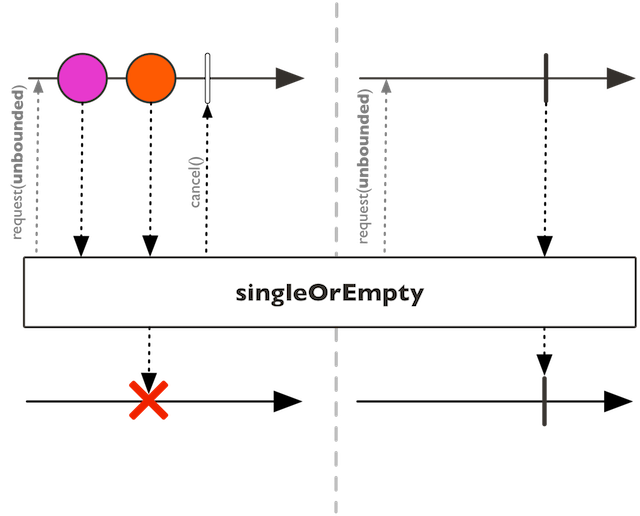
- Returns:
- a
Monowith the eventual single item or no item
-
skip
public final Flux<T> skip(long skipped)
Skip next the specified number of elements from thisFlux.
- Parameters:
skipped- the number of times to drop- Returns:
- a dropping
Fluxuntil the specified skipped number of elements
-
skip
public final Flux<T> skip(Duration timespan)
Skip elements from thisFluxfor the given time period.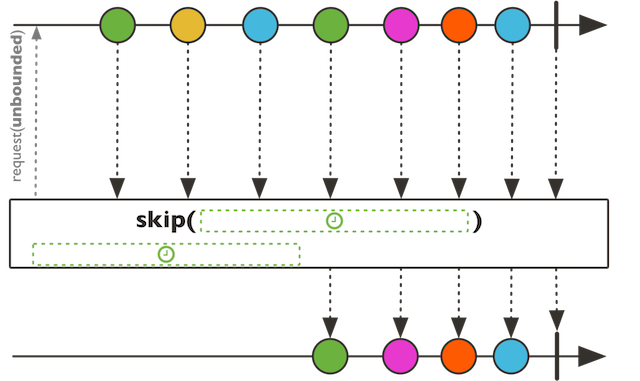
- Parameters:
timespan- the time window to exclude next signals- Returns:
- a dropping
Fluxuntil the end of the given timespan
-
skip
public final Flux<T> skip(Duration timespan, Scheduler timer)
Skip elements from thisFluxfor the given time period.
-
skipLast
public final Flux<T> skipLast(int n)
Skip the last specified number of elements from thisFlux.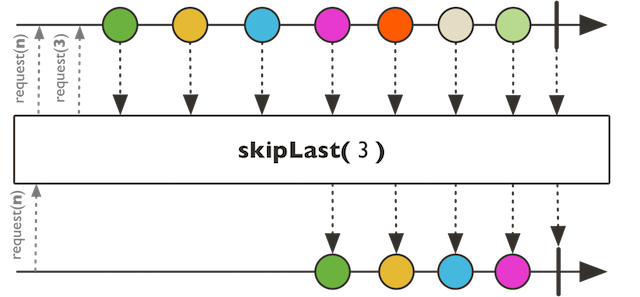
- Parameters:
n- the number of elements to ignore before completion- Returns:
- a dropping
Fluxfor the specified skipped number of elements before termination
-
skipMillis
@Deprecated public final Flux<T> skipMillis(long timespan)
Deprecated. use theDurationbased variants instead, will be removed in 3.1.0Skip elements from thisFluxfor the given time period.
- Parameters:
timespan- the time window to exclude next signals- Returns:
- a dropping
Fluxuntil the end of the given timespan
-
skipMillis
@Deprecated public final Flux<T> skipMillis(long timespan, TimedScheduler timer)
Deprecated. use theDurationbased variants instead, will be removed in 3.1.0Skip elements from thisFluxfor the given time period.
-
sort
public final Flux<T> sort()
Returns aFluxthat sorts the events emitted by sourceFlux. Each item emitted by theFluxmust implementComparablewith respect to all other items in the sequence.Note that calling
sortwith long, non-terminating or infinite sources might causeOutOfMemoryError. Use sequence splitting likewindow()to sort batches in that case.- Returns:
- a sorting
Flux - Throws:
ClassCastException- if any item emitted by theFluxdoes not implementComparablewith respect to all other items emitted by theFlux
-
sort
public final Flux<T> sort(Comparator<? super T> sortFunction)
Returns aFluxthat sorts the events emitted by sourceFluxgiven theComparatorfunction.Note that calling
sortedwith long, non-terminating or infinite sources might causeOutOfMemoryError
-
startWith
@SafeVarargs public final Flux<T> startWith(T... values)
Prepend the given values before thisFluxsequence.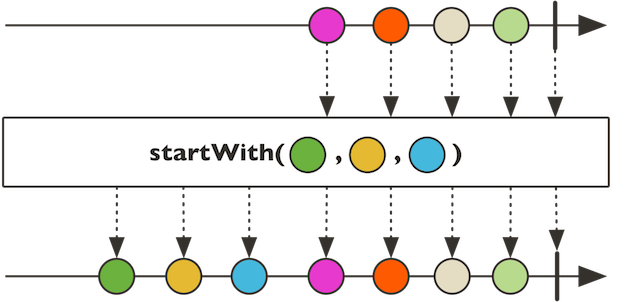
- Parameters:
values- the array of values to start with- Returns:
- a prefixed
Fluxwith given values
-
subscribe
public final Disposable subscribe()
Start the chain and request unbounded demand.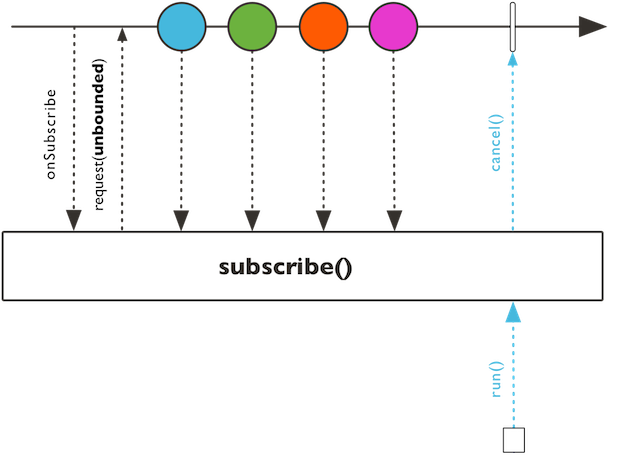
- Returns:
- a
Disposabletask to execute to dispose and cancel the underlyingSubscription
-
subscribe
@Deprecated public final Disposable subscribe(int prefetch)
Deprecated. uselimitRate(int)Start the chain and requestprefetchdemand
For a version that gives you more control over backpressure and the request, see
Publisher.subscribe(Subscriber)with aBaseSubscriber.- Parameters:
prefetch- an arbitrary value- Returns:
- a
Disposabletask to execute to dispose and cancel the underlyingSubscription
-
subscribe
public final Disposable subscribe(Consumer<? super T> consumer)
Subscribe aConsumerto thisFluxthat will consume all the sequence. It will request an unbounded demand.For a passive version that observe and forward incoming data see
doOnNext(java.util.function.Consumer).For a version that gives you more control over backpressure and the request, see
Publisher.subscribe(Subscriber)with aBaseSubscriber.
- Parameters:
consumer- the consumer to invoke on each value- Returns:
- a new
Disposableto dispose theSubscription
-
subscribe
@Deprecated public final Disposable subscribe(Consumer<? super T> consumer, int prefetch)
Deprecated. use limitRate + subscribe(Consumer)Subscribe aConsumerto thisFluxthat will consume all the sequence.If prefetch is
!= Long.MAX_VALUE, theSubscriberwill use it as a prefetch strategy: first request N, then when 25% of N is left to be received on onNext, request N x 0.75.For a passive version that observe and forward incoming data see
doOnNext(java.util.function.Consumer).For a version that gives you more control over backpressure and the request, see
Publisher.subscribe(Subscriber)with aBaseSubscriber.
- Parameters:
consumer- the consumer to invoke on each valueprefetch- the the prefetch amount, positive- Returns:
- a new
Disposableto dispose theSubscription
-
subscribe
public final Disposable subscribe(Consumer<? super T> consumer, Consumer<? super Throwable> errorConsumer)
SubscribeConsumerto thisFluxthat will consume all the sequence. It will request unbounded demandLong.MAX_VALUE. For a passive version that observe and forward incoming data seedoOnNext(java.util.function.Consumer)anddoOnError(java.util.function.Consumer).For a version that gives you more control over backpressure and the request, see
Publisher.subscribe(Subscriber)with aBaseSubscriber.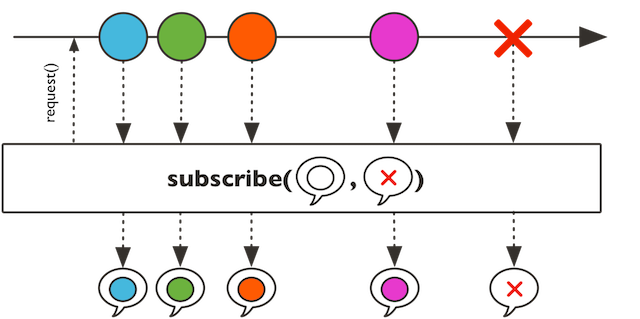
- Parameters:
consumer- the consumer to invoke on each next signalerrorConsumer- the consumer to invoke on error signal- Returns:
- a new
Disposableto dispose theSubscription
-
subscribe
public final Disposable subscribe(Consumer<? super T> consumer, Consumer<? super Throwable> errorConsumer, Runnable completeConsumer)
SubscribeConsumerto thisFluxthat will consume all the sequence. It will request unbounded demandLong.MAX_VALUE. For a passive version that observe and forward incoming data seedoOnNext(java.util.function.Consumer),doOnError(java.util.function.Consumer)anddoOnComplete(Runnable).For a version that gives you more control over backpressure and the request, see
Publisher.subscribe(Subscriber)with aBaseSubscriber.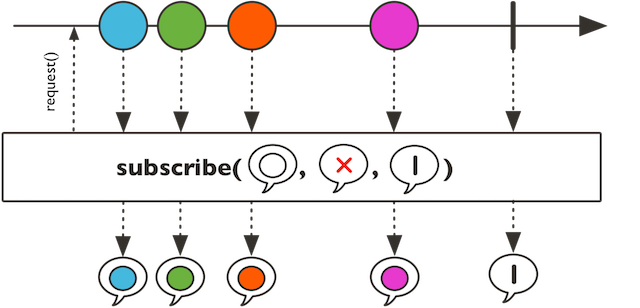
- Parameters:
consumer- the consumer to invoke on each valueerrorConsumer- the consumer to invoke on error signalcompleteConsumer- the consumer to invoke on complete signal- Returns:
- a new
Disposableto dispose theSubscription
-
subscribe
public final Disposable subscribe(Consumer<? super T> consumer, Consumer<? super Throwable> errorConsumer, Runnable completeConsumer, Consumer<? super Subscription> subscriptionConsumer)
SubscribeConsumerto thisFluxthat will consume all the sequence. It will let the providedsubscriptionConsumerrequest the adequate amount of data, or request unbounded demandLong.MAX_VALUEif no such consumer is provided.For a passive version that observe and forward incoming data see
doOnNext(java.util.function.Consumer),doOnError(java.util.function.Consumer),doOnComplete(Runnable)anddoOnSubscribe(Consumer).For a version that gives you more control over backpressure and the request, see
Publisher.subscribe(Subscriber)with aBaseSubscriber.
- Parameters:
consumer- the consumer to invoke on each valueerrorConsumer- the consumer to invoke on error signalcompleteConsumer- the consumer to invoke on complete signalsubscriptionConsumer- the consumer to invoke on subscribe signal, to be used for the initialrequest, or null for max request- Returns:
- a new
Disposableto dispose theSubscription
-
subscribe
@Deprecated public final Disposable subscribe(Consumer<? super T> consumer, Consumer<? super Throwable> errorConsumer, Runnable completeConsumer, int prefetch)
Deprecated. prefer usinglimitRate(prefetch).subscribe(...)tosubscribe(..., prefetch)SubscribeConsumerto thisFluxthat will consume all the sequence.If prefetch is
!= Long.MAX_VALUE, theSubscriberwill use it as a prefetch strategy: first request N, then when 25% of N is left to be received on onNext, request N x 0.75.For a passive version that observe and forward incoming data see
doOnNext(java.util.function.Consumer),doOnError(java.util.function.Consumer),doOnComplete(Runnable)anddoOnSubscribe(Consumer).For a version that gives you more control over backpressure and the request, see
Publisher.subscribe(Subscriber)with aBaseSubscriber.
- Parameters:
consumer- the consumer to invoke on each valueerrorConsumer- the consumer to invoke on error signalcompleteConsumer- the consumer to invoke on complete signalprefetch- the demand to produce to thisFlux- Returns:
- a new
Disposableto dispose theSubscription - See Also:
limitRate(int),subscribe(Consumer, Consumer, Runnable)
-
subscribe
@Deprecated public final Disposable subscribe(Consumer<? super T> consumer, Consumer<? super Throwable> errorConsumer, Runnable completeConsumer, Consumer<? super Subscription> subscriptionConsumer, int prefetch)
Deprecated. prefer usinglimitRate(prefetch).subscribe(...)tosubscribe(..., prefetch)SubscribeConsumerto thisFluxthat will consume all the sequence.If prefetch is
!= Long.MAX_VALUE, theSubscriberwill use it as a prefetch strategy: first request N, then when 25% of N is left to be received on onNext, request N x 0.75.For a passive version that observe and forward incoming data see
doOnNext(java.util.function.Consumer),doOnError(java.util.function.Consumer)anddoOnComplete(Runnable).For a version that gives you more control over backpressure and the request, see
Publisher.subscribe(Subscriber)with aBaseSubscriber.
- Parameters:
consumer- the consumer to invoke on each valueerrorConsumer- the consumer to invoke on error signalcompleteConsumer- the consumer to invoke on complete signalsubscriptionConsumer- the consumer to invoke on subscribe signal, to be used for the initialrequest, or null for max requestprefetch- the demand to produce to thisFlux(deprecated)- Returns:
- a new
Disposableto dispose theSubscription - See Also:
limitRate(int),subscribe(Consumer, Consumer, Runnable, Consumer)
-
subscribeOn
public final Flux<T> subscribeOn(Scheduler scheduler)
Run subscribe, onSubscribe and request on a suppliedScheduler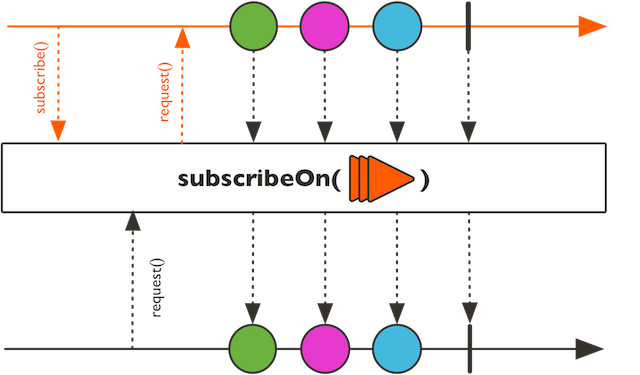
Typically used for slow publisher e.g., blocking IO, fast consumer(s) scenarios.
flux.subscribeOn(Schedulers.single()).subscribe()- Parameters:
scheduler- a checkedScheduler.Workerfactory- Returns:
- a
Fluxrequesting asynchronously
-
subscribeWith
public final <E extends Subscriber<? super T>> E subscribeWith(E subscriber)
A chainingPublisher.subscribe(Subscriber)alternative to inline composition type conversion to a hot emitter (e.g.FluxProcessororMonoProcessor).flux.subscribeWith(WorkQueueProcessor.create()).subscribe()If you need more control over backpressure and the request, use a
BaseSubscriber.- Type Parameters:
E- the reified type from the input/output subscriber- Parameters:
subscriber- theSubscriberto subscribe and return- Returns:
- the passed
Subscriber
-
switchIfEmpty
public final Flux<T> switchIfEmpty(Publisher<? extends T> alternate)
Provide an alternative if this sequence is completed without any data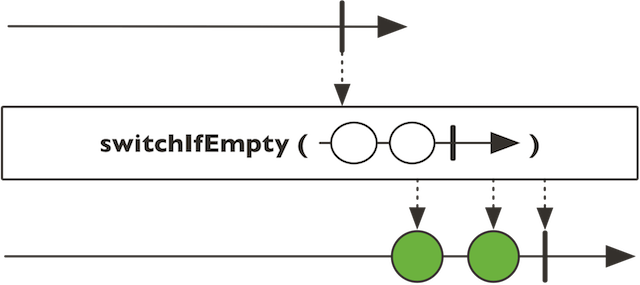
- Parameters:
alternate- the alternate publisher if this sequence is empty- Returns:
- an alternating
Fluxon source onComplete without elements
-
switchMap
public final <V> Flux<V> switchMap(Function<? super T,Publisher<? extends V>> fn)
- Type Parameters:
V- the type of the return value of the transformation function- Parameters:
fn- the transformation function- Returns:
- an alternating
Fluxon source onNext
-
switchMap
public final <V> Flux<V> switchMap(Function<? super T,Publisher<? extends V>> fn, int prefetch)
- Type Parameters:
V- the type of the return value of the transformation function- Parameters:
fn- the transformation functionprefetch- the produced demand for inner sources- Returns:
- an alternating
Fluxon source onNext
-
switchOnError
@Deprecated public final <E extends Throwable> Flux<T> switchOnError(Class<E> type, Publisher<? extends T> fallback)
Deprecated. useonErrorResume(java.util.function.Function<? super java.lang.Throwable, ? extends org.reactivestreams.Publisher<? extends T>>)with at -> fallbacklambda instead. Will be removed in 3.1.0.
-
switchOnError
@Deprecated public final Flux<T> switchOnError(Predicate<? super Throwable> predicate, Publisher<? extends T> fallback)
Deprecated. useonErrorResume(java.util.function.Function<? super java.lang.Throwable, ? extends org.reactivestreams.Publisher<? extends T>>)with at -> fallbacklambda instead. Will be removed in 3.1.0.
-
switchOnError
@Deprecated public final Flux<T> switchOnError(Publisher<? extends T> fallback)
Deprecated. useonErrorResume(java.util.function.Function<? super java.lang.Throwable, ? extends org.reactivestreams.Publisher<? extends T>>)with at -> fallbacklambda instead. Will be removed in 3.1.0.
-
take
public final Flux<T> take(long n)
Take only the first N values from thisFlux.
If N is zero, the
Subscribergets completed if thisFluxcompletes, signals an error or signals its first value (which is not not relayed though).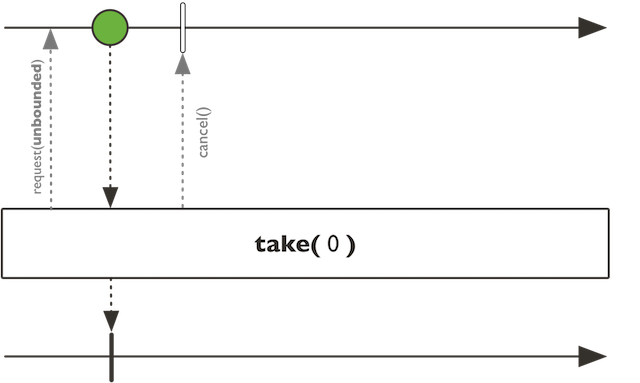
-
take
public final Flux<T> take(Duration timespan)
Relay values from thisFluxuntil the given time period elapses.If the time period is zero, the
Subscribergets completed if thisFluxcompletes, signals an error or signals its first value (which is not not relayed though).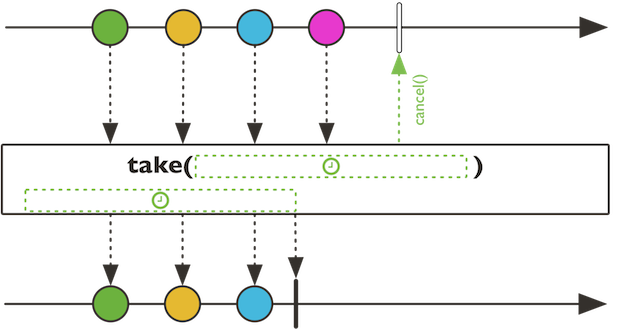
-
take
public final Flux<T> take(Duration timespan, Scheduler timer)
Relay values from thisFluxuntil the given time period elapses.If the time period is zero, the
Subscribergets completed if thisFluxcompletes, signals an error or signals its first value (which is not not relayed though).
-
takeLast
public final Flux<T> takeLast(int n)
Emit the last N values thisFluxemitted before its completion.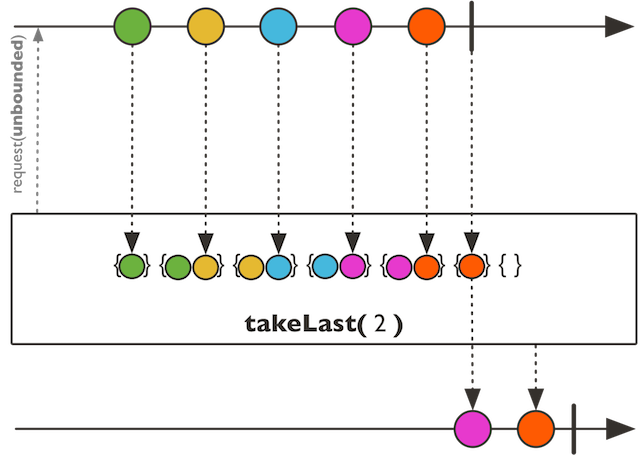
-
takeMillis
@Deprecated public final Flux<T> takeMillis(long timespan)
Deprecated. use theDurationbased variants instead, will be removed in 3.1.0Relay values from thisFluxuntil the given time period elapses.If the time period is zero, the
Subscribergets completed if thisFluxcompletes, signals an error or signals its first value (which is not not relayed though).
-
takeMillis
@Deprecated public final Flux<T> takeMillis(long timespan, TimedScheduler timer)
Deprecated. use theDurationbased variants instead, will be removed in 3.1.0Relay values from thisFluxuntil the given time period elapses.If the time period is zero, the
Subscribergets completed if thisFluxcompletes, signals an error or signals its first value (which is not not relayed though).
-
takeUntil
public final Flux<T> takeUntil(Predicate<? super T> predicate)
Relay values from thisFluxuntil the givenPredicatematches. UnliketakeWhile(java.util.function.Predicate<? super T>), this will include the matched data.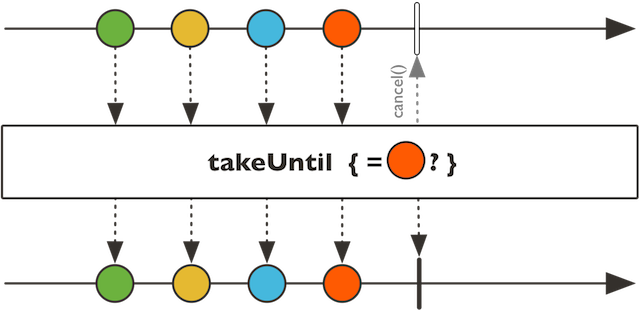
-
takeWhile
public final Flux<T> takeWhile(Predicate<? super T> continuePredicate)
Relay values while a predicate returns TRUE for the values (checked before each value is delivered). UnliketakeUntil(java.util.function.Predicate<? super T>), this will exclude the matched data.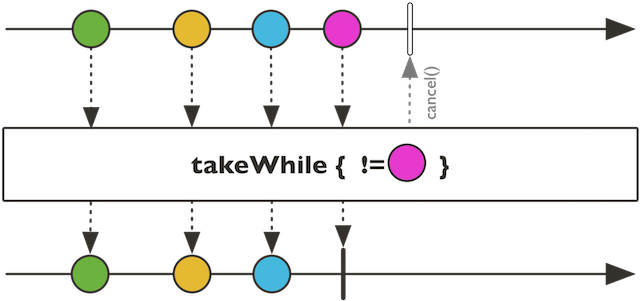
-
then
public final Mono<Void> then()
Return aMono<Void>that completes when thisFluxcompletes. This will actively ignore the sequence and only replay completion or error signals.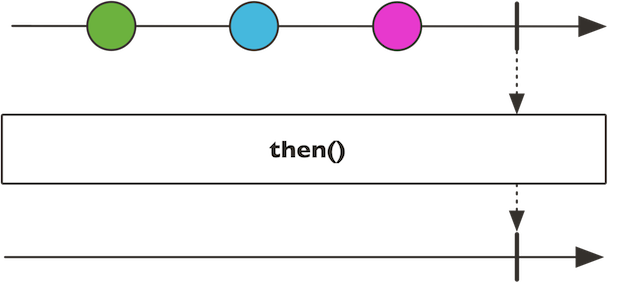
- Returns:
- a new
Mono
-
then
@Deprecated public final Mono<Void> then(Publisher<Void> other)
Deprecated. usethenEmpty(Publisher)instead, this alias will be removed in 3.1.0Return aMono<Void>that waits for thisFluxto complete then for a suppliedPublisher<Void>to also complete. The second completion signal is replayed, or any error signal that occurs instead.
-
then
@Deprecated public final Mono<Void> then(Supplier<? extends Publisher<Void>> afterSupplier)
Deprecated. removed in 3.1, usethenEmpty(Publisher)withdefer(java.util.function.Supplier<? extends org.reactivestreams.Publisher<T>>). The competing overload was causing confusion and the generic was not symmetric withMono.then(Mono).
-
thenEmpty
public final Mono<Void> thenEmpty(Publisher<Void> other)
Return aMono<Void>that waits for thisFluxto complete then for a suppliedPublisher<Void>to also complete. The second completion signal is replayed, or any error signal that occurs instead.
-
thenMany
@Deprecated public final <V> Flux<V> thenMany(Supplier<? extends Publisher<V>> afterSupplier)
Deprecated. removed in 3.1, usethenMany(Publisher)withdefer(java.util.function.Supplier<? extends org.reactivestreams.Publisher<T>>). The competing overload was called unnecessary by extended feedback and aligns with removing of Supplier of Publisher aliases elsewhere.
-
timeout
public final Flux<T> timeout(Duration timeout)
Signal aTimeoutExceptionin case a per-item period fires before the next item arrives from thisFlux.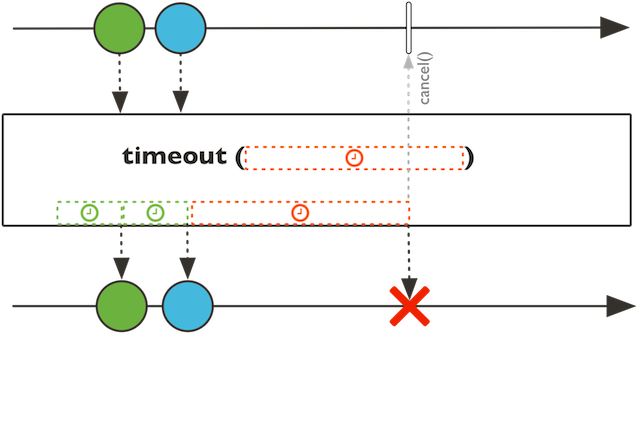
-
timeout
public final Flux<T> timeout(Duration timeout, Publisher<? extends T> fallback)
Switch to a fallbackPublisherin case a per-item period fires before the next item arrives from thisFlux.If the given
Publisheris null, signal aTimeoutException.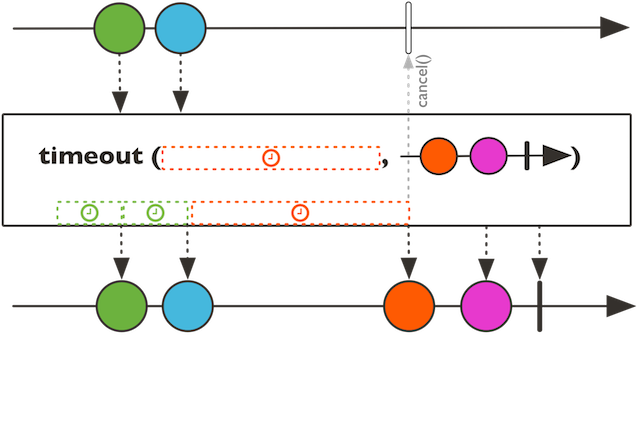
-
timeout
public final Flux<T> timeout(Duration timeout, Scheduler timer)
Signal aTimeoutExceptionerror in case a per-item period fires before the next item arrives from thisFlux.
-
timeout
public final Flux<T> timeout(Duration timeout, Publisher<? extends T> fallback, Scheduler timer)
Switch to a fallbackPublisherin case a per-item period fires before the next item arrives from thisFlux.If the given
Publisheris null, signal aTimeoutException.
-
timeout
public final <U> Flux<T> timeout(Publisher<U> firstTimeout)
Signal aTimeoutExceptionin case a first item from thisFluxhas not been emitted before the givenPublisheremits.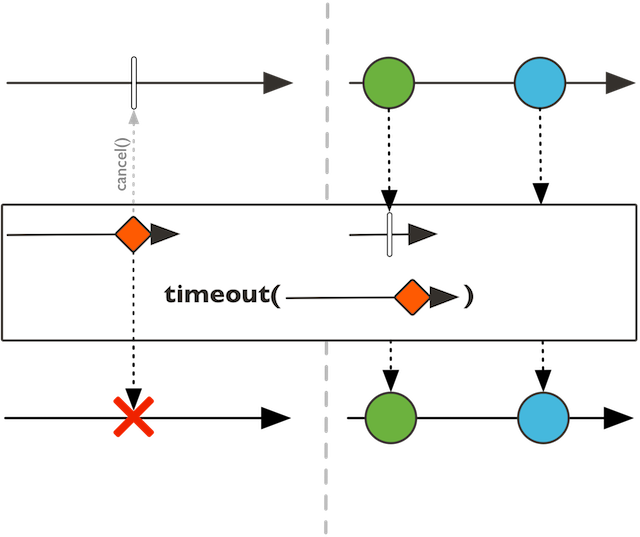
-
timeout
public final <U,V> Flux<T> timeout(Publisher<U> firstTimeout, Function<? super T,? extends Publisher<V>> nextTimeoutFactory)
Signal aTimeoutExceptionin case a first item from thisFluxhas not been emitted before the givenPublisheremits. The following items will be individually timed via the factory providedPublisher.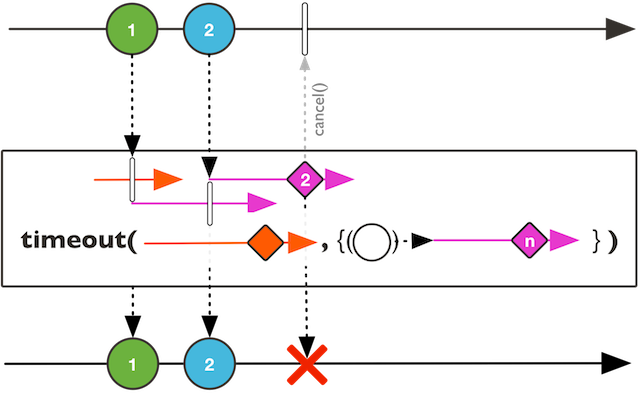
- Type Parameters:
U- the type of the elements of the first timeout PublisherV- the type of the elements of the subsequent timeout Publishers- Parameters:
firstTimeout- the timeoutPublisherthat must not emit before the first signal from thisFluxnextTimeoutFactory- the timeoutPublisherfactory for each next item- Returns:
- a first then per-item expirable
Flux
-
timeout
public final <U,V> Flux<T> timeout(Publisher<U> firstTimeout, Function<? super T,? extends Publisher<V>> nextTimeoutFactory, Publisher<? extends T> fallback)
Switch to a fallbackPublisherin case a first item from thisFluxhas not been emitted before the givenPublisheremits. The following items will be individually timed via the factory providedPublisher.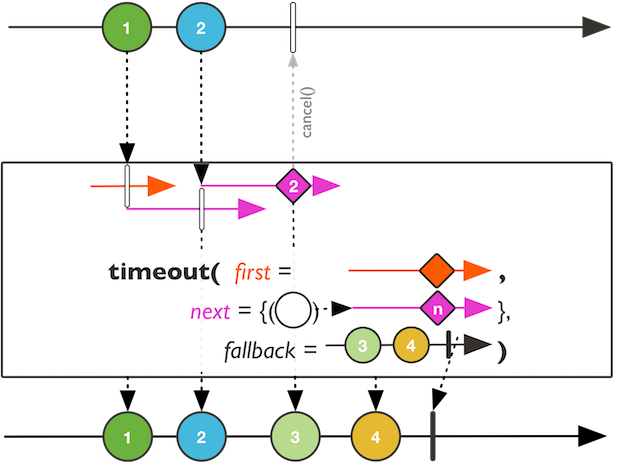
- Type Parameters:
U- the type of the elements of the first timeout PublisherV- the type of the elements of the subsequent timeout Publishers- Parameters:
firstTimeout- the timeoutPublisherthat must not emit before the first signal from thisFluxnextTimeoutFactory- the timeoutPublisherfactory for each next itemfallback- the fallbackPublisherto subscribe when a timeout occurs- Returns:
- a first then per-item expirable
Fluxwith a fallbackPublisher
-
timeoutMillis
@Deprecated public final Flux<T> timeoutMillis(long timeout)
Deprecated. use theDurationbased variants instead, will be removed in 3.1.0Signal aTimeoutExceptionerror in case a per-item period in milliseconds fires before the next item arrives from thisFlux.
-
timeoutMillis
@Deprecated public final Flux<T> timeoutMillis(long timeout, TimedScheduler timer)
Deprecated. use theDurationbased variants instead, will be removed in 3.1.0Signal aTimeoutExceptionerror in case a per-item period in milliseconds fires before the next item arrives from thisFlux.
-
timeoutMillis
@Deprecated public final Flux<T> timeoutMillis(long timeout, Publisher<? extends T> fallback)
Deprecated. use theDurationbased variants instead, will be removed in 3.1.0Switch to a fallbackPublisherin case a per-item period fires before the next item arrives from thisFlux.If the given
Publisheris null, signal aTimeoutException.
-
timeoutMillis
@Deprecated public final Flux<T> timeoutMillis(long timeout, Publisher<? extends T> fallback, TimedScheduler timer)
Deprecated. use theDurationbased variants instead, will be removed in 3.1.0Switch to a fallbackPublisherin case a per-item period fires before the next item arrives from thisFlux.If the given
Publisheris null, signal aTimeoutException.
-
timestamp
public final Flux<Tuple2<Long,T>> timestamp()
Emit aTuple2pair of T1Longcurrent system time in millis and T2Tassociated data for each item from thisFlux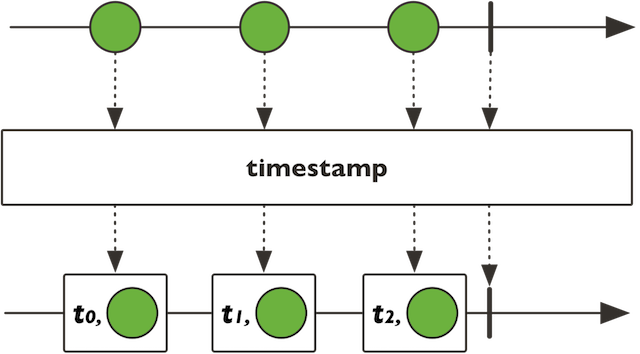
- Returns:
- a timestamped
Flux
-
timestamp
@Deprecated public final Flux<Tuple2<Long,T>> timestamp(TimedScheduler scheduler)
Deprecated. usetimestamp(Scheduler)
-
toStream
public Stream<T> toStream()
- Returns:
- a
Streamof unknown size with onClose attached toSubscription.cancel()
-
toStream
public Stream<T> toStream(int batchSize)
- Parameters:
batchSize- the bounded capacity to produce to thisFluxorInteger.MAX_VALUEfor unbounded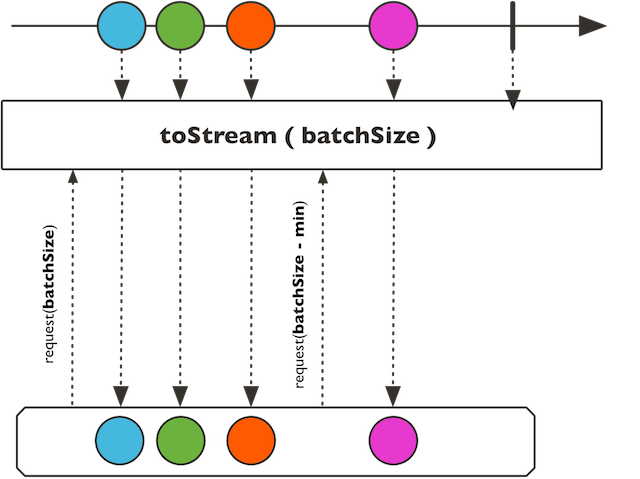
- Returns:
- a
Streamof unknown size with onClose attached toSubscription.cancel()
-
transform
public final <V> Flux<V> transform(Function<? super Flux<T>,? extends Publisher<V>> transformer)
Transform thisFluxin order to generate a targetFlux. Unlikecompose(Function), the provided function is executed as part of assembly.Function<Flux, Flux> applySchedulers = flux -> flux.subscribeOn(Schedulers.elastic()).publishOn(Schedulers.parallel()); flux.transform(applySchedulers).map(v -> v * v).subscribe()- Type Parameters:
V- the item type in the returnedFlux- Parameters:
transformer- theFunctionto immediately map thisFluxinto a targetFluxinstance.- Returns:
- a new
Flux - See Also:
for deferred composition of {@link Flux} for each {@link Subscriber},for a loose conversion to an arbitrary type
-
window
@Deprecated public final Flux<Flux<T>> window()
Deprecated. will be removed in 3.1.0. Prefer using other variants, likewindow(Publisher),
-
window
@Deprecated public final <U,V> Flux<Flux<T>> window(Publisher<U> bucketOpening, Function<? super U,? extends Publisher<V>> closeSelector)
Deprecated. will be removed in 3.1.0. UsewindowWhen(Publisher, Function)instead.Split thisFluxsequence into potentially overlapping windows controlled by items of a startPublisherand endPublisherderived from the start values.When Open signal is strictly not overlapping Close signal : dropping windows
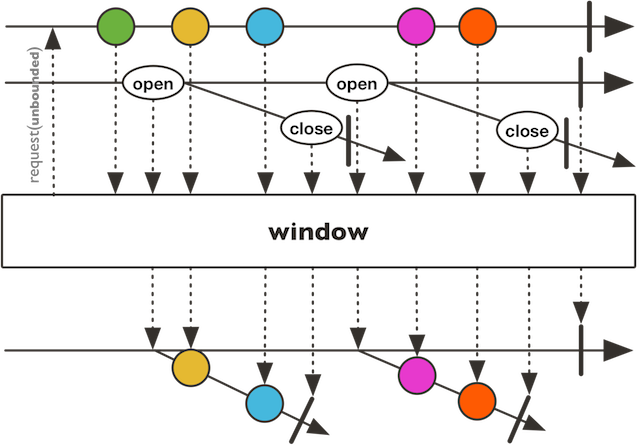
When Open signal is strictly more frequent than Close signal : overlapping windows
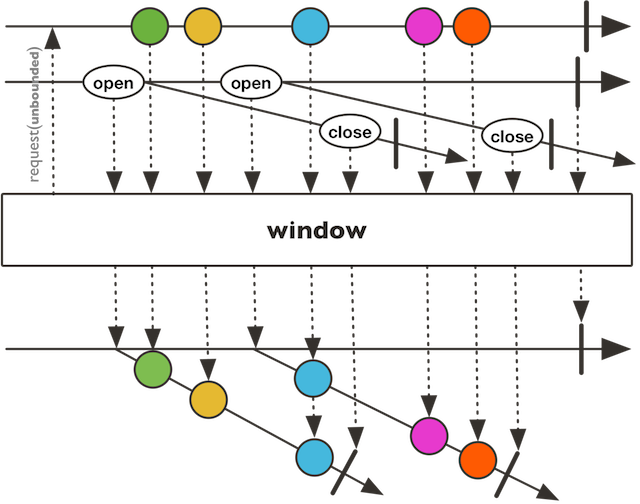
When Open signal is exactly coordinated with Close signal : exact windows
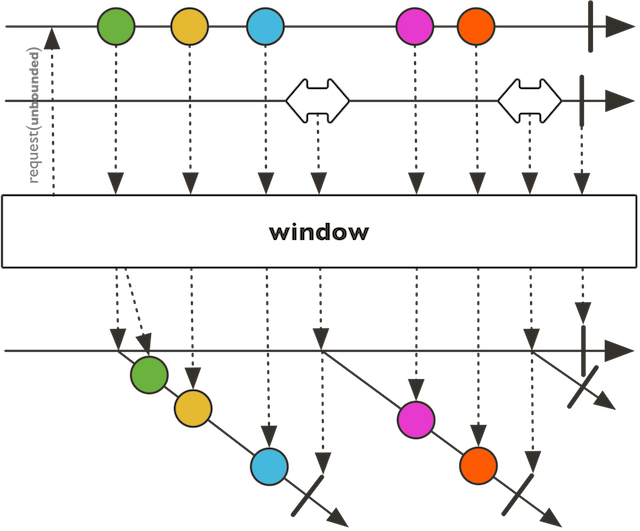
- Type Parameters:
U- the type of the sequence opening windowsV- the type of the sequence closing windows opened by the bucketOpening Publisher's elements- Parameters:
bucketOpening- aPublisherto emit any item for a split signal and complete to terminatecloseSelector- aFunctiongiven an opening signal and returning aPublisherthat emits to complete the window- Returns:
- a windowing
Fluxdelimiting its sub-sequences by a givenPublisherand lasting until a selectedPublisheremits
-
window
public final Flux<Flux<T>> window(Duration timespan)
Split thisFluxsequence into continuous, non-overlapping windows delimited by a given period.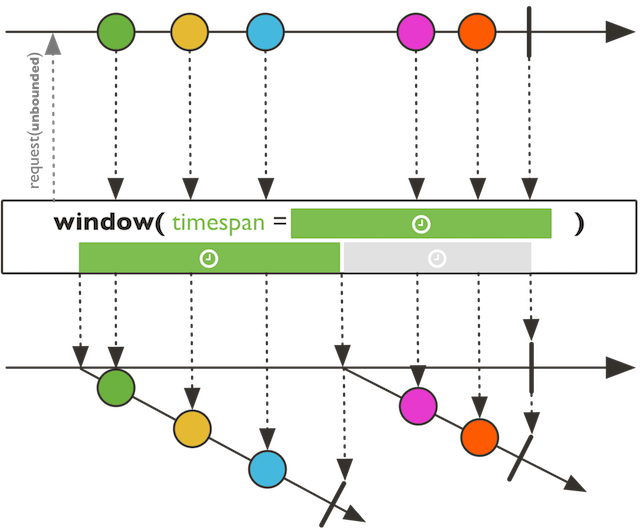
-
window
public final Flux<Flux<T>> window(Duration timespan, Duration timeshift)
Split thisFluxsequence into multipleFluxdelimited by the giventimeshiftperiod, starting from the first item. EachFluxbucket will onComplete aftertimespanperiod has elpased.When timeshift > timespan : dropping windows
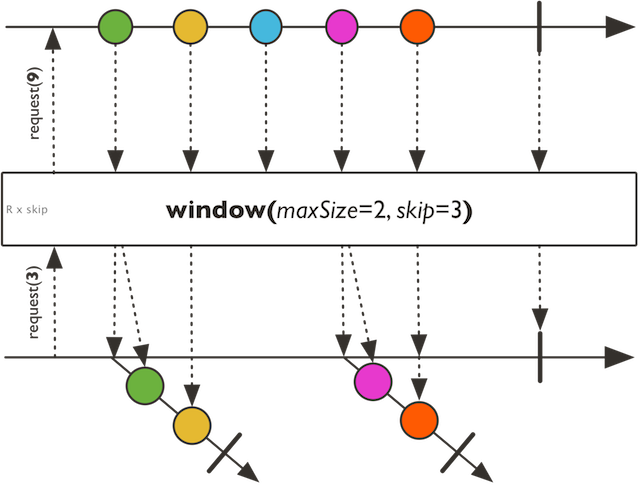
When timeshift < timespan : overlapping windows
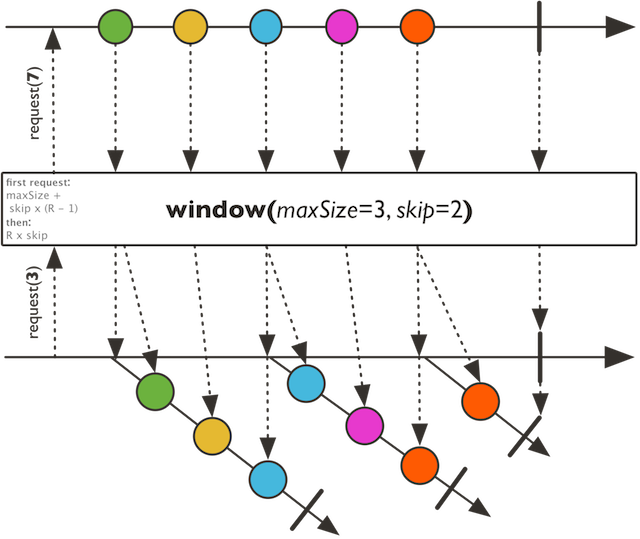
When timeshift == timespan : exact windows
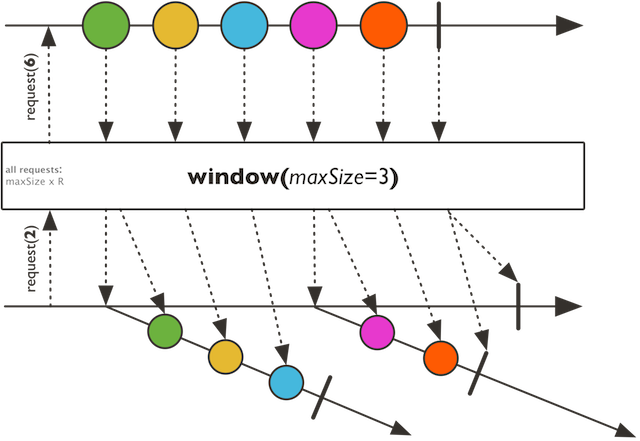
-
window
public final Flux<Flux<T>> window(Duration timespan, Scheduler timer)
Split thisFluxsequence into continuous, non-overlapping windows delimited by a given period.
-
window
public final Flux<Flux<T>> window(Duration timespan, Duration timeshift, Scheduler timer)
Split thisFluxsequence into multipleFluxdelimited by the giventimeshiftperiod, starting from the first item. EachFluxbucket will onComplete aftertimespanperiod has elapsed.When timeshift > timespan : dropping windows

When timeshift < timespan : overlapping windows

When timeshift == timespan : exact windows

-
window
@Deprecated public final Flux<Flux<T>> window(int maxSize, Duration timespan)
Deprecated. usewindowTimeout(int, Duration)instead, will be removed in 3.1.0
-
windowTimeout
public final Flux<Flux<T>> windowTimeout(int maxSize, Duration timespan, Scheduler timer)
-
windowMillis
@Deprecated public final Flux<Flux<T>> windowMillis(long timespan)
Deprecated. use theDurationbased variants instead, will be removed in 3.1.0Split thisFluxsequence into continuous, non-overlapping windows delimited by a given period.
-
windowMillis
@Deprecated public final Flux<Flux<T>> windowMillis(long timespan, TimedScheduler timer)
Deprecated. use theDurationbased variants instead, will be removed in 3.1.0Split thisFluxsequence into continuous, non-overlapping windows delimited by a given period.
-
windowMillis
@Deprecated public final Flux<Flux<T>> windowMillis(long timespan, long timeshift, TimedScheduler timer)
Deprecated. use theDurationbased variants instead, will be removed in 3.1.0Split thisFluxsequence into multipleFluxdelimited by the giventimeshiftperiod, starting from the first item. EachFluxbucket will onComplete aftertimespanperiod has elapsed.When timeshift > timespan : dropping windows

When timeshift < timespan : overlapping windows

When timeshift == timespan : exact windows

- Parameters:
timespan- the maximumFluxwindow duration in millisecondstimeshift- the period of time in milliseconds to create newFluxwindowstimer- a time-capableSchedulerinstance to run on- Returns:
- a windowing
FluxofFluxbuckets delimited by an openingPublisherand a selected closingPublisher
-
windowMillis
@Deprecated public final Flux<Flux<T>> windowMillis(int maxSize, long timespan)
Deprecated. usewindowTimeout(int, Duration)instead, will be removed in 3.1.0
-
windowMillis
@Deprecated public final Flux<Flux<T>> windowMillis(int maxSize, long timespan, TimedScheduler timer)
Deprecated. usewindowTimeout(int, Duration, Scheduler)instead, will be removed in 3.1.0
-
windowTimeoutMillis
@Deprecated public final Flux<Flux<T>> windowTimeoutMillis(int maxSize, long timespan)
Deprecated. use theDurationbased variants instead, will be removed in 3.1.0
-
windowTimeoutMillis
@Deprecated public final Flux<Flux<T>> windowTimeoutMillis(int maxSize, long timespan, TimedScheduler timer)
Deprecated. use theDurationbased variants instead, will be removed in 3.1.0
-
windowUntil
public final Flux<GroupedFlux<T,T>> windowUntil(Predicate<T> boundaryTrigger)
Split thisFluxsequence into multipleFluxdelimited by the given predicate. A new window is opened each time the predicate returns true, at which point the previous window will receive the triggering element then onComplete.
- Parameters:
boundaryTrigger- a predicate that triggers the next window when it becomes true.- Returns:
- a windowing
FluxofGroupedFluxwindows, bounded depending on the predicate and keyed with the value that triggered the new window.
-
windowUntil
public final Flux<GroupedFlux<T,T>> windowUntil(Predicate<T> boundaryTrigger, boolean cutBefore)
Split thisFluxsequence into multipleFluxdelimited by the given predicate. A new window is opened each time the predicate returns true.If
cutBeforeis true, the old window will onComplete and the triggering element will be emitted in the new window. Note it can mean that an empty window is sometimes emitted, eg. if the first element in the sequence immediately matches the predicate.Otherwise, the triggering element will be emitted in the old window before it does onComplete, similar to
windowUntil(Predicate).
- Parameters:
boundaryTrigger- a predicate that triggers the next window when it becomes true.cutBefore- set to true to include the triggering element in the new window rather than the old.- Returns:
- a windowing
FluxofGroupedFluxwindows, bounded depending on the predicate and keyed with the value that triggered the new window.
-
windowUntil
public final Flux<GroupedFlux<T,T>> windowUntil(Predicate<T> boundaryTrigger, boolean cutBefore, int prefetch)
Split thisFluxsequence into multipleFluxdelimited by the given predicate and using a prefetch. A new window is opened each time the predicate returns true.If
cutBeforeis true, the old window will onComplete and the triggering element will be emitted in the new window. Note it can mean that an empty window is sometimes emitted, eg. if the first element in the sequence immediately matches the predicate.Otherwise, the triggering element will be emitted in the old window before it does onComplete, similar to
windowUntil(Predicate).
- Parameters:
boundaryTrigger- a predicate that triggers the next window when it becomes true.cutBefore- set to true to include the triggering element in the new window rather than the old.prefetch- the request size to use for thisFlux.- Returns:
- a windowing
FluxofGroupedFluxwindows, bounded depending on the predicate and keyed with the value that triggered the new window.
-
windowWhile
public final Flux<GroupedFlux<T,T>> windowWhile(Predicate<T> inclusionPredicate)
Split thisFluxsequence into multipleFluxwindows that stay open while a given predicate matches the source elements. Once the predicate returns false, the window closes with an onComplete and the triggering element is discarded.Note that for a sequence starting with a separator, or having several subsequent separators anywhere in the sequence, each occurrence will lead to an empty window.

- Parameters:
inclusionPredicate- a predicate that triggers the next window when it becomes false.- Returns:
- a windowing
FluxofGroupedFluxwindows, each containing subsequent elements that all passed a predicate, and keyed with a separator element.
-
windowWhile
public final Flux<GroupedFlux<T,T>> windowWhile(Predicate<T> inclusionPredicate, int prefetch)
Split thisFluxsequence into multipleFluxwindows that stay open while a given predicate matches the source elements. Once the predicate returns false, the window closes with an onComplete and the triggering element is discarded.Note that for a sequence starting with a separator, or having several subsequent separators anywhere in the sequence, each occurrence will lead to an empty window.

- Parameters:
inclusionPredicate- a predicate that triggers the next window when it becomes false.prefetch- the request size to use for thisFlux.- Returns:
- a windowing
FluxofGroupedFluxwindows, each containing subsequent elements that all passed a predicate, and keyed with a separator element.
-
windowWhen
public final <U,V> Flux<Flux<T>> windowWhen(Publisher<U> bucketOpening, Function<? super U,? extends Publisher<V>> closeSelector)
Split thisFluxsequence into potentially overlapping windows controlled by items of a startPublisherand endPublisherderived from the start values.When Open signal is strictly not overlapping Close signal : dropping windows

When Open signal is strictly more frequent than Close signal : overlapping windows

When Open signal is exactly coordinated with Close signal : exact windows

- Type Parameters:
U- the type of the sequence opening windowsV- the type of the sequence closing windows opened by the bucketOpening Publisher's elements- Parameters:
bucketOpening- aPublisherto emit any item for a split signal and complete to terminatecloseSelector- aFunctiongiven an opening signal and returning aPublisherthat emits to complete the window- Returns:
- a windowing
Fluxdelimiting its sub-sequences by a givenPublisherand lasting until a selectedPublisheremits
-
withLatestFrom
public final <U,R> Flux<R> withLatestFrom(Publisher<? extends U> other, BiFunction<? super T,? super U,? extends R> resultSelector)
Combine values from thisFluxwith values from anotherPublisherthrough aBiFunctionand emits the result.The operator will drop values from this
Fluxuntil the otherPublisherproduces any value.If the other
Publishercompletes without any value, the sequence is completed.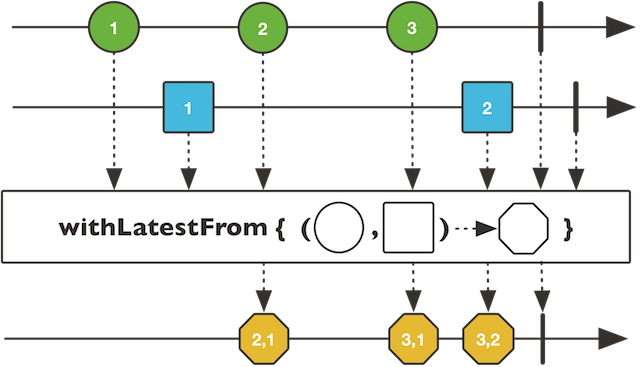
- Type Parameters:
U- the otherPublishersequence typeR- the result type- Parameters:
other- thePublisherto combine withresultSelector- the bi-function called with each pair of source and other elements that should return a single value to be emitted- Returns:
- a combined
Fluxgated by anotherPublisher
-
zipWith
public final <T2> Flux<Tuple2<T,T2>> zipWith(Publisher<? extends T2> source2)
"Step-Merge" especially useful in Scatter-Gather scenarios. The operator will forward all combinations of the most recent items emitted by each source until any of them completes. Errors will immediately be forwarded.
-
zipWith
public final <T2,V> Flux<V> zipWith(Publisher<? extends T2> source2, BiFunction<? super T,? super T2,? extends V> combinator)
"Step-Merge" especially useful in Scatter-Gather scenarios. The operator will forward all combinations produced by the passed combinator from the most recent items emitted by each source until any of them completes. Errors will immediately be forwarded.
- Type Parameters:
T2- type of the value from source2V- The produced output after transformation by the combinator- Parameters:
source2- The second upstreamPublisherto subscribe to.combinator- The aggregate function that will receive a unique value from each upstream and return the value to signal downstream- Returns:
- a zipped
Flux
-
zipWith
public final <T2,V> Flux<V> zipWith(Publisher<? extends T2> source2, int prefetch, BiFunction<? super T,? super T2,? extends V> combinator)
"Step-Merge" especially useful in Scatter-Gather scenarios. The operator will forward all combinations produced by the passed combinator from the most recent items emitted by each source until any of them completes. Errors will immediately be forwarded.
- Type Parameters:
T2- type of the value from source2V- The produced output after transformation by the combinator- Parameters:
source2- The second upstreamPublisherto subscribe to.prefetch- the request size to use for thisFluxand the otherPublishercombinator- The aggregate function that will receive a unique value from each upstream and return the value to signal downstream- Returns:
- a zipped
Flux
-
zipWith
public final <T2> Flux<Tuple2<T,T2>> zipWith(Publisher<? extends T2> source2, int prefetch)
"Step-Merge" especially useful in Scatter-Gather scenarios. The operator will forward all combinations of the most recent items emitted by each source until any of them completes. Errors will immediately be forwarded.
-
zipWithIterable
public final <T2> Flux<Tuple2<T,T2>> zipWithIterable(Iterable<? extends T2> iterable)
-
zipWithIterable
public final <T2,V> Flux<V> zipWithIterable(Iterable<? extends T2> iterable, BiFunction<? super T,? super T2,? extends V> zipper)
- Type Parameters:
T2- the value type of the other iterable sequenceV- the result type- Parameters:
iterable- theIterableto pair withzipper- theBiFunctioncombinator- Returns:
- a zipped
Flux
-
onAssembly
protected static <T> Flux<T> onAssembly(Flux<T> source)
- Type Parameters:
T- the value type- Parameters:
source- the source to wrap- Returns:
- the potentially wrapped source
-
onAssembly
protected static <T> ConnectableFlux<T> onAssembly(ConnectableFlux<T> source)
- Type Parameters:
T- the value type- Parameters:
source- the source to wrap- Returns:
- the potentially wrapped source
-
-
